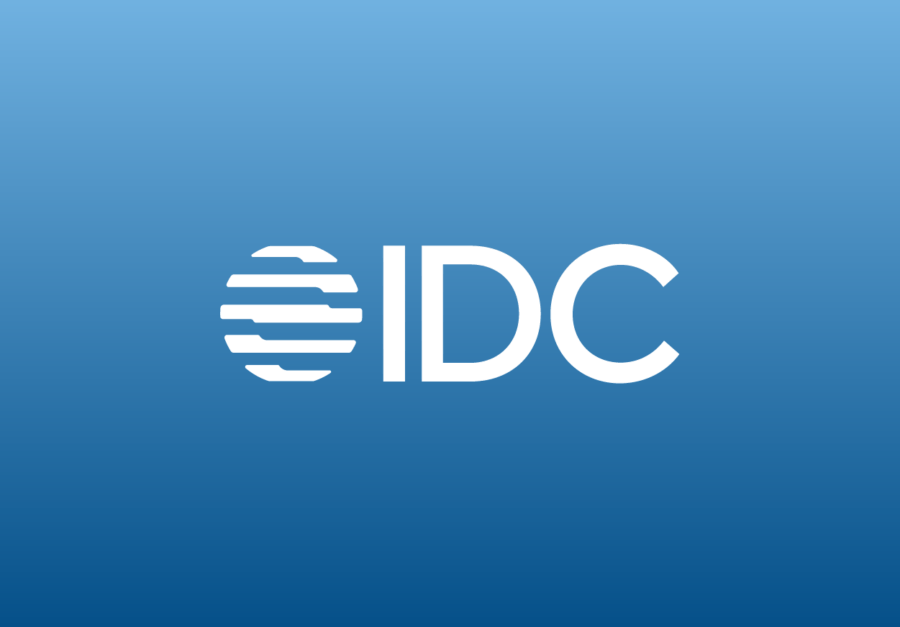Resources

Webinars
SVB: A Warning of Financial Resilience
Silicon Valley Bank’s collapse is a warning for CFOs and finance leaders who are not able to offer immediate, real-time questions on impacts to their balance sheets, income statements and cash flow.

-
Filter by type
-
Filter by products
-
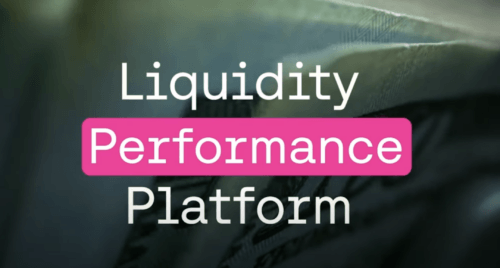 Success Stories, VideosBreak Free from Liquidity GridlockOur clients will tell you, they love Kyriba. Organizations from many industries and of various sizes have embraced Kyriba for real-time cash visibility, increased operational efficiency, and all enterprise liquidity management needs.Read the success story
Success Stories, VideosBreak Free from Liquidity GridlockOur clients will tell you, they love Kyriba. Organizations from many industries and of various sizes have embraced Kyriba for real-time cash visibility, increased operational efficiency, and all enterprise liquidity management needs.Read the success story -
 VideosElevate Your Forecasting CapabilitiesIn the complex world of global finance, managing liquidity can feel like an uphill battle. Without complete data and automation, navigating a web of banking relationships becomes daunting.Watch the video
VideosElevate Your Forecasting CapabilitiesIn the complex world of global finance, managing liquidity can feel like an uphill battle. Without complete data and automation, navigating a web of banking relationships becomes daunting.Watch the video -
 VideosEmpowering Global Bank Connectivity, Unleashing PotentialFind out how Kyriba’s global bank connectivity solution can help you break free from fragmented data, siloed systems, and disconnected workflows.Watch the video
VideosEmpowering Global Bank Connectivity, Unleashing PotentialFind out how Kyriba’s global bank connectivity solution can help you break free from fragmented data, siloed systems, and disconnected workflows.Watch the video -
 VideosData Security in an Age of UncertaintyIn the complex world of global finance, managing liquidity can feel like an uphill battle. Without complete data and automation, navigating a web of banking relationships becomes daunting.Watch the video
VideosData Security in an Age of UncertaintyIn the complex world of global finance, managing liquidity can feel like an uphill battle. Without complete data and automation, navigating a web of banking relationships becomes daunting.Watch the video -
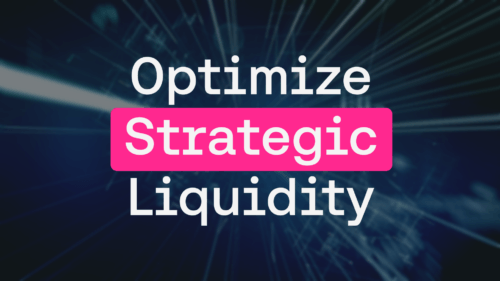 VideosOptimize Liquidity with KyribaIn the complex world of global finance, managing liquidity can feel like an uphill battle. Without complete data and automation, navigating a web of banking relationships becomes daunting.Watch the video
VideosOptimize Liquidity with KyribaIn the complex world of global finance, managing liquidity can feel like an uphill battle. Without complete data and automation, navigating a web of banking relationships becomes daunting.Watch the video -
 WebinarsManaging FX Risk In Complicated Market ConditionsAre you ready to navigate the complexities of FX risk in today's uncertain market conditions? Join us for an insightful webinar hosted by Andy Gage, SVP of FX Sales and Advisory Services at Kyriba. Dive deep into the strategies and tools essential for finance professionals in 2024. Don't miss this opportunity to gain expert insights and practical solutions tailored to today's financial landscape.View Recording
WebinarsManaging FX Risk In Complicated Market ConditionsAre you ready to navigate the complexities of FX risk in today's uncertain market conditions? Join us for an insightful webinar hosted by Andy Gage, SVP of FX Sales and Advisory Services at Kyriba. Dive deep into the strategies and tools essential for finance professionals in 2024. Don't miss this opportunity to gain expert insights and practical solutions tailored to today's financial landscape.View Recording -
 WebinarsElevating Working Capital: Strategy for Growth and Resilience in Uncertain TimesIn this dynamic era, where market conditions evolve and opportunities for growth emerge, Kyriba is excited to offer a concise webinar aimed at equipping your business with the insights and tools needed to enhance your working capital.View Recording
WebinarsElevating Working Capital: Strategy for Growth and Resilience in Uncertain TimesIn this dynamic era, where market conditions evolve and opportunities for growth emerge, Kyriba is excited to offer a concise webinar aimed at equipping your business with the insights and tools needed to enhance your working capital.View Recording -
 Fact SheetsKyriba Open Formats StudioThe Kyriba Open Formats Studio (OFS) offers a complete set of self-service tools to quickly implement, test and deploy payment formats within the Kyriba Payment Hub.Read the fact sheet
Fact SheetsKyriba Open Formats StudioThe Kyriba Open Formats Studio (OFS) offers a complete set of self-service tools to quickly implement, test and deploy payment formats within the Kyriba Payment Hub.Read the fact sheet -
 WebinarsNavigating the Financial Horizon: Mastering Forecasting & Liquidity PlanningWednesday, March 06, 2024 | 12 PM CET | Join us on-demand for an exclusive Kyriba Webinar. Dive into the art and science of financial forecasting and liquidity planning in today's volatile market.View Recording
WebinarsNavigating the Financial Horizon: Mastering Forecasting & Liquidity PlanningWednesday, March 06, 2024 | 12 PM CET | Join us on-demand for an exclusive Kyriba Webinar. Dive into the art and science of financial forecasting and liquidity planning in today's volatile market.View Recording -
 Fact SheetsKyriba Open Reports StudioKyriba Open Reports Studio is a powerful Excel add-in that seamlessly integrates with the Kyriba application via Kyriba APIs to empower finance professionals in treasury, accounting and other functions to take control of their data.Read the fact sheet
Fact SheetsKyriba Open Reports StudioKyriba Open Reports Studio is a powerful Excel add-in that seamlessly integrates with the Kyriba application via Kyriba APIs to empower finance professionals in treasury, accounting and other functions to take control of their data.Read the fact sheet -
 Success StoriesWorld Vision Revolutionizes Treasury Processes to Maximize Global ImpactsAs a global Christian relief, development, and advocacy organization World Vision helps children, families, and communities overcome poverty and injustice, irrespective of religion, race, ethnicity, or gender.Read the success story
Success StoriesWorld Vision Revolutionizes Treasury Processes to Maximize Global ImpactsAs a global Christian relief, development, and advocacy organization World Vision helps children, families, and communities overcome poverty and injustice, irrespective of religion, race, ethnicity, or gender.Read the success story -
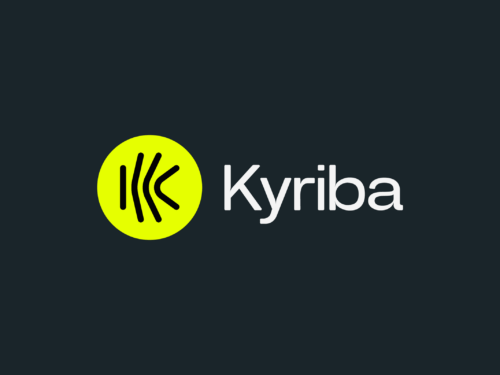 Success Stories, VideosFrom our Clients: Why We Love KyribaOur clients will tell you, they love Kyriba. Organizations from many industries and of various sizes have embraced Kyriba for real-time cash visibility, increased operational efficiency, and all enterprise liquidity management needs.Read the success story
Success Stories, VideosFrom our Clients: Why We Love KyribaOur clients will tell you, they love Kyriba. Organizations from many industries and of various sizes have embraced Kyriba for real-time cash visibility, increased operational efficiency, and all enterprise liquidity management needs.Read the success story -
 Research, Currency Impact ReportsKyriba’s February 2024 Currency Impact ReportThe February 2024 Kyriba Currency Impact Report analyzes the reported effects of currencies on North American and European companies during Q3/23.Read the Report
Research, Currency Impact ReportsKyriba’s February 2024 Currency Impact ReportThe February 2024 Kyriba Currency Impact Report analyzes the reported effects of currencies on North American and European companies during Q3/23.Read the Report -
 Success StoriesTreasury System Integration Leads Primoris Towards M&A SuccessAlexion works to transform the lives of people affected by rare diseases and devastating conditions by continuously innovating to push the boundaries of medicine, technology, and healthcare services.Read the success story
Success StoriesTreasury System Integration Leads Primoris Towards M&A SuccessAlexion works to transform the lives of people affected by rare diseases and devastating conditions by continuously innovating to push the boundaries of medicine, technology, and healthcare services.Read the success story -
 Success StoriesKuala Lumpur Kepong Berhad (KLK) Revolutionises Treasury Management Processes with KyribaKuala Lumpur Kepong Berhad (“KLK”) started as a plantation company in 1906 and until today, the development of oil palm and rubber remains the Group’s core business. KLK presently has about 300,000 hectares of planted area (97% oil palm). Our land bank is spread across Malaysia (Peninsular and Sabah), Indonesia (Belitung Island, Sumatra, as well as Kalimantan) and Liberia.Read the success story
Success StoriesKuala Lumpur Kepong Berhad (KLK) Revolutionises Treasury Management Processes with KyribaKuala Lumpur Kepong Berhad (“KLK”) started as a plantation company in 1906 and until today, the development of oil palm and rubber remains the Group’s core business. KLK presently has about 300,000 hectares of planted area (97% oil palm). Our land bank is spread across Malaysia (Peninsular and Sabah), Indonesia (Belitung Island, Sumatra, as well as Kalimantan) and Liberia.Read the success story -
 WebinarsAPAC 2024 Treasury TrendsTuesday, February 27, 2024 | 12:30 pm SGT | As 2024 begins, significant disruptions are evident, marked by ongoing conflicts in Europe and the Middle East, and central banks raising borrowing costs.View Recording
WebinarsAPAC 2024 Treasury TrendsTuesday, February 27, 2024 | 12:30 pm SGT | As 2024 begins, significant disruptions are evident, marked by ongoing conflicts in Europe and the Middle East, and central banks raising borrowing costs.View Recording -
 Success StoriesExpanding Alexion’s Forecasting HorizonIn the pursuit of transforming the lives of people affected by rare diseases and devastating conditions, Alexion stands at the forefront of innovation, ceaselessly pushing the boundaries of medicine, technology, and healthcare services.Read the success story
Success StoriesExpanding Alexion’s Forecasting HorizonIn the pursuit of transforming the lives of people affected by rare diseases and devastating conditions, Alexion stands at the forefront of innovation, ceaselessly pushing the boundaries of medicine, technology, and healthcare services.Read the success story -
 WebinarsNavigating Tomorrow: Insights for Treasurers in 2024 & BeyondThursday, February 15, 2024 | 2 PM GMT | In this exclusive webinar, we take a look into the challenges and opportunities that lie ahead for treasurers in these complex times.View Recording
WebinarsNavigating Tomorrow: Insights for Treasurers in 2024 & BeyondThursday, February 15, 2024 | 2 PM GMT | In this exclusive webinar, we take a look into the challenges and opportunities that lie ahead for treasurers in these complex times.View Recording -
 WebinarsTop 5 Treasury Practices That Will Change Your 2024Tuesday, February 27, 2024 | 2 PM EST | In this webinar, hear from Kyriba clients what their transformation priorities are – and what practices they are implementing this year.View Recording
WebinarsTop 5 Treasury Practices That Will Change Your 2024Tuesday, February 27, 2024 | 2 PM EST | In this webinar, hear from Kyriba clients what their transformation priorities are – and what practices they are implementing this year.View Recording -
 Success StoriesTreasury Technology Breakthroughs with Clearsulting PartnershipClearsulting’s partnership with Kyriba offers a comprehensive suite of services designed to elevate your treasury function.Read the success story
Success StoriesTreasury Technology Breakthroughs with Clearsulting PartnershipClearsulting’s partnership with Kyriba offers a comprehensive suite of services designed to elevate your treasury function.Read the success story -
 Webinars2024 Cash Forecasting EssentialsThursday, January 25, 2024 | 1 PM EST | Find out everything you need to know about perfecting your cash forecasting in 2024 as a treasurer.View Recording
Webinars2024 Cash Forecasting EssentialsThursday, January 25, 2024 | 1 PM EST | Find out everything you need to know about perfecting your cash forecasting in 2024 as a treasurer.View Recording -
 Research, Currency Impact ReportsKyriba’s November 2023 Currency Impact ReportThe November 2023 Kyriba Currency Impact Report analyzes the reported effects of currencies on North American and European companies during Q2/23.Read the Report
Research, Currency Impact ReportsKyriba’s November 2023 Currency Impact ReportThe November 2023 Kyriba Currency Impact Report analyzes the reported effects of currencies on North American and European companies during Q2/23.Read the Report -
 Webinars2024 Treasury Trends2023 is coming to a close with notable upheaval. Significant wars continue in Europe and the Middle East; central banks have increased borrowing costs to the highest rate in well over a decade; inflation has pulled back from the peak but remains above targets; borrowing costs and access to capital have tightened; FX risks remain elevated; and many CFOs are exhibiting increased caution.View Recording
Webinars2024 Treasury Trends2023 is coming to a close with notable upheaval. Significant wars continue in Europe and the Middle East; central banks have increased borrowing costs to the highest rate in well over a decade; inflation has pulled back from the peak but remains above targets; borrowing costs and access to capital have tightened; FX risks remain elevated; and many CFOs are exhibiting increased caution.View Recording -
 Fact SheetsKyriba API Integration for Microsoft Dynamics 365Kyriba’s API integration for Microsoft Dynamics 365 (D365) accelerates payments and bank connectivity projects, eliminates project risk and drastically reduces connectivity costs. The Kyriba D365 integration centralizes payment activity, fully manages bank connectivity and delivers superior fraud detection and visibility. It also provides a full suite of out-of-the-box ERP workflows for cash management, GL reconciliation, GL export, FX balance sheet and bank statement export.Read the fact sheet
Fact SheetsKyriba API Integration for Microsoft Dynamics 365Kyriba’s API integration for Microsoft Dynamics 365 (D365) accelerates payments and bank connectivity projects, eliminates project risk and drastically reduces connectivity costs. The Kyriba D365 integration centralizes payment activity, fully manages bank connectivity and delivers superior fraud detection and visibility. It also provides a full suite of out-of-the-box ERP workflows for cash management, GL reconciliation, GL export, FX balance sheet and bank statement export.Read the fact sheet -
 Success StoriesKeyloop Drives Forward with Automated TreasuryWithin the vast auto retail landscape, Keyloop stands out, delivering software solutions to 16,000 dealer sites and serving most automotive manufacturers in over 90 countries. Yet, like many industry leaders, Keyloop confronted operational challenges. Specifically, their treasury team grappled with manual tasks that limited efficiency and potential growth, highlighting the need for an automated treasury management solution.Read the success story
Success StoriesKeyloop Drives Forward with Automated TreasuryWithin the vast auto retail landscape, Keyloop stands out, delivering software solutions to 16,000 dealer sites and serving most automotive manufacturers in over 90 countries. Yet, like many industry leaders, Keyloop confronted operational challenges. Specifically, their treasury team grappled with manual tasks that limited efficiency and potential growth, highlighting the need for an automated treasury management solution.Read the success story -
 Fact SheetsKyriba Working Capital White Label Solutions for Financial InstitutionsNow more than ever, CFOs and senior finance leaders are turning to working capital solutions to optimize liquidity and generate free cash flow. With the demand continuing to grow, so do the market options.Read the fact sheet
Fact SheetsKyriba Working Capital White Label Solutions for Financial InstitutionsNow more than ever, CFOs and senior finance leaders are turning to working capital solutions to optimize liquidity and generate free cash flow. With the demand continuing to grow, so do the market options.Read the fact sheet -
 Success StoriesNVA, FAH and Oracle Cerner: Treasury Success with Elire and KyribaElire, in synergy with Kyriba, is redefining financial process optimization. With a legacy spanning over 18 years, Elire has spearheaded treasury transformation projects, offering cutting-edge tools. As a Kyriba Platinum Plus Partner, Elire amplifies the essence of modern treasury.Read the success story
Success StoriesNVA, FAH and Oracle Cerner: Treasury Success with Elire and KyribaElire, in synergy with Kyriba, is redefining financial process optimization. With a legacy spanning over 18 years, Elire has spearheaded treasury transformation projects, offering cutting-edge tools. As a Kyriba Platinum Plus Partner, Elire amplifies the essence of modern treasury.Read the success story -
 Success StoriesHow Varsity Brands Achieved >90% Forecasting AccuracyVarsity Brands faced numerous challenges in its treasury processes, such as limited cash visibility, disjointed cash flow forecasts and a patchwork of manual processes. Recognizing these challenges, Varsity Brands selected Kyriba to redefine and optimize their treasury operations for the future.Read the success story
Success StoriesHow Varsity Brands Achieved >90% Forecasting AccuracyVarsity Brands faced numerous challenges in its treasury processes, such as limited cash visibility, disjointed cash flow forecasts and a patchwork of manual processes. Recognizing these challenges, Varsity Brands selected Kyriba to redefine and optimize their treasury operations for the future.Read the success story -
 WebinarsThe Future of Forecasting: How to Meet the CFOs ObjectivesCFOs no longer need a cash forecast…they need more! CFOs are under immense pressure to meet free cash flow targets, especially in a high-interest-rate environment, where every decision matters. That’s why real-time, actionable insights have become the lifeline for proactive liquidity management across the enterprise.View Recording
WebinarsThe Future of Forecasting: How to Meet the CFOs ObjectivesCFOs no longer need a cash forecast…they need more! CFOs are under immense pressure to meet free cash flow targets, especially in a high-interest-rate environment, where every decision matters. That’s why real-time, actionable insights have become the lifeline for proactive liquidity management across the enterprise.View Recording -
 WebinarsBeyond Cash Forecasting: Rethinking LiquidityAs a companion to the newly released Executive Guide on “Rethinking Liquidity Planning to Manage the Cash Lifecycle”, this webinar will focus on how Liquidity planning differs from cash forecasting.View Recording
WebinarsBeyond Cash Forecasting: Rethinking LiquidityAs a companion to the newly released Executive Guide on “Rethinking Liquidity Planning to Manage the Cash Lifecycle”, this webinar will focus on how Liquidity planning differs from cash forecasting.View Recording -
 WebinarsThe Liquidity Pulse – How Recent Geopolitical Upheavals Impact Risk and Working CapitalIn today's interconnected world, geopolitical events can send shockwaves through global businesses, profoundly affecting their risk profiles and working capital. Join us for this edition of "The Liquidity Pulse" series as we bring together industry experts to dissect the real business implications of recent geopolitical upheavals and discuss potential solutions.View Recording
WebinarsThe Liquidity Pulse – How Recent Geopolitical Upheavals Impact Risk and Working CapitalIn today's interconnected world, geopolitical events can send shockwaves through global businesses, profoundly affecting their risk profiles and working capital. Join us for this edition of "The Liquidity Pulse" series as we bring together industry experts to dissect the real business implications of recent geopolitical upheavals and discuss potential solutions.View Recording -
 FAQsWhat is SEPA Payment?What is SEPA Payment? What Are the Different SEPA Schemes? How Kyriba Supports SEPA Payments?Read More
FAQsWhat is SEPA Payment?What is SEPA Payment? What Are the Different SEPA Schemes? How Kyriba Supports SEPA Payments?Read More -
 eBooks, Thought LeadershipExecutive Insights: Managing FX Risk Under Daily vs. Single RateThis Executive Insights ebook covers the key differentiators between Daily and Single rate.Read the eBook
eBooks, Thought LeadershipExecutive Insights: Managing FX Risk Under Daily vs. Single RateThis Executive Insights ebook covers the key differentiators between Daily and Single rate.Read the eBook -
 WebinarsAPIs Unleashed: Everything You Need to Know About APIs for Treasury and PaymentsIn this session, Celent’s embedded finance and API research leader and Kyriba will demystify APIs, talk about their value for payments, intra-day liquidity, ERP integration, fraud detection, reporting, data analysis, and so much more.View Recording
WebinarsAPIs Unleashed: Everything You Need to Know About APIs for Treasury and PaymentsIn this session, Celent’s embedded finance and API research leader and Kyriba will demystify APIs, talk about their value for payments, intra-day liquidity, ERP integration, fraud detection, reporting, data analysis, and so much more.View Recording -
 Fact SheetsKyriba Oracle Cloud API IntegrationKyriba’s Connectivity-as-a-Service (CaaS) accelerates the process of connecting your ERP systems to your banking partners, relieving potential development and maintenance burdens on IT. With one API gateway, clients can connect via Kyriba to over 1,000 global banks, supported by an extensive format library of 50,000 pre-developed and pre-tested payment scenarios.Read the fact sheet
Fact SheetsKyriba Oracle Cloud API IntegrationKyriba’s Connectivity-as-a-Service (CaaS) accelerates the process of connecting your ERP systems to your banking partners, relieving potential development and maintenance burdens on IT. With one API gateway, clients can connect via Kyriba to over 1,000 global banks, supported by an extensive format library of 50,000 pre-developed and pre-tested payment scenarios.Read the fact sheet -
 eBooks, Thought LeadershipCFOs Guide to Reducing the Risk of FraudBusiness Email Compromise BEC scams, in which fraudsters send emails to employees pretending to be the CFO or CEO, are becoming increasingly common. Other attacks prey on weak user authentication procedures to gain access to essential systems.Read the eBook
eBooks, Thought LeadershipCFOs Guide to Reducing the Risk of FraudBusiness Email Compromise BEC scams, in which fraudsters send emails to employees pretending to be the CFO or CEO, are becoming increasingly common. Other attacks prey on weak user authentication procedures to gain access to essential systems.Read the eBook -
 eBooks, Thought LeadershipAFP Executive Guide: Rethinking Liquidity Planning to Manage the Cash LifecycleWith the use of APIs, artificial intelligence (AI) and data analytics, cash forecasting is evolving into a more proactive liquidity planning process. Kyriba is proud to be a supporter of the AFP Executive Guide...Read the eBook
eBooks, Thought LeadershipAFP Executive Guide: Rethinking Liquidity Planning to Manage the Cash LifecycleWith the use of APIs, artificial intelligence (AI) and data analytics, cash forecasting is evolving into a more proactive liquidity planning process. Kyriba is proud to be a supporter of the AFP Executive Guide...Read the eBook -
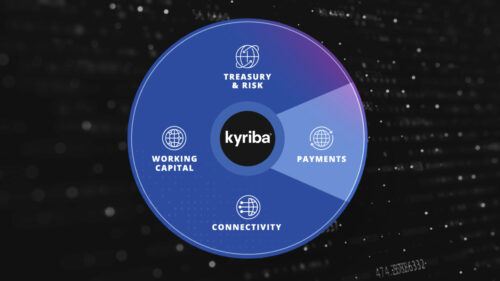 VideosKyriba Payments: Streamlining Your Payments Process with Security and EfficiencyAs the world’s most connected enterprise liquidity management platform, Kyriba offers unparalleled cloud-based SaaS solutions via Connectivity-as-a-Service (CaaS).Watch the video
VideosKyriba Payments: Streamlining Your Payments Process with Security and EfficiencyAs the world’s most connected enterprise liquidity management platform, Kyriba offers unparalleled cloud-based SaaS solutions via Connectivity-as-a-Service (CaaS).Watch the video -
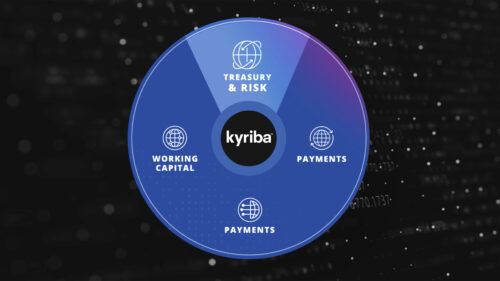 VideosKyriba Risk Management: Three Steps to Reduce VolatilityKyriba’s Risk Management minimizes the effects of market fluctuations on revenue, earnings and balance sheets.Watch the video
VideosKyriba Risk Management: Three Steps to Reduce VolatilityKyriba’s Risk Management minimizes the effects of market fluctuations on revenue, earnings and balance sheets.Watch the video -
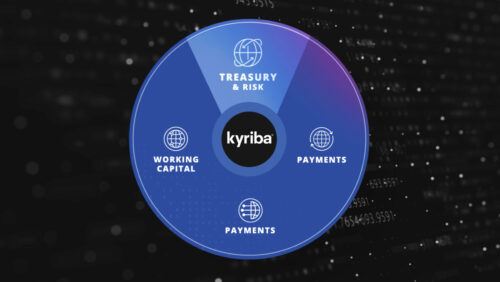 VideosKyriba’s Integrated Treasury SolutionsWatch this Kyriba Treasury product video to learn how Kyriba’s treasury management solutions can enhance your treasury operations.Watch the video
VideosKyriba’s Integrated Treasury SolutionsWatch this Kyriba Treasury product video to learn how Kyriba’s treasury management solutions can enhance your treasury operations.Watch the video -
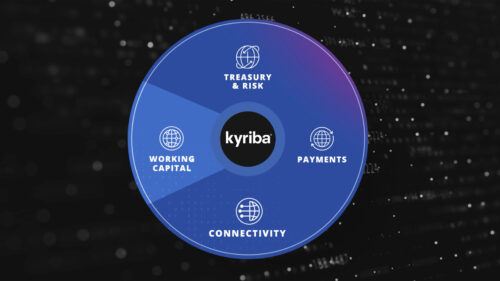 VideosKyriba Working Capital: Empowering CFOs to Unlock LiquidityWatch this Kyriba Working Capital product video to learn how Kyriba's Working Capital solutions empower CFOs to unlock liquidityWatch the video
VideosKyriba Working Capital: Empowering CFOs to Unlock LiquidityWatch this Kyriba Working Capital product video to learn how Kyriba's Working Capital solutions empower CFOs to unlock liquidityWatch the video -
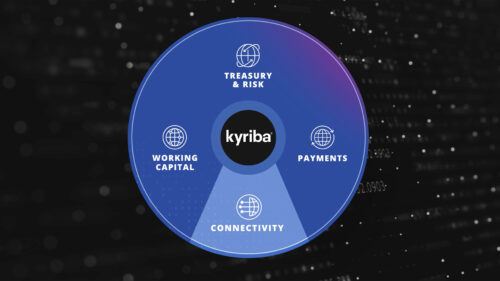 VideosKyriba Connectivity-as-a-Service: Accelerate Your ERP Bank ConnectivityAs the world’s most connected enterprise liquidity management platform, Kyriba offers unparalleled cloud-based SaaS solutions via Connectivity-as-a-Service (CaaS).Watch the video
VideosKyriba Connectivity-as-a-Service: Accelerate Your ERP Bank ConnectivityAs the world’s most connected enterprise liquidity management platform, Kyriba offers unparalleled cloud-based SaaS solutions via Connectivity-as-a-Service (CaaS).Watch the video -
 FAQsWhat are Bank Reporting and Payment Formats?Bank reporting and payment formats exchange payment instructions and reporting information between banks and their clients.Read More
FAQsWhat are Bank Reporting and Payment Formats?Bank reporting and payment formats exchange payment instructions and reporting information between banks and their clients.Read More -
 WebinarsNavigating the Future: Bank Connectivity, Cloud Migration, and Instant PaymentsJoin Deloitte and Kyriba to learn about the future of payments. Discover important topics to show where the market is likely headed so you can better understand and navigate the changes ahead.View Recording
WebinarsNavigating the Future: Bank Connectivity, Cloud Migration, and Instant PaymentsJoin Deloitte and Kyriba to learn about the future of payments. Discover important topics to show where the market is likely headed so you can better understand and navigate the changes ahead.View Recording -
 eBooks, Thought LeadershipFive Payment Catastrophes to AvoidA Kyriba Guide to Corporate Payment Workflows An efficient and secure corporate payment workflow is the backbone of a successful modern enterprise. Every financial transaction – from routine supplier payments to critical intercontinental transfers...Read the eBook
eBooks, Thought LeadershipFive Payment Catastrophes to AvoidA Kyriba Guide to Corporate Payment Workflows An efficient and secure corporate payment workflow is the backbone of a successful modern enterprise. Every financial transaction – from routine supplier payments to critical intercontinental transfers...Read the eBook -
 Thought Leadership, eBooksPioneering Real-time Global Banking ConnectivityBank API Best Practices for Bank Partners For two decades, Kyriba has forged a reputation as the industry's frontrunner in corporate-to-bank Connectivity-as-a-Service. With robust integrations with 1000+ global banks, Kyriba is the world's most...Learn more
Thought Leadership, eBooksPioneering Real-time Global Banking ConnectivityBank API Best Practices for Bank Partners For two decades, Kyriba has forged a reputation as the industry's frontrunner in corporate-to-bank Connectivity-as-a-Service. With robust integrations with 1000+ global banks, Kyriba is the world's most...Learn more -
 WebinarsThe Liquidity Pulse – Headlines That Impact The Lifeblood of BusinessAre you ready to stay ahead of the curve in the ever-evolving world of finance? In the fast-paced world of finance, staying informed is crucial. Join us for The Liquidity Pulse, where industry experts...View Recording
WebinarsThe Liquidity Pulse – Headlines That Impact The Lifeblood of BusinessAre you ready to stay ahead of the curve in the ever-evolving world of finance? In the fast-paced world of finance, staying informed is crucial. Join us for The Liquidity Pulse, where industry experts...View Recording -
 Success StoriesCondé Nast’s Transformation Overhauls Liquidity, Bank Relationships and Treasury TechCondé Nast’s (CN) treasury team identified several challenges in its effort to support the company build a new global organisational structure. Like the need to improve inefficient payment processes around inconsistent processing across markets and low levels of automation.Read the success story
Success StoriesCondé Nast’s Transformation Overhauls Liquidity, Bank Relationships and Treasury TechCondé Nast’s (CN) treasury team identified several challenges in its effort to support the company build a new global organisational structure. Like the need to improve inefficient payment processes around inconsistent processing across markets and low levels of automation.Read the success story -
 Success StoriesClearsulting Partnership Elevates Treasury AgilityClearsulting’s partnership with Kyriba offers a comprehensive suite of services designed to elevate your treasury function. Through meticulous analysis, Clearsulting identifies pain points and inefficiencies within your organization’s current treasury operations and paves the way for tailored enhancements and streamlined processes. The collaboration isn’t just about treasury technology implementation; it’s about embracing Kyriba as a catalyst for change.Read the success story
Success StoriesClearsulting Partnership Elevates Treasury AgilityClearsulting’s partnership with Kyriba offers a comprehensive suite of services designed to elevate your treasury function. Through meticulous analysis, Clearsulting identifies pain points and inefficiencies within your organization’s current treasury operations and paves the way for tailored enhancements and streamlined processes. The collaboration isn’t just about treasury technology implementation; it’s about embracing Kyriba as a catalyst for change.Read the success story -
 Success StoriesBally’s Leverage APIs and Cloud to Deliver SolutionHighly Commended Winner Best Emerging Technology Solution The Challenge One of Bally’s key providers of payment services is FreemarketFX with a connectivity strategy that mandates use of a REST API for statement reporting and...Read the success story
Success StoriesBally’s Leverage APIs and Cloud to Deliver SolutionHighly Commended Winner Best Emerging Technology Solution The Challenge One of Bally’s key providers of payment services is FreemarketFX with a connectivity strategy that mandates use of a REST API for statement reporting and...Read the success story -
 Success StoriesAmazon ‘Thinks Big’ with Machine Learning Forecasting SolutionOverall Winner Best Cash Flow Forecasting Solution The Challenge Think Big is a key leadership principle at Amazon, and the team knows how important it is to manage its capital structure efficiently at scale....Read the success story
Success StoriesAmazon ‘Thinks Big’ with Machine Learning Forecasting SolutionOverall Winner Best Cash Flow Forecasting Solution The Challenge Think Big is a key leadership principle at Amazon, and the team knows how important it is to manage its capital structure efficiently at scale....Read the success story -
 Success StoriesViatris Addressed a Complex FX Environment with an Impressive Technology SolutionOverall Winner Best Foreign Exchange Solution The Challenge Following its formation, the company faced a complex FX environment. FX risk management was performed separately at legacy Mylan and legacy Upjohn entities with each process...Read the success story
Success StoriesViatris Addressed a Complex FX Environment with an Impressive Technology SolutionOverall Winner Best Foreign Exchange Solution The Challenge Following its formation, the company faced a complex FX environment. FX risk management was performed separately at legacy Mylan and legacy Upjohn entities with each process...Read the success story -
 Fact Sheets, Mid-Market ResourcesKyriba NetSuite API IntegrationKyriba’s Connectivity-as-a-Service (CaaS) accelerates this process and relieves potential development and maintenance burdens on IT. With one API gateway, clients can connect via Kyriba to over 1,000 global banks, supported by an extensive format library of 50,000 pre-developed and pre-tested payment scenarios.Read the fact sheet
Fact Sheets, Mid-Market ResourcesKyriba NetSuite API IntegrationKyriba’s Connectivity-as-a-Service (CaaS) accelerates this process and relieves potential development and maintenance burdens on IT. With one API gateway, clients can connect via Kyriba to over 1,000 global banks, supported by an extensive format library of 50,000 pre-developed and pre-tested payment scenarios.Read the fact sheet -
 WebinarsRecession ahead? Impact on Corporate Liquidity from the Student Debt UnfreezeThink your business is safe from the effects of lifting the student loan payment pause? Think again.View Recording
WebinarsRecession ahead? Impact on Corporate Liquidity from the Student Debt UnfreezeThink your business is safe from the effects of lifting the student loan payment pause? Think again.View Recording -
 eBooks, Thought LeadershipThe Perfect Storm of B2B Payment Fraud: How to Defend Your Treasury Before It’s Too LateB2B payment fraud is one of the top concerns keeping CFOs and treasurers up at night, having increased in importance due to the proliferation of spear-phishing, data breaches and the resulting loss in company...Read the eBook
eBooks, Thought LeadershipThe Perfect Storm of B2B Payment Fraud: How to Defend Your Treasury Before It’s Too LateB2B payment fraud is one of the top concerns keeping CFOs and treasurers up at night, having increased in importance due to the proliferation of spear-phishing, data breaches and the resulting loss in company...Read the eBook -
 eBooks, Thought LeadershipFive Questions Every Modern CFO Should Ask to Maximize GrowthDiscover key strategies and insights for modern CFOs to unlock the potential through effective cash and risk management to maximize growth and profitability.Read the eBook
eBooks, Thought LeadershipFive Questions Every Modern CFO Should Ask to Maximize GrowthDiscover key strategies and insights for modern CFOs to unlock the potential through effective cash and risk management to maximize growth and profitability.Read the eBook -
 WebinarsFX Value at Risk SolutionsJoin us to get introduced to the powerful set of Value at Risk Based Analytics and Hedging Solutions within Kyriba’s FX Solution Suite for Balance Sheet Exposure Management.View Recording
WebinarsFX Value at Risk SolutionsJoin us to get introduced to the powerful set of Value at Risk Based Analytics and Hedging Solutions within Kyriba’s FX Solution Suite for Balance Sheet Exposure Management.View Recording -
 WebinarsFX Value at Risk FundamentalsJoin FX Experts Andy Gage and Jeff Goggins in the insights packed session on how to apply Value at Risk analysis concepts within modern FX risk management programs. These concepts can enable FX managers...View Recording
WebinarsFX Value at Risk FundamentalsJoin FX Experts Andy Gage and Jeff Goggins in the insights packed session on how to apply Value at Risk analysis concepts within modern FX risk management programs. These concepts can enable FX managers...View Recording -
 WebinarsKyriba Demo WebinarWednesday, August 16th | 10:00am SGT | Find out how Kyriba has elevated technology for CFOs and Treasurers around the world. Take a deep dive into the Kyriba Enterprise Liquidity Management platform as we...View Recording
WebinarsKyriba Demo WebinarWednesday, August 16th | 10:00am SGT | Find out how Kyriba has elevated technology for CFOs and Treasurers around the world. Take a deep dive into the Kyriba Enterprise Liquidity Management platform as we...View Recording -
 eBooks, Thought LeadershipFive Strategies for Treasurers Amid Economic VolatilityIn today’s highly volatile economic landscape, treasurers are confronted with a new set of challenges, including soaring global inflation, elevated interest rates and an uncertain economic outlook. These obstacles significantly impact financial decision-making and require CFOs and treasurers to devise robust strategies to tackle them effectively.Read the eBook
eBooks, Thought LeadershipFive Strategies for Treasurers Amid Economic VolatilityIn today’s highly volatile economic landscape, treasurers are confronted with a new set of challenges, including soaring global inflation, elevated interest rates and an uncertain economic outlook. These obstacles significantly impact financial decision-making and require CFOs and treasurers to devise robust strategies to tackle them effectively.Read the eBook -
 eBooks, Thought LeadershipImproving Efficiency and Reducing Fraud through Payments Hubs: A 15-minute Quick GuideImproving Efficiency and Reducing Fraud through Payments Hubs: A 15-minute Quick GuideRead the eBook
eBooks, Thought LeadershipImproving Efficiency and Reducing Fraud through Payments Hubs: A 15-minute Quick GuideImproving Efficiency and Reducing Fraud through Payments Hubs: A 15-minute Quick GuideRead the eBook -
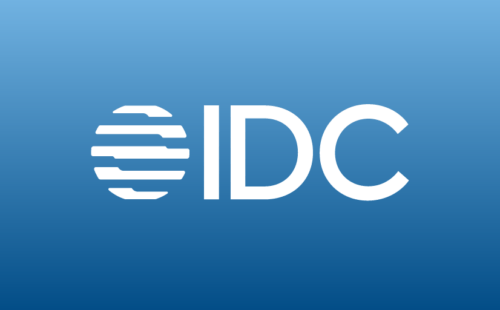 Research, Thought LeadershipIDC MarketScape: Worldwide SaaS and Cloud-Enabled Enterprise Treasury and Risk Management Applications 2023 Vendor AssessmentThe IDC MarketScape: Worldwide SaaS and Cloud-Enabled Enterprise Treasury and Risk Management Applications 2023 Vendor Assessment underscores the crucial role of effective liquidity management. The report highlights liquidity ratios as vital indicators of financial...Read the Report
Research, Thought LeadershipIDC MarketScape: Worldwide SaaS and Cloud-Enabled Enterprise Treasury and Risk Management Applications 2023 Vendor AssessmentThe IDC MarketScape: Worldwide SaaS and Cloud-Enabled Enterprise Treasury and Risk Management Applications 2023 Vendor Assessment underscores the crucial role of effective liquidity management. The report highlights liquidity ratios as vital indicators of financial...Read the Report -
 WebinarsKyriba Demo Webinar Series: Bank Connectivity as a ServiceKyriba connects to over 1,000 banks and more than 10,000 ERP instances, delivering the largest global network for ERP-to-bank connectivity. As one client recently put it, "we aren't in the payment formatting business nor...View Recording
WebinarsKyriba Demo Webinar Series: Bank Connectivity as a ServiceKyriba connects to over 1,000 banks and more than 10,000 ERP instances, delivering the largest global network for ERP-to-bank connectivity. As one client recently put it, "we aren't in the payment formatting business nor...View Recording -
 Webinars5 Steps to Avoid a Payments CatastropheConnecting your ERP(s) to your banks became a lot more complicated with the launch of FedNow, cross-border instant payment networks, the migration to XML ISO20022 formats and the need to inject AI into your...View Recording
Webinars5 Steps to Avoid a Payments CatastropheConnecting your ERP(s) to your banks became a lot more complicated with the launch of FedNow, cross-border instant payment networks, the migration to XML ISO20022 formats and the need to inject AI into your...View Recording -
 Research, Currency Impact ReportsKyriba’s July 2023 Currency Impact ReportKyriba’s Currency Impact Report (CIR), a comprehensive quarterly report which details the impacts of foreign exchange (FX) exposures among 1,200 multinational companies based in North America and Europe with at least 15 percent of their revenue coming from overseas, sustained $49.09 billion in total impacts to earnings from currency volatility.Read the Report
Research, Currency Impact ReportsKyriba’s July 2023 Currency Impact ReportKyriba’s Currency Impact Report (CIR), a comprehensive quarterly report which details the impacts of foreign exchange (FX) exposures among 1,200 multinational companies based in North America and Europe with at least 15 percent of their revenue coming from overseas, sustained $49.09 billion in total impacts to earnings from currency volatility.Read the Report -
 Success StoriesKodak Excels with Automated Treasury ReportingPrior to adopting and implementing Kyriba globally, the teams at Kodak were unable to provide senior leadership with a snapshot of their daily global cash balances. Simply looking at the bank balances did not...Read the success story
Success StoriesKodak Excels with Automated Treasury ReportingPrior to adopting and implementing Kyriba globally, the teams at Kodak were unable to provide senior leadership with a snapshot of their daily global cash balances. Simply looking at the bank balances did not...Read the success story -
 eBooks, Thought LeadershipInternational Treasury Centers Unlock Global Cash VisibilityDuring the pandemic, most organizations have experienced unexpected fluctuations in their cash and liquidity levels due to the volatile, unsettled global economy. Treasury operating models have a direct correlation to how well cash positioning and liquidity forecasting is delivered and executed.Read the eBook
eBooks, Thought LeadershipInternational Treasury Centers Unlock Global Cash VisibilityDuring the pandemic, most organizations have experienced unexpected fluctuations in their cash and liquidity levels due to the volatile, unsettled global economy. Treasury operating models have a direct correlation to how well cash positioning and liquidity forecasting is delivered and executed.Read the eBook -
 eBooks, Thought LeadershipNavigating Financial Flux: CFOs Perspective on Strategic Treasury ManagementWhile corporates have enjoyed an unprecedented financial boom for years, the recent volatility in the global markets is an indicator of changing times that could bring sharply rising interest rates and the end of cheap money. The recent demise of Silicon Valley Bank is a wake-up call to the purpose of capital and liquidity requirements and the importance of strategic treasury management.Read the eBook
eBooks, Thought LeadershipNavigating Financial Flux: CFOs Perspective on Strategic Treasury ManagementWhile corporates have enjoyed an unprecedented financial boom for years, the recent volatility in the global markets is an indicator of changing times that could bring sharply rising interest rates and the end of cheap money. The recent demise of Silicon Valley Bank is a wake-up call to the purpose of capital and liquidity requirements and the importance of strategic treasury management.Read the eBook -
 Fact SheetsKyriba SAP IntegrationUnleash the Power of Enterprise Liquidity Management with SAP and Kyriba: The certified Kyriba SAP integration, including SFTP and API integration, seamlessly connects SAP with Kyriba to automate the workflow between the two platforms.Read the fact sheet
Fact SheetsKyriba SAP IntegrationUnleash the Power of Enterprise Liquidity Management with SAP and Kyriba: The certified Kyriba SAP integration, including SFTP and API integration, seamlessly connects SAP with Kyriba to automate the workflow between the two platforms.Read the fact sheet -
 Fact SheetsKyriba & Goldman Sachs Asset Management MosaicExpanding Investment Options for Treasurers to Increase Return on Surplus Liquidity Kyriba’s Treasury Management System now connects with Goldman Sachs Liquidity Solutions Platform, Mosaic, expanding options for treasurers and increasing ways to keep surplus...Read the fact sheet
Fact SheetsKyriba & Goldman Sachs Asset Management MosaicExpanding Investment Options for Treasurers to Increase Return on Surplus Liquidity Kyriba’s Treasury Management System now connects with Goldman Sachs Liquidity Solutions Platform, Mosaic, expanding options for treasurers and increasing ways to keep surplus...Read the fact sheet -
 WebinarsLiquidity Planning Demo: Key to Real-time Decision SupportTuesday, July 4th | 10:00 am SGT Find out how Kyriba’s Cash Management, Liquidity Planning and Liquidity Analytics modules enables treasury teams and finance leaders in treasury to proactively manage cash and liquidity lifecycles...View Recording
WebinarsLiquidity Planning Demo: Key to Real-time Decision SupportTuesday, July 4th | 10:00 am SGT Find out how Kyriba’s Cash Management, Liquidity Planning and Liquidity Analytics modules enables treasury teams and finance leaders in treasury to proactively manage cash and liquidity lifecycles...View Recording -
 WebinarsLiquidity Planning Demo: Optimizing Cash and Liquidity in KyribaA showcase of Kyriba's cash and liquidity management capabilities. Our presentation team will demonstrate how Kyriba clients use our platform to transform their approach to cash and liquidity planning.View Recording
WebinarsLiquidity Planning Demo: Optimizing Cash and Liquidity in KyribaA showcase of Kyriba's cash and liquidity management capabilities. Our presentation team will demonstrate how Kyriba clients use our platform to transform their approach to cash and liquidity planning.View Recording -
 WebinarsTop 3 Cash Flow Mistakes Every Treasury MakesThe cash forecast is once again the most critical tool connecting treasury with corporate strategy and board-level decisions. Companies are expected to increase cash flow and drive a greater return on cash in this...View Recording
WebinarsTop 3 Cash Flow Mistakes Every Treasury MakesThe cash forecast is once again the most critical tool connecting treasury with corporate strategy and board-level decisions. Companies are expected to increase cash flow and drive a greater return on cash in this...View Recording -
 Success StoriesRSM Partnership Delivers Treasury Operation Success at CSIG and MoreRSM US LLP is continuing to invest in its treasury operation and is a premier partner to the Kyriba organization. RSM is the fifth largest audit, tax, and consulting firm in the United States...Read the success story
Success StoriesRSM Partnership Delivers Treasury Operation Success at CSIG and MoreRSM US LLP is continuing to invest in its treasury operation and is a premier partner to the Kyriba organization. RSM is the fifth largest audit, tax, and consulting firm in the United States...Read the success story -
 eBooks, Thought LeadershipCentralizing Payments with an In-House Bank to Fully Optimize Working CapitalModern treasury teams have numerous available tools and structures to succeed in today’s global economy. With supply chain disruptions and decreased cash flows prevalent, treasury can leverage an in-house bank (IHB) and Payments Hub...Read the eBook
eBooks, Thought LeadershipCentralizing Payments with an In-House Bank to Fully Optimize Working CapitalModern treasury teams have numerous available tools and structures to succeed in today’s global economy. With supply chain disruptions and decreased cash flows prevalent, treasury can leverage an in-house bank (IHB) and Payments Hub...Read the eBook -
 Success StoriesSabre, Varsity Brands, CHFA and International Seaways: Treasury Success with Elire and KyribaElire is a Kyriba Platinum Plus Partner with over 18 years of experience helping clients implement successful Treasury Management Solutions. With an experienced team of over 20 Treasury Consultants across multiple Treasury disciplines and...Read the success story
Success StoriesSabre, Varsity Brands, CHFA and International Seaways: Treasury Success with Elire and KyribaElire is a Kyriba Platinum Plus Partner with over 18 years of experience helping clients implement successful Treasury Management Solutions. With an experienced team of over 20 Treasury Consultants across multiple Treasury disciplines and...Read the success story -
 WebinarsCash Forecasting 2.0: The Emergence of Liquidity PlanningThe CFO no longer cares about your cash forecast! They need more. CFOs are focused on meeting free cash flow targets and require real-time insight to proactively manage liquidity across the enterprise to reduce...View Recording
WebinarsCash Forecasting 2.0: The Emergence of Liquidity PlanningThe CFO no longer cares about your cash forecast! They need more. CFOs are focused on meeting free cash flow targets and require real-time insight to proactively manage liquidity across the enterprise to reduce...View Recording -
 eBooks, Thought LeadershipVolatile Times Require Effective Working Capital SolutionsIn this e-book, you will gain an understanding of how supply chain finance (SCF), dynamic discounting and receivables finance can create a win-win solution for both buyers and suppliers while enabling treasury and procurement to work hand-in-hand to deliver working capital improvements.Read the eBook
eBooks, Thought LeadershipVolatile Times Require Effective Working Capital SolutionsIn this e-book, you will gain an understanding of how supply chain finance (SCF), dynamic discounting and receivables finance can create a win-win solution for both buyers and suppliers while enabling treasury and procurement to work hand-in-hand to deliver working capital improvements.Read the eBook -
 Videos, Success StoriesAFP 2022: Kyriba Client Testimonials for Enterprise Liquidity ManagementOrganizations from many industries and of various sizes have embraced Kyriba for their enterprise liquidity management needs. At AFP’s annual conference, our team set up a testimonial station at our convention booth, where clients...Watch the video
Videos, Success StoriesAFP 2022: Kyriba Client Testimonials for Enterprise Liquidity ManagementOrganizations from many industries and of various sizes have embraced Kyriba for their enterprise liquidity management needs. At AFP’s annual conference, our team set up a testimonial station at our convention booth, where clients...Watch the video -
 Success StoriesFilmRise: Implementation of the Year Award Runner UpAwarded to the company that had a clear project plan, stuck to it, and maintained the project discipline to achieve a go-live date with great success. Nominated by 3PO Consulting.Read the success story
Success StoriesFilmRise: Implementation of the Year Award Runner UpAwarded to the company that had a clear project plan, stuck to it, and maintained the project discipline to achieve a go-live date with great success. Nominated by 3PO Consulting.Read the success story -
 Success StoriesOrix: Fraud and Compliance Masters Award WinnerRecognizing best-in-class performance in payments fraud solution and compliance management.Read the success story
Success StoriesOrix: Fraud and Compliance Masters Award WinnerRecognizing best-in-class performance in payments fraud solution and compliance management.Read the success story -
 eBooks, Thought LeadershipAccelerating Your Business with Compelling Real-Time Payments Use Cases for Treasury and FinanceMaking Real-Time Payments a Reality for Finance and Treasury
eBooks, Thought LeadershipAccelerating Your Business with Compelling Real-Time Payments Use Cases for Treasury and FinanceMaking Real-Time Payments a Reality for Finance and Treasury
Real-time payments initiatives are proliferating all over the globe and while many countries have jumped on the bandwagon with various real-time payments use cases, corporate adoption has lagged. But to build the business case for implementing real- time, treasury and finance departments need to identify more business relevant use cases.Read the eBook -
 Success StoriesWilliams-Sonoma: Achievements in Productivity Award Runner-upAwarded to the company that has posted significant gains in productivity, freeing up treasury's time to focus on more strategic initiatives. Nominated by 3PO.Read the success story
Success StoriesWilliams-Sonoma: Achievements in Productivity Award Runner-upAwarded to the company that has posted significant gains in productivity, freeing up treasury's time to focus on more strategic initiatives. Nominated by 3PO.Read the success story -
 Success StoriesWarner Bros. Discovery: Implementation of the Year Award WinnerAwarded to the company that had a clear TMS implementation project plan, stuck to it, and maintained the project discipline to achieve a go-live date with great success. Nominated by Actualize Consulting.Read the success story
Success StoriesWarner Bros. Discovery: Implementation of the Year Award WinnerAwarded to the company that had a clear TMS implementation project plan, stuck to it, and maintained the project discipline to achieve a go-live date with great success. Nominated by Actualize Consulting.Read the success story -
 WebinarsDemo Series: FX Cash Flow & Back Office DemoTuesday, June 13th | 11:00am ET | 8:00am PT | With increased foreign exchange volatility expected to continue for the foreseeable future combined with rising hedging costs, FX Risk Management is proving to be...View Recording
WebinarsDemo Series: FX Cash Flow & Back Office DemoTuesday, June 13th | 11:00am ET | 8:00am PT | With increased foreign exchange volatility expected to continue for the foreseeable future combined with rising hedging costs, FX Risk Management is proving to be...View Recording -
 WebinarsAmerican Honda, Improving Liquidity Management with Kyriba & ICDWith continued uncertainty in financial markets and the economy, managing liquidity and diversifying cash investments is top of mind for many treasury professionals. In this webinar, American Honda shares how they use Kyriba’s ICD...View Recording
WebinarsAmerican Honda, Improving Liquidity Management with Kyriba & ICDWith continued uncertainty in financial markets and the economy, managing liquidity and diversifying cash investments is top of mind for many treasury professionals. In this webinar, American Honda shares how they use Kyriba’s ICD...View Recording -
 Research, Currency Impact ReportsKyriba’s May 2023 Currency Impact ReportKyriba’s Currency Impact Report (CIR), a comprehensive quarterly report which details the impacts of foreign exchange (FX) exposures among 1,200 multinational companies based in North America and Europe with at least 15 percent of their revenue coming from overseas, sustained $49.09 billion in total impacts to earnings from currency volatility.Read the Report
Research, Currency Impact ReportsKyriba’s May 2023 Currency Impact ReportKyriba’s Currency Impact Report (CIR), a comprehensive quarterly report which details the impacts of foreign exchange (FX) exposures among 1,200 multinational companies based in North America and Europe with at least 15 percent of their revenue coming from overseas, sustained $49.09 billion in total impacts to earnings from currency volatility.Read the Report -
 FAQsWhat is Receivables Finance?Receivables finance, also known as invoice finance, is a type of working capital facility that enables businesses to borrow against unpaid invoices. Receivables finance helps businesses to improve their cash flow by unlocking the value of invoices they’ve already issued, allowing them to access funds immediately instead of waiting for their customers to pay.Read More
FAQsWhat is Receivables Finance?Receivables finance, also known as invoice finance, is a type of working capital facility that enables businesses to borrow against unpaid invoices. Receivables finance helps businesses to improve their cash flow by unlocking the value of invoices they’ve already issued, allowing them to access funds immediately instead of waiting for their customers to pay.Read More -
 Success StoriesNew York Life Investments: Payments Innovator Award WinnerAwarded to the company that has minimized fraud, standardized and streamlined payment processes.Read the success story
Success StoriesNew York Life Investments: Payments Innovator Award WinnerAwarded to the company that has minimized fraud, standardized and streamlined payment processes.Read the success story -
 Success StoriesCostco and Phillips 66: Treasury Operations Client Success Award WinnersChosen by Kyriba's Client Success Team for best-in-class performance across treasury operations.Read the success story
Success StoriesCostco and Phillips 66: Treasury Operations Client Success Award WinnersChosen by Kyriba's Client Success Team for best-in-class performance across treasury operations.Read the success story -
 Success StoriesNucor: Payments Innovator Award WinnerAwarded to the company that has minimized fraud, standardized and streamlined check payment processing. Nominated by 3PO Consulting.Read the success story
Success StoriesNucor: Payments Innovator Award WinnerAwarded to the company that has minimized fraud, standardized and streamlined check payment processing. Nominated by 3PO Consulting.Read the success story -
 FAQsWhat is Treasury Data Analytics?Treasury data analytics is the practice of using data analysis techniques to gain insights into a company’s treasury operations, including cash and liquidity management, investment portfolios, risk management, and supply chain finance. Treasury data...Read More
FAQsWhat is Treasury Data Analytics?Treasury data analytics is the practice of using data analysis techniques to gain insights into a company’s treasury operations, including cash and liquidity management, investment portfolios, risk management, and supply chain finance. Treasury data...Read More -
 Success StoriesHF Sinclair: Treasury Transformation Award WinnerAwarded to the company that embraced technology for optimal transformation and efficiency of their treasury department.Read the success story
Success StoriesHF Sinclair: Treasury Transformation Award WinnerAwarded to the company that embraced technology for optimal transformation and efficiency of their treasury department.Read the success story -
 Success StoriesCharter Communications: Winner of Achievements in Productivity AwardAwarded to the company that has posted significant gains in productivity by creating fully automated cash and investment workflow, freeing up treasury's time to focus on more strategic initiatives. Nominated by ICD.Read the success story
Success StoriesCharter Communications: Winner of Achievements in Productivity AwardAwarded to the company that has posted significant gains in productivity by creating fully automated cash and investment workflow, freeing up treasury's time to focus on more strategic initiatives. Nominated by ICD.Read the success story -
 Success StoriesOtis: FX Optimization Award Runner UpThis award, sponsored by Kyriba partner and client Oanda, honors the company that has embraced Kyriba's FX module, and made great strides in managing FX exposure and risk.Read the success story
Success StoriesOtis: FX Optimization Award Runner UpThis award, sponsored by Kyriba partner and client Oanda, honors the company that has embraced Kyriba's FX module, and made great strides in managing FX exposure and risk.Read the success story -
 Success StoriesMetLife: Fraud and Compliance Masters Award WinnerRecognizing best-in-class performance in payments fraud prevention and compliance management.Read the success story
Success StoriesMetLife: Fraud and Compliance Masters Award WinnerRecognizing best-in-class performance in payments fraud prevention and compliance management.Read the success story -
 WebinarsLiquidity Planning Demo: Real-time Decision Support – KyribaMay 18 | 11:00am SGT | Join Kyriba on 18th May 2023 at 11am SG time and find out how Kyriba’s Cash Management, Liquidity Planning and Liquidity Analytics modules enables treasury teams and finance...View Recording
WebinarsLiquidity Planning Demo: Real-time Decision Support – KyribaMay 18 | 11:00am SGT | Join Kyriba on 18th May 2023 at 11am SG time and find out how Kyriba’s Cash Management, Liquidity Planning and Liquidity Analytics modules enables treasury teams and finance...View Recording -
 Success StoriesNational Veterinary Associates: Treasury Transformation Award Runner-UpAwarded to the company that embraced technology for optimal transformation and efficiency of their treasury department. Nominated by Elire and PWC.Read the success story
Success StoriesNational Veterinary Associates: Treasury Transformation Award Runner-UpAwarded to the company that embraced technology for optimal transformation and efficiency of their treasury department. Nominated by Elire and PWC.Read the success story -
 eBooks, Thought LeadershipWhy Digitalized Bank Connectivity is the Key to Optimizing Cash DeploymentCompanies that can identify and use cash with confidence can now leverage liquidity as an asset for strategic value creation. It’s a competitive advantage that has often been overlooked, or not available, but which...Read the eBook
eBooks, Thought LeadershipWhy Digitalized Bank Connectivity is the Key to Optimizing Cash DeploymentCompanies that can identify and use cash with confidence can now leverage liquidity as an asset for strategic value creation. It’s a competitive advantage that has often been overlooked, or not available, but which...Read the eBook -
 KyribaLive 2023 Recorded SessionsKyribaLive is where treasury and finance leaders engage, connect and transform. See all the recorded sessions.Read More
KyribaLive 2023 Recorded SessionsKyribaLive is where treasury and finance leaders engage, connect and transform. See all the recorded sessions.Read More -
 Success StoriesEastman Chemical: FX Optimization Award WinnerThis award, sponsored by Kyriba partner and client Oanda, honors the company that has embraced Kyriba's FX module, and made great strides in managing FX exposure and risk.Read the success story
Success StoriesEastman Chemical: FX Optimization Award WinnerThis award, sponsored by Kyriba partner and client Oanda, honors the company that has embraced Kyriba's FX module, and made great strides in managing FX exposure and risk.Read the success story -
 FAQsWhat is Cash Forecasting?Cash forecasting is the process of predicting near future cash flows, including both inflows and outflows, based on current business conditions and past performance. It is a crucial component of effective cash and liquidity...Read More
FAQsWhat is Cash Forecasting?Cash forecasting is the process of predicting near future cash flows, including both inflows and outflows, based on current business conditions and past performance. It is a crucial component of effective cash and liquidity...Read More -
 eBooks, Thought LeadershipBest Practices for Designing Your Treasury Management SystemDownload this ebook to learn how you can prepare your team for a successful implementation and achieve the most value from your TMS.Read the eBook
eBooks, Thought LeadershipBest Practices for Designing Your Treasury Management SystemDownload this ebook to learn how you can prepare your team for a successful implementation and achieve the most value from your TMS.Read the eBook -
 Fact SheetsKyriba and U.S. Bank Enable APIs for Real-time TreasuryModern APIs to pay, get payment confirmation, and get account balance, all in real-time. As part of a strategic partnership Kyriba and U.S. Bank have developed API connectors to drive real-time treasury, making real-time...Read the fact sheet
Fact SheetsKyriba and U.S. Bank Enable APIs for Real-time TreasuryModern APIs to pay, get payment confirmation, and get account balance, all in real-time. As part of a strategic partnership Kyriba and U.S. Bank have developed API connectors to drive real-time treasury, making real-time...Read the fact sheet -
 Research, Thought Leadership2022 Strategic Treasurer Treasury Technology Analyst Report2022 Strategic Treasurer Treasury Technology Analyst ReportRead the Report
Research, Thought Leadership2022 Strategic Treasurer Treasury Technology Analyst Report2022 Strategic Treasurer Treasury Technology Analyst ReportRead the Report -
 Fact SheetsFX Exposure Management for OracleDelivering on-demand interactivity with Oracle applications, Kyriba for Oracle is a cloud-based solution that reduces the risk of foreign currency volatility to earnings per share and corporate value. The Cloud-based Business Model Advantage: Quick...Read the fact sheet
Fact SheetsFX Exposure Management for OracleDelivering on-demand interactivity with Oracle applications, Kyriba for Oracle is a cloud-based solution that reduces the risk of foreign currency volatility to earnings per share and corporate value. The Cloud-based Business Model Advantage: Quick...Read the fact sheet -
 FAQsWhat are APIs in Treasury?Application Programming Interface (API) is an interface provided by one application for other application(s) to communicate with it. APIs in treasury management software connect different systems to share cash data or execute cash management...Read More
FAQsWhat are APIs in Treasury?Application Programming Interface (API) is an interface provided by one application for other application(s) to communicate with it. APIs in treasury management software connect different systems to share cash data or execute cash management...Read More -
 Success StoriesBeam-Suntory’s Global Treasury Management Transformation: Strategic Treasury to Optimize Liquidity and Protect GrowthBeam Suntory’s Treasury transformation modernized their operations in a decentralized environment, and with the added complexity of navigating global volatility. A dispersed team challenged by manual processes with a need to leverage a system...Read the success story
Success StoriesBeam-Suntory’s Global Treasury Management Transformation: Strategic Treasury to Optimize Liquidity and Protect GrowthBeam Suntory’s Treasury transformation modernized their operations in a decentralized environment, and with the added complexity of navigating global volatility. A dispersed team challenged by manual processes with a need to leverage a system...Read the success story -
 eBooks, Thought LeadershipThe Biggest FX Problem (That No One Talks About)Read the eBook
eBooks, Thought LeadershipThe Biggest FX Problem (That No One Talks About)Read the eBook -
 WebinarsHow to use Treasury Technology to Overcome UncertaintyTuesday April 25 | 11:00am ET | 4:00pm GMT | Having real-time insight into the locations of your liquidity is key to survival as financial institutions begin to unravel and the world economy continues...View Recording
WebinarsHow to use Treasury Technology to Overcome UncertaintyTuesday April 25 | 11:00am ET | 4:00pm GMT | Having real-time insight into the locations of your liquidity is key to survival as financial institutions begin to unravel and the world economy continues...View Recording -
 WebinarsFX Volatility Builds TMS Business CaseTuesday, May 2 | 11:00am ET | 4:00pm GMT | Securing budget for a treasury project during heightened volatility becomes easier when ROI can be achieved in months, not years. FX Risk management has...View Recording
WebinarsFX Volatility Builds TMS Business CaseTuesday, May 2 | 11:00am ET | 4:00pm GMT | Securing budget for a treasury project during heightened volatility becomes easier when ROI can be achieved in months, not years. FX Risk management has...View Recording -
 Research2022 Non-Banking Financial Institutions (NBFI) Survey ResultsExecutive Summary Thank you for reading this edition of the Non-Banking Financial Institution (NBFI) Survey. This survey was underwritten by Kyriba for the 2nd year in a row as they continue to serve an...Read the Report
Research2022 Non-Banking Financial Institutions (NBFI) Survey ResultsExecutive Summary Thank you for reading this edition of the Non-Banking Financial Institution (NBFI) Survey. This survey was underwritten by Kyriba for the 2nd year in a row as they continue to serve an...Read the Report -
 eBooks, Thought LeadershipUnlocking the Potential of AI in Treasury ManagementUnlocking the Potential of AI in Treasury ManagementRead the eBook
eBooks, Thought LeadershipUnlocking the Potential of AI in Treasury ManagementUnlocking the Potential of AI in Treasury ManagementRead the eBook -
 WebinarsHow to Secure Project Budget During UncertaintyTuesday, April 18th | 11:00am ET | 4:00pm GMT | Securing budget for a treasury project during economic uncertainty increases the focus on defining KPIs and effectively measuring ROI. Benchmarking allows Treasurers, CFOs and...View Recording
WebinarsHow to Secure Project Budget During UncertaintyTuesday, April 18th | 11:00am ET | 4:00pm GMT | Securing budget for a treasury project during economic uncertainty increases the focus on defining KPIs and effectively measuring ROI. Benchmarking allows Treasurers, CFOs and...View Recording -
 FAQsWhat is a Treasury Management System?A Treasury Management System (TMS) is a software application that allows companies to process cash flow, manage banking relationships and enhance the value of their cash flow. A Treasury Management System can help companies...Read More
FAQsWhat is a Treasury Management System?A Treasury Management System (TMS) is a software application that allows companies to process cash flow, manage banking relationships and enhance the value of their cash flow. A Treasury Management System can help companies...Read More -
 ResearchGet Strategic about Liquidity Management with a Supplemental Treasury Management SystemRead the Report
ResearchGet Strategic about Liquidity Management with a Supplemental Treasury Management SystemRead the Report -
 eBooks, Thought LeadershipDevelop Leading FX Risk Management Programs Through AutomationNearly every company doing business beyond its own borders faces the challenge of developing cost-effective FX risk management programs, and each year corporations incur billions of dollars in currency related losses due to global currency volatility. Even small organizations with modest international operations can be impacted by currency exposures if treasury fails to effectively manage foreign exchange (FX).Read the eBook
eBooks, Thought LeadershipDevelop Leading FX Risk Management Programs Through AutomationNearly every company doing business beyond its own borders faces the challenge of developing cost-effective FX risk management programs, and each year corporations incur billions of dollars in currency related losses due to global currency volatility. Even small organizations with modest international operations can be impacted by currency exposures if treasury fails to effectively manage foreign exchange (FX).Read the eBook -
 Fact SheetsKyriba Liquidity AnalyticsKyriba’s Liquidity Analytics is part of the comprehensive SaaS-based Kyriba Analytics reporting platform giving CFOs and treasury the ability to identify enterprise-wide, integrated cash, coupled with debt and investment data presented with superior visualization...Read the fact sheet
Fact SheetsKyriba Liquidity AnalyticsKyriba’s Liquidity Analytics is part of the comprehensive SaaS-based Kyriba Analytics reporting platform giving CFOs and treasury the ability to identify enterprise-wide, integrated cash, coupled with debt and investment data presented with superior visualization...Read the fact sheet -
 WebinarsDemo Series: Kyriba FX to Mitigate Currency RiskFX Risk Management is one of the most difficult objectives handed to a CFO’s organization. Touching not only all key areas of Treasury, Accounting & Finance, but also necessitating coordination with operations & lines...View Recording
WebinarsDemo Series: Kyriba FX to Mitigate Currency RiskFX Risk Management is one of the most difficult objectives handed to a CFO’s organization. Touching not only all key areas of Treasury, Accounting & Finance, but also necessitating coordination with operations & lines...View Recording -
 Fact SheetsKyriba MobileKyriba Mobile securely extends core treasury and payments functions from desktops to mobile devices, allowing informed, real-time decisions on the go.Read the fact sheet
Fact SheetsKyriba MobileKyriba Mobile securely extends core treasury and payments functions from desktops to mobile devices, allowing informed, real-time decisions on the go.Read the fact sheet -
 FAQsWhat is Liquidity Planning?Liquidity planning is an evolution of traditional cash forecasting surrounding the cash forecast with data which supports better-informed liquidity decisions.Read More
FAQsWhat is Liquidity Planning?Liquidity planning is an evolution of traditional cash forecasting surrounding the cash forecast with data which supports better-informed liquidity decisions.Read More -
 FAQsWhat are Corporate Payments?Corporate payments, or B2B payments, usually refer to the financial transactions made by a company or corporation to pay for various expenses related to its business operations. These payments may include salaries, wages, bonuses,...Read More
FAQsWhat are Corporate Payments?Corporate payments, or B2B payments, usually refer to the financial transactions made by a company or corporation to pay for various expenses related to its business operations. These payments may include salaries, wages, bonuses,...Read More -
 FAQsWhat is Open Banking for Corporates?Open banking is a banking practice that gives consumers full control over their own banking or financial data so that they can decide whether any third-party financial service providers can access the data to...Read More
FAQsWhat is Open Banking for Corporates?Open banking is a banking practice that gives consumers full control over their own banking or financial data so that they can decide whether any third-party financial service providers can access the data to...Read More -
 FAQsWhat are Real-time Payments?Real-time payments are a payment type where the transmission of the payment message and the availability of “final” funds to the payee occur in real time or near-real time and on as near to...Read More
FAQsWhat are Real-time Payments?Real-time payments are a payment type where the transmission of the payment message and the availability of “final” funds to the payee occur in real time or near-real time and on as near to...Read More -
 WebinarsManaging Global FX RiskFX volatility is at a 20 year high, and coupled with high interest rates, the challenge of delivering predictable earnings guidance against a tightening budget has become a top priority for CFOs.View Recording
WebinarsManaging Global FX RiskFX volatility is at a 20 year high, and coupled with high interest rates, the challenge of delivering predictable earnings guidance against a tightening budget has become a top priority for CFOs.View Recording -
 Success StoriesLowe’s Uses Bank Fee Analysis to do it Right, for LessThe scale of Lowe’s bank account environment is extremely large, with over 2000 bank accounts with 33 banking partners. Prior to Kyriba, the treasury department used a third party application for bank fee analysis,...Read the success story
Success StoriesLowe’s Uses Bank Fee Analysis to do it Right, for LessThe scale of Lowe’s bank account environment is extremely large, with over 2000 bank accounts with 33 banking partners. Prior to Kyriba, the treasury department used a third party application for bank fee analysis,...Read the success story -
 Webinars, Thought LeadershipKyriba Demo Webinar: On Demand, On Your Time.On-Demand, On Your Time. Kyriba has elevated technology for CFO’s and Treasurers around the world. Join us for a deep dive into the NEW Kyriba Treasury, Payments & Risk Platform. With brand new User...View Recording
Webinars, Thought LeadershipKyriba Demo Webinar: On Demand, On Your Time.On-Demand, On Your Time. Kyriba has elevated technology for CFO’s and Treasurers around the world. Join us for a deep dive into the NEW Kyriba Treasury, Payments & Risk Platform. With brand new User...View Recording -
 WebinarsLiquidity Planning Demo: Thomas GavaghanIn a high interest rate environment, coupled with increasing volatility, CFOs and Treasury leaders are demanding more robust and real-time controls over their liquidity. This demo webinar will demonstrate the value of Kyriba's liquidity...View Recording
WebinarsLiquidity Planning Demo: Thomas GavaghanIn a high interest rate environment, coupled with increasing volatility, CFOs and Treasury leaders are demanding more robust and real-time controls over their liquidity. This demo webinar will demonstrate the value of Kyriba's liquidity...View Recording -
 FAQsWhat is Kyriba Used for?Kyriba is the global leader in cloud treasury and finance solutions, delivering Software-as-a-Service (SaaS) for CFOs and corporate treasurers with a full suite of products and solutions across cash and risk management, payments, and working capital.Read More
FAQsWhat is Kyriba Used for?Kyriba is the global leader in cloud treasury and finance solutions, delivering Software-as-a-Service (SaaS) for CFOs and corporate treasurers with a full suite of products and solutions across cash and risk management, payments, and working capital.Read More -
What is Kyriba Used for?Kyriba is the global leader in cloud treasury and finance solutions, delivering Software-as-a-Service (SaaS) for CFOs and corporate treasurers with a full suite of products and solutions across cash and risk management, payments, and working capital.Read More
-
What is Kyriba Used for?Kyriba is the global leader in cloud treasury and finance solutions, delivering Software-as-a-Service (SaaS) for CFOs and corporate treasurers with a full suite of products and solutions across cash and risk management, payments, and working capital.Read More
-
 Success StoriesOverall Winner Best Digitisation Solution DT OneTeam of Four Solve “The Big Problem” at DT One William Tan, Kyriba, Neo Zi Xin and Vincent Fu, DT One The Challenge In the past, this fast growth company faced significant operational risk...Read the success story
Success StoriesOverall Winner Best Digitisation Solution DT OneTeam of Four Solve “The Big Problem” at DT One William Tan, Kyriba, Neo Zi Xin and Vincent Fu, DT One The Challenge In the past, this fast growth company faced significant operational risk...Read the success story -
 FAQsWhat is Payment Fraud?Payment fraud is a prevalent financial crime in today’s global and connected business world. It usually involves a fake or illegal money transfer committed by a criminal. It victimizes many organizations both in terms...Read More
FAQsWhat is Payment Fraud?Payment fraud is a prevalent financial crime in today’s global and connected business world. It usually involves a fake or illegal money transfer committed by a criminal. It victimizes many organizations both in terms...Read More -
 FAQsWhat is Connectivity-as-a-Service?Connectivity-as-a-Service (CaaS), or corporate ERP to bank connectivity as a service in treasury and corporate payments management, is to provide quick onboarding and secure connectivity services to businesses so that they can be released...Read More
FAQsWhat is Connectivity-as-a-Service?Connectivity-as-a-Service (CaaS), or corporate ERP to bank connectivity as a service in treasury and corporate payments management, is to provide quick onboarding and secure connectivity services to businesses so that they can be released...Read More -
 Success StoriesGame On! Riot Games Combines Kyriba & ICD for Maximum BenefitBogged down by manual processes and lack of resources, the treasury team at Riot Games opted to level up their technology by implementing a TMS and an independent investment portal. Riot Games is a...Read the success story
Success StoriesGame On! Riot Games Combines Kyriba & ICD for Maximum BenefitBogged down by manual processes and lack of resources, the treasury team at Riot Games opted to level up their technology by implementing a TMS and an independent investment portal. Riot Games is a...Read the success story -
 WebinarsCash smart: How to maximise your cash liquidity strategyThursday, March 9th 2023 - 7:00 AM (PST) | The economic volatility and downturn has highlighted the importance of cash and liquidity for businesses. It has become critical for finance leaders to have clear...View Recording
WebinarsCash smart: How to maximise your cash liquidity strategyThursday, March 9th 2023 - 7:00 AM (PST) | The economic volatility and downturn has highlighted the importance of cash and liquidity for businesses. It has become critical for finance leaders to have clear...View Recording -
 eBooks, Thought LeadershipThe Winning Formula for Your ISO 20022 Payments MigrationRead the eBook
eBooks, Thought LeadershipThe Winning Formula for Your ISO 20022 Payments MigrationRead the eBook -
 eBooks, Thought Leadership5 Steps to Gaining Clearer Cash Visibility5 Steps to Gaining Clearer Cash VisibilityRead the eBook
eBooks, Thought Leadership5 Steps to Gaining Clearer Cash Visibility5 Steps to Gaining Clearer Cash VisibilityRead the eBook -
 Research, Thought LeadershipA New Practice Area Emerges for CFOs: Enterprisewide Liquidity ManagementThe IDC White Paper commissioned by Kyriba validates the emergence of a new practice area in Enterprise IT that includes risk management, payments, real-time connectivity, treasury management and working capital optimization. Download this report...Read the Report
Research, Thought LeadershipA New Practice Area Emerges for CFOs: Enterprisewide Liquidity ManagementThe IDC White Paper commissioned by Kyriba validates the emergence of a new practice area in Enterprise IT that includes risk management, payments, real-time connectivity, treasury management and working capital optimization. Download this report...Read the Report -
 eBooks, Thought LeadershipAPIs for Finance: Transforming Cash, Liquidity and PaymentsAPIs for Finance: Transforming Cash, Liquidity and PaymentsRead the eBook
eBooks, Thought LeadershipAPIs for Finance: Transforming Cash, Liquidity and PaymentsAPIs for Finance: Transforming Cash, Liquidity and PaymentsRead the eBook -
 Research, Currency Impact ReportsKyriba’s January 2023 Currency Impact ReportA Quarterly Report Assessing the Impact of Foreign Exchange to North American and European Corporate Earnings About the Report The January 2023 Kyriba Currency Impact Report analyzes the reported effects of currency volatility to...Read the Report
Research, Currency Impact ReportsKyriba’s January 2023 Currency Impact ReportA Quarterly Report Assessing the Impact of Foreign Exchange to North American and European Corporate Earnings About the Report The January 2023 Kyriba Currency Impact Report analyzes the reported effects of currency volatility to...Read the Report -
 WebinarsGetting Real: The Truth about Instant Payments and CollectionsTuesday, 24 January 2023 - 2pm GMT | 3pm CET | 9am ET | TMI showcases topical, pragmatic solutions and strategic insights for all treasury practitioners, from experienced treasurers and CFOs to those new...View Recording
WebinarsGetting Real: The Truth about Instant Payments and CollectionsTuesday, 24 January 2023 - 2pm GMT | 3pm CET | 9am ET | TMI showcases topical, pragmatic solutions and strategic insights for all treasury practitioners, from experienced treasurers and CFOs to those new...View Recording -
 Success StoriesBolt’s Rapid Growth Requires Scalability"We selected Kyriba thanks to the track record they have working with fast growing tech companies that made it a safe bet. We’re implementing an advanced treasury system that can handle all our requirements...Read the success story
Success StoriesBolt’s Rapid Growth Requires Scalability"We selected Kyriba thanks to the track record they have working with fast growing tech companies that made it a safe bet. We’re implementing an advanced treasury system that can handle all our requirements...Read the success story -
 eBooksWhat’s Next? A Practical AFP Guide to Prepare for Change in 2023Kyriba is proud to be a continued supporter of AFP’s Treasury in Practice series, including this most recent publication, What’s Next? A Practical Guide to Prepare for Change in 2023. 2022 can be best...Read the eBook
eBooksWhat’s Next? A Practical AFP Guide to Prepare for Change in 2023Kyriba is proud to be a continued supporter of AFP’s Treasury in Practice series, including this most recent publication, What’s Next? A Practical Guide to Prepare for Change in 2023. 2022 can be best...Read the eBook -
 Fact SheetsPartnerSURGE Sales & Pre-Sales CertificationBacked by strong incentives and market-leading technology, Kyriba delivers one of the strongest and most comprehensive partner programs in the industry. Treasury and Finance Technology: An Expanding Market PartnerSURGE is a program designed to...Read the fact sheet
Fact SheetsPartnerSURGE Sales & Pre-Sales CertificationBacked by strong incentives and market-leading technology, Kyriba delivers one of the strongest and most comprehensive partner programs in the industry. Treasury and Finance Technology: An Expanding Market PartnerSURGE is a program designed to...Read the fact sheet -
 Success StoriesXcel Energy’s Treasury Modernization in Regulated Utility WorldRegulatory Requirements Created Unique Challenges At the onset of the pandemic, Xcel Energy embarked on a mission to upgrade out of legacy systems and spreadsheets and into a cloud-based treasury management system to modernize...Read the success story
Success StoriesXcel Energy’s Treasury Modernization in Regulated Utility WorldRegulatory Requirements Created Unique Challenges At the onset of the pandemic, Xcel Energy embarked on a mission to upgrade out of legacy systems and spreadsheets and into a cloud-based treasury management system to modernize...Read the success story -
 Fact SheetsKyriba AnalyticsKyriba AnalyticsRead the fact sheet
Fact SheetsKyriba AnalyticsKyriba AnalyticsRead the fact sheet -
 Fact SheetsKyriba’s Cash and Liquidity Management SolutionKyriba’s Cash and Liquidity Management Solution offers Cash Management, Cash Forecasting, Liquidity Planning and Liquidity Analytics modules for CFOs and treasurers to predict cash and liquidity requirements and make data-driven liquidity decisions. The practice...Read the fact sheet
Fact SheetsKyriba’s Cash and Liquidity Management SolutionKyriba’s Cash and Liquidity Management Solution offers Cash Management, Cash Forecasting, Liquidity Planning and Liquidity Analytics modules for CFOs and treasurers to predict cash and liquidity requirements and make data-driven liquidity decisions. The practice...Read the fact sheet -
 PodcastsEpisode 30: Free Cash Flow Strategies and Business LeadershipThis CFO Podcast discusses free cash flow strategies and business leadership with Dan Gardner, CFO at DT One.Listen to the Podcast
PodcastsEpisode 30: Free Cash Flow Strategies and Business LeadershipThis CFO Podcast discusses free cash flow strategies and business leadership with Dan Gardner, CFO at DT One.Listen to the Podcast -
 Fact SheetsKyriba Liquidity PlanningCash forecasting has changed post-pandemic, with new practices emerging to predict free cash flow and liquidity more accurately and at greater speed. Kyriba has responded with a completely modernized solution to confidently extend forecasting horizons and support data-driven liquidity decisions.Read the fact sheet
Fact SheetsKyriba Liquidity PlanningCash forecasting has changed post-pandemic, with new practices emerging to predict free cash flow and liquidity more accurately and at greater speed. Kyriba has responded with a completely modernized solution to confidently extend forecasting horizons and support data-driven liquidity decisions.Read the fact sheet -
 Success Stories, Mid-Market ResourcesAlign Technology: FX Hedging Program in Alignment with Senior Management’s Goals"Align Technology, along with Kyriba and Refinitiv FXall, has created a simplified hedging program with rock solid analytics. Senior Management is again confident with the FX hedging program." Laura Fisher, Financial Risk Management Challenges...Read the success story
Success Stories, Mid-Market ResourcesAlign Technology: FX Hedging Program in Alignment with Senior Management’s Goals"Align Technology, along with Kyriba and Refinitiv FXall, has created a simplified hedging program with rock solid analytics. Senior Management is again confident with the FX hedging program." Laura Fisher, Financial Risk Management Challenges...Read the success story -
 Fact SheetsLeveraging SWIFT Bank Connectivity with KyribaKyriba is a fully SWIFT-certified Application for Cash Management and Payments, offering multi-bank Connectivity-as-a-Service integrated within Kyriba’s leading liquidity management cloud platform for treasurers and CFOs. This Factsheet explains how your organization can use...Read the fact sheet
Fact SheetsLeveraging SWIFT Bank Connectivity with KyribaKyriba is a fully SWIFT-certified Application for Cash Management and Payments, offering multi-bank Connectivity-as-a-Service integrated within Kyriba’s leading liquidity management cloud platform for treasurers and CFOs. This Factsheet explains how your organization can use...Read the fact sheet -
 Fact SheetsTreasury Management for Mortgage IndustryKyriba provides treasury management solution for mortgage industry to realize greater centralized cash visibility, real-time treasury reporting, improved audit results, and regulatory compliance and control. Current Industry Challenges Cash & Capacity Finance & Treasury...Read the fact sheet
Fact SheetsTreasury Management for Mortgage IndustryKyriba provides treasury management solution for mortgage industry to realize greater centralized cash visibility, real-time treasury reporting, improved audit results, and regulatory compliance and control. Current Industry Challenges Cash & Capacity Finance & Treasury...Read the fact sheet -
 WebinarsTop 5 Treasury Practices That Will Change Your 20232022 was a year to remember, with extremes in every discipline: price volatility, unabated inflation, increasing borrowing rates, new forecasting demands, and the looming hope of real-time bank reporting. As you prepare for the...View Recording
WebinarsTop 5 Treasury Practices That Will Change Your 20232022 was a year to remember, with extremes in every discipline: price volatility, unabated inflation, increasing borrowing rates, new forecasting demands, and the looming hope of real-time bank reporting. As you prepare for the...View Recording -
 Fact SheetsKyriba Receivables FinanceThe speed with which you as a seller convert receivables into cash is critical for your organization. Accelerate a cash injection into your company with Kyriba Receivables Finance solution — Kyriba’s latest working capital...Read the fact sheet
Fact SheetsKyriba Receivables FinanceThe speed with which you as a seller convert receivables into cash is critical for your organization. Accelerate a cash injection into your company with Kyriba Receivables Finance solution — Kyriba’s latest working capital...Read the fact sheet -
 VideosVideo on The World’s Most Connected Treasury PlatformAs the world’s most connected treasury platform, Kyriba has been revolutionizing the treasury and risk management landscape for the past two decades.Watch the video
VideosVideo on The World’s Most Connected Treasury PlatformAs the world’s most connected treasury platform, Kyriba has been revolutionizing the treasury and risk management landscape for the past two decades.Watch the video -
 Fact SheetsKyriba Payments Solution for Insurance CompaniesRead the fact sheet
Fact SheetsKyriba Payments Solution for Insurance CompaniesRead the fact sheet -
 PodcastsEpisode 29: A CFOs Guide to Building Business Goals, Relationships, and Managing RiskThis episode features an interview with Ravi Narula, Chief Financial Officer of FinancialForce.Listen to the Podcast
PodcastsEpisode 29: A CFOs Guide to Building Business Goals, Relationships, and Managing RiskThis episode features an interview with Ravi Narula, Chief Financial Officer of FinancialForce.Listen to the Podcast -
 Fact SheetsKyriba Platinum Support NetworkKyriba is pleased to offer Platinum Support for our Treasury, Payments and Supply Chain Finance clients in need of our most advanced level of support, designed for companies that require a more tailored approach...Read the fact sheet
Fact SheetsKyriba Platinum Support NetworkKyriba is pleased to offer Platinum Support for our Treasury, Payments and Supply Chain Finance clients in need of our most advanced level of support, designed for companies that require a more tailored approach...Read the fact sheet -
 WebinarsKyriba Demo Series: Cash ForecastingWednesday, November 30 | 9:00am PST | 12:00pm EST | 2022 and forecasts for 2023 reflect continued, pervasive threats to profitability and overall financial performance. The effects of higher prices, rising operating costs and...View Recording
WebinarsKyriba Demo Series: Cash ForecastingWednesday, November 30 | 9:00am PST | 12:00pm EST | 2022 and forecasts for 2023 reflect continued, pervasive threats to profitability and overall financial performance. The effects of higher prices, rising operating costs and...View Recording -
 Research, Currency Impact ReportsKyriba’s October 2022 Currency Impact ReportKyriba’s Currency Impact Report (CIR), a comprehensive quarterly report which details the impacts of foreign exchange (FX) exposures among 1,200 multinational companies based in North America and Europe with at least 15 percent of their revenue coming from overseas, sustained $49.09 billion in total impacts to earnings from currency volatility.Read the Report
Research, Currency Impact ReportsKyriba’s October 2022 Currency Impact ReportKyriba’s Currency Impact Report (CIR), a comprehensive quarterly report which details the impacts of foreign exchange (FX) exposures among 1,200 multinational companies based in North America and Europe with at least 15 percent of their revenue coming from overseas, sustained $49.09 billion in total impacts to earnings from currency volatility.Read the Report -
 PodcastsEpisode 28: The Holy Grail of Finance: Real-Time Data, Sustainable Growth and a Solid Bottom LineThis episode features an interview with Manish Sarin, CFO at Sprinklr.Listen to the Podcast
PodcastsEpisode 28: The Holy Grail of Finance: Real-Time Data, Sustainable Growth and a Solid Bottom LineThis episode features an interview with Manish Sarin, CFO at Sprinklr.Listen to the Podcast -
 WebinarsManaging Volatility: Rewriting Treasury’s PlaybookAs market volatility and economic uncertainty continue, corporate treasurers are forced to write a new playbook for 2022 and beyond. Strong currency headwinds, continued interest rate increases, unabating inflation, a highly mobile labor market,...View Recording
WebinarsManaging Volatility: Rewriting Treasury’s PlaybookAs market volatility and economic uncertainty continue, corporate treasurers are forced to write a new playbook for 2022 and beyond. Strong currency headwinds, continued interest rate increases, unabating inflation, a highly mobile labor market,...View Recording -
 PodcastsEpisode 27: How to Design a Growth Narrative with AI, Technology and TalentThis episode features an interview with Nitesh Sharan, CFO at SoundHound.Listen to the Podcast
PodcastsEpisode 27: How to Design a Growth Narrative with AI, Technology and TalentThis episode features an interview with Nitesh Sharan, CFO at SoundHound.Listen to the Podcast -
 Success StoriesWahl Clipper Multilateral Netting Trims Significant FX CostsClear Need for Better Control over FX Exposures and Fees Wahl Clipper saw the opportunity to expand the value of their Microsoft Dynamics 365 ERP investment by integrating with Kyriba to support more complex...Read the success story
Success StoriesWahl Clipper Multilateral Netting Trims Significant FX CostsClear Need for Better Control over FX Exposures and Fees Wahl Clipper saw the opportunity to expand the value of their Microsoft Dynamics 365 ERP investment by integrating with Kyriba to support more complex...Read the success story -
 WebinarsCurrency Collision Course: FX Headwinds & USD StrengthWednesday, November 9nd | 9:00am PT | 12:00pm ET | FX volatility has hit major global currencies, rather than just a handful of emerging markets, which is resulting in the largest magnitude of FX...View Recording
WebinarsCurrency Collision Course: FX Headwinds & USD StrengthWednesday, November 9nd | 9:00am PT | 12:00pm ET | FX volatility has hit major global currencies, rather than just a handful of emerging markets, which is resulting in the largest magnitude of FX...View Recording -
 Success StoriesApplying Technology at Oracle Cerner to Eliminate a $4B Payments Bottleneck“As a health IT company, we go through extreme efforts to be in compliance and protected. Upgrading and maintaining our own SWIFT BIC would be a continuous drain on IT resources, and our executives quickly approved the Kyriba solution.”Read the success story
Success StoriesApplying Technology at Oracle Cerner to Eliminate a $4B Payments Bottleneck“As a health IT company, we go through extreme efforts to be in compliance and protected. Upgrading and maintaining our own SWIFT BIC would be a continuous drain on IT resources, and our executives quickly approved the Kyriba solution.”Read the success story -
 WebinarsNavigating Business Continuity During UncertaintyGlobal Economic and Geo-Political uncertainty brings new risks to business continuity. We can qualify by known risks and unknown risk. There is no task more challenging than planning for the unknown. Business continuity can...View Recording
WebinarsNavigating Business Continuity During UncertaintyGlobal Economic and Geo-Political uncertainty brings new risks to business continuity. We can qualify by known risks and unknown risk. There is no task more challenging than planning for the unknown. Business continuity can...View Recording -
 WebinarsACT Webinar – The Cash-Smart Treasury: identify, protect and grow in volatile timesDiscover new technology solutions and strategies designed to help you be more cash-smart. Given the growing enterprise exposure to inflation and potential recession, rising interest rates, and skyrocketing currency volatility and hedging costs, CFOs...View Recording
WebinarsACT Webinar – The Cash-Smart Treasury: identify, protect and grow in volatile timesDiscover new technology solutions and strategies designed to help you be more cash-smart. Given the growing enterprise exposure to inflation and potential recession, rising interest rates, and skyrocketing currency volatility and hedging costs, CFOs...View Recording -
 VideosValuations & Accounting: FX Exposure ManagementKyriba supports derivative and hedge accounting for ASC and IFRS compliance, including mark-to-market for valuations and automated posting of derivative & hedge accounting entries to your ERP.Watch the video
VideosValuations & Accounting: FX Exposure ManagementKyriba supports derivative and hedge accounting for ASC and IFRS compliance, including mark-to-market for valuations and automated posting of derivative & hedge accounting entries to your ERP.Watch the video -
 WebinarsDelivering Through Adversity: How Exelon & Constellation Energy Transformed during their DivestitureAfter the announced divestiture, Exelon and Constellation Energy each required a modernized Treasury Management System to run their businesses autonomously, reduce cost and transform operations.View Recording
WebinarsDelivering Through Adversity: How Exelon & Constellation Energy Transformed during their DivestitureAfter the announced divestiture, Exelon and Constellation Energy each required a modernized Treasury Management System to run their businesses autonomously, reduce cost and transform operations.View Recording -
 Success StoriesICD Joins Kyriba Liquidity Network With Addition Of Real-time Investments“With ICD and Kyriba bringing real-time treasury to the next level, our organization is able to make investment decisions based on up-to-date account data, fund availability and market data. From one platform we can...Read the success story
Success StoriesICD Joins Kyriba Liquidity Network With Addition Of Real-time Investments“With ICD and Kyriba bringing real-time treasury to the next level, our organization is able to make investment decisions based on up-to-date account data, fund availability and market data. From one platform we can...Read the success story -
 Fact SheetsTreasury Requirements in the Oil and Gas IndustriesKyriba’s clients in the oil and natural gas industries range from production equipment manufacturing, exploration, and extraction to pipeline transportation. We help these companies through our industry expertise and leading solutions. While no two...Read the fact sheet
Fact SheetsTreasury Requirements in the Oil and Gas IndustriesKyriba’s clients in the oil and natural gas industries range from production equipment manufacturing, exploration, and extraction to pipeline transportation. We help these companies through our industry expertise and leading solutions. While no two...Read the fact sheet -
 Videos, Success StoriesOne Version of the TruthKyriba clients and Liquidity Excellence Award winners tell all, and it is clear: Organizations around the world have experienced a revolutionary transformation with Kyriba, constantly evolving and modernizing treasury processes and systems. And we...Watch the video
Videos, Success StoriesOne Version of the TruthKyriba clients and Liquidity Excellence Award winners tell all, and it is clear: Organizations around the world have experienced a revolutionary transformation with Kyriba, constantly evolving and modernizing treasury processes and systems. And we...Watch the video -
 Fact SheetsKyriba In-House Banking SolutionFor companies with complex funding, procurement, FX, or cash and liquidity management activities, managing these without technology is challenging to say the least. Kyriba’s In-House Banking solution gives organizations the control to create optimal...Read the fact sheet
Fact SheetsKyriba In-House Banking SolutionFor companies with complex funding, procurement, FX, or cash and liquidity management activities, managing these without technology is challenging to say the least. Kyriba’s In-House Banking solution gives organizations the control to create optimal...Read the fact sheet -
 WebinarsHow can companies prepare for economic volatility?You're invited to attend How Can Companies Prepare for Economic Volatility?, a free webinar hosted by the Financial Times, in partnership with Kyriba. This virtual panel will bring together the following business leaders and...View Recording
WebinarsHow can companies prepare for economic volatility?You're invited to attend How Can Companies Prepare for Economic Volatility?, a free webinar hosted by the Financial Times, in partnership with Kyriba. This virtual panel will bring together the following business leaders and...View Recording -
 Fact SheetsFX Exposure Management For SAP ERPKyriba delivers the industry’s most advanced currency risk management solutions with extensive business intelligence capabilities for easy identification and understanding of foreign exchange (FX) risk. We use extract toolkits to collect complete and accurate...Read the fact sheet
Fact SheetsFX Exposure Management For SAP ERPKyriba delivers the industry’s most advanced currency risk management solutions with extensive business intelligence capabilities for easy identification and understanding of foreign exchange (FX) risk. We use extract toolkits to collect complete and accurate...Read the fact sheet -
 Fact SheetsKyriba Commodities Risk ManagementKyriba’s Commodities Risk Management solution gives finance organizations the ability to track, value and generate accounting entries for commodities exposures and transactions, alongside FX and interest rate positions already supported in the platform. Kyriba...Read the fact sheet
Fact SheetsKyriba Commodities Risk ManagementKyriba’s Commodities Risk Management solution gives finance organizations the ability to track, value and generate accounting entries for commodities exposures and transactions, alongside FX and interest rate positions already supported in the platform. Kyriba...Read the fact sheet -
 PodcastsEpisode 26: Untrap Your Liquidity Through Data and TechnologyThis episode features an interview with David Quinn, CFO at BlueVine.Listen to the Podcast
PodcastsEpisode 26: Untrap Your Liquidity Through Data and TechnologyThis episode features an interview with David Quinn, CFO at BlueVine.Listen to the Podcast -
 WebinarsPayment Hub Path to Efficiency, Control & Cost ReductionIn the current environment of rising interest rates and inflation, treasurers are increasingly focused on cost reduction. Learn how Walker & Dunlop reduced payment costs and improved productivity through their payment hub. Get first-hand...View Recording
WebinarsPayment Hub Path to Efficiency, Control & Cost ReductionIn the current environment of rising interest rates and inflation, treasurers are increasingly focused on cost reduction. Learn how Walker & Dunlop reduced payment costs and improved productivity through their payment hub. Get first-hand...View Recording -
 Fact SheetsKyriba FX Advisory ServicesKyriba’s FX Advisory Services delivers customized solutions to implement and optimize global FX risk management programs. From execution to accounting, FX risk management is a complex, ever-shifting responsibility, which is difficult for organizations to...Read the fact sheet
Fact SheetsKyriba FX Advisory ServicesKyriba’s FX Advisory Services delivers customized solutions to implement and optimize global FX risk management programs. From execution to accounting, FX risk management is a complex, ever-shifting responsibility, which is difficult for organizations to...Read the fact sheet -
 Success StoriesTechnology Integration Transforms Adobe’s TreasuryAdobe is experiencing substantial growth with a goal of creating a world-class treasury organization and to build a platform that would sustain it throughout the next decade. “This was a very open-minded collaboration where...Read the success story
Success StoriesTechnology Integration Transforms Adobe’s TreasuryAdobe is experiencing substantial growth with a goal of creating a world-class treasury organization and to build a platform that would sustain it throughout the next decade. “This was a very open-minded collaboration where...Read the success story -
 Thought Leadership, Fact SheetsHow to Benchmark Your Enterprise Liquidity Management ProcessesELM is one of the most critical areas for any organization. It spans Cash & Liquidity Management, Capital Markets & Risk Management, Payments & Fraud, and Working Capital, all of which are paramount to organizational vitality.Learn more
Thought Leadership, Fact SheetsHow to Benchmark Your Enterprise Liquidity Management ProcessesELM is one of the most critical areas for any organization. It spans Cash & Liquidity Management, Capital Markets & Risk Management, Payments & Fraud, and Working Capital, all of which are paramount to organizational vitality.Learn more -
 WebinarsEmpowering Utilities & Energy: Xcel Energy’s Treasury ModernizationXcel Energy had outdated legacy treasury and reconciliation systems that challenged the organization to keep pace with its regulated electric and natural gas delivery business needs. With Kyriba as the catalyst, Xcel Energy embarked...View Recording
WebinarsEmpowering Utilities & Energy: Xcel Energy’s Treasury ModernizationXcel Energy had outdated legacy treasury and reconciliation systems that challenged the organization to keep pace with its regulated electric and natural gas delivery business needs. With Kyriba as the catalyst, Xcel Energy embarked...View Recording -
 Thought Leadership, Fact SheetsUnlocking Enterprise Liquidity Management: Developing Your Ironclad Business Case for Liquidity TransformationDigital transformation continues to occupy front and center stage across all areas of finance and banking. The pandemic and geopolitical shocks have amplified the need for real-time insights enabling confidence in financial decisions, especially as they relate to liquidity.Learn more
Thought Leadership, Fact SheetsUnlocking Enterprise Liquidity Management: Developing Your Ironclad Business Case for Liquidity TransformationDigital transformation continues to occupy front and center stage across all areas of finance and banking. The pandemic and geopolitical shocks have amplified the need for real-time insights enabling confidence in financial decisions, especially as they relate to liquidity.Learn more -
 eBooks, Thought LeadershipPerfecting the Cash Flow Forecast in an Uncertain MarketCash forecasting is an art that is difficult to perfect. Every organization talks about forecasting more effectively, but few allocate sufficient people, time, and technology to build an effective program. Understanding the importance of...Read the eBook
eBooks, Thought LeadershipPerfecting the Cash Flow Forecast in an Uncertain MarketCash forecasting is an art that is difficult to perfect. Every organization talks about forecasting more effectively, but few allocate sufficient people, time, and technology to build an effective program. Understanding the importance of...Read the eBook -
 Fact SheetsCash Flow Hedging in Volatile MarketsCash flow hedge programs are generally longer term in nature. Positions due to mature were locked months or years ago, and new positions may not impact the P&L for months or years down the road. Despite the longer time horizons, there are still opportunities to make your hedge program more effective when volatility strikes.Read the fact sheet
Fact SheetsCash Flow Hedging in Volatile MarketsCash flow hedge programs are generally longer term in nature. Positions due to mature were locked months or years ago, and new positions may not impact the P&L for months or years down the road. Despite the longer time horizons, there are still opportunities to make your hedge program more effective when volatility strikes.Read the fact sheet -
 Fact SheetsFX Balance Sheet Hedging GuideTreasury organizations and CFOs have the dual objective of managing risk to an acceptable level while also containing the cost of hedging across their portfolio of currencies. Several best practices stand out that separate the hedge programs that show cracks (or fall apart) under stress, from the best performing hedge programs.Read the fact sheet
Fact SheetsFX Balance Sheet Hedging GuideTreasury organizations and CFOs have the dual objective of managing risk to an acceptable level while also containing the cost of hedging across their portfolio of currencies. Several best practices stand out that separate the hedge programs that show cracks (or fall apart) under stress, from the best performing hedge programs.Read the fact sheet -
 PodcastsEpisode 25: How To Optimize Your FX Risk Management Program and Stay Ahead of the CurveThis is a special episode featuring Kyriba’s Senior Vice President of FX Sales and Advisory Services, Andy Gage.Listen to the Podcast
PodcastsEpisode 25: How To Optimize Your FX Risk Management Program and Stay Ahead of the CurveThis is a special episode featuring Kyriba’s Senior Vice President of FX Sales and Advisory Services, Andy Gage.Listen to the Podcast -
 WebinarsBenchmarking: Identify Opportunities Through ComparisonBenchmarking is critical to evaluate and improve financial position and gain a competitive advantage. But many leaders don’t have a clear picture of where they stand - often due to time and resources constraints,...View Recording
WebinarsBenchmarking: Identify Opportunities Through ComparisonBenchmarking is critical to evaluate and improve financial position and gain a competitive advantage. But many leaders don’t have a clear picture of where they stand - often due to time and resources constraints,...View Recording -
 PodcastsEpisode 24: Liquidity and Metrics that Matter to CFOsThis episode features an interview with Alex Song, Head of Finance and Capital Markets at Ramp, a finance automation platform offering corporate cards and expense management so companies save time and money with every click.Listen to the Podcast
PodcastsEpisode 24: Liquidity and Metrics that Matter to CFOsThis episode features an interview with Alex Song, Head of Finance and Capital Markets at Ramp, a finance automation platform offering corporate cards and expense management so companies save time and money with every click.Listen to the Podcast -
 Research, Currency Impact ReportsKyriba’s July 2022 Currency Impact ReportA Quarterly Report Assessing the Impact of Foreign Exchange to North American and European Corporate Earnings About the Report The July 2022 Kyriba Currency Impact Report analyzes the reported effects of currencies to North...Read the Report
Research, Currency Impact ReportsKyriba’s July 2022 Currency Impact ReportA Quarterly Report Assessing the Impact of Foreign Exchange to North American and European Corporate Earnings About the Report The July 2022 Kyriba Currency Impact Report analyzes the reported effects of currencies to North...Read the Report -
 PodcastsEpisode 23: A Fresh Perspective on Owning the Number and Driving GrowthThis episode features an interview with Sinohe Terrero, CFO at Envoy speaking with The Invisible Vault host Daniel Shaffer, Senior Manager, Global Digital Communications & Public Relations at Kyriba.Listen to the Podcast
PodcastsEpisode 23: A Fresh Perspective on Owning the Number and Driving GrowthThis episode features an interview with Sinohe Terrero, CFO at Envoy speaking with The Invisible Vault host Daniel Shaffer, Senior Manager, Global Digital Communications & Public Relations at Kyriba.Listen to the Podcast -
 Research, Thought LeadershipEnterprise Liquidity Management: A New Ecosystem for Corporate Chief Financial OfficersEnterprise Liquidity Management (ELM) has emerged as a new practice area within the CFO’s and treasury professional’s remit to manage and execute the entire lifecycle of corporate liquidity—a specialized capability traditional Treasury Management Systems and ERPs are not able to deliver.Read the Report
Research, Thought LeadershipEnterprise Liquidity Management: A New Ecosystem for Corporate Chief Financial OfficersEnterprise Liquidity Management (ELM) has emerged as a new practice area within the CFO’s and treasury professional’s remit to manage and execute the entire lifecycle of corporate liquidity—a specialized capability traditional Treasury Management Systems and ERPs are not able to deliver.Read the Report -
 WebinarsHow Can Global Organizations Navigate Currency and Interest Rate Risk?Global multinationals are experiencing sensitivity to currency headwinds and rising interest rates, causing market conditions that have not been seen in a lifetime. Uncertainty can leave companies feeling vulnerable and looking for expert analysis to help them navigate through the abyss.View Recording
WebinarsHow Can Global Organizations Navigate Currency and Interest Rate Risk?Global multinationals are experiencing sensitivity to currency headwinds and rising interest rates, causing market conditions that have not been seen in a lifetime. Uncertainty can leave companies feeling vulnerable and looking for expert analysis to help them navigate through the abyss.View Recording -
 Fact SheetsKyriba Cash Management AIKyriba Cash Management AI empowers treasurers and finance leaders to make smarter business decisions by improving cash flow forecasts with artificial intelligence. Cash Management AI organizes and leverages data so organizations can make forecasting decisions faster, easier, more accurately, and more consistently.Read the fact sheet
Fact SheetsKyriba Cash Management AIKyriba Cash Management AI empowers treasurers and finance leaders to make smarter business decisions by improving cash flow forecasts with artificial intelligence. Cash Management AI organizes and leverages data so organizations can make forecasting decisions faster, easier, more accurately, and more consistently.Read the fact sheet -
 VideosKyriba Product Overview – VideoKyriba is the global leader in cloud treasury and finance solutions, delivering Software-as-a-Service (SaaS) for CFOs and corporate treasurers. It provides treasury, risk management, payments, connectivity, and working capital solutions that are all connected...Watch the video
VideosKyriba Product Overview – VideoKyriba is the global leader in cloud treasury and finance solutions, delivering Software-as-a-Service (SaaS) for CFOs and corporate treasurers. It provides treasury, risk management, payments, connectivity, and working capital solutions that are all connected...Watch the video -
 VideosKyriba Prepares You for ChangeKyriba prepares you for change during times of volatility. How? Kyriba recognizes that CFOs and treasurers in enterprises are facing a rapidly changing business environment, where market volatility, supply chain disruptions, payments fraud, rising...Watch the video
VideosKyriba Prepares You for ChangeKyriba prepares you for change during times of volatility. How? Kyriba recognizes that CFOs and treasurers in enterprises are facing a rapidly changing business environment, where market volatility, supply chain disruptions, payments fraud, rising...Watch the video -
 Webinars, Thought LeadershipPanel Discussion: Positioning Treasury as a Business AdvisorJoin Kyriba's Brian Blihovde as he leads a panel discussion with Cenveo's Ben Seal and CoreSpace's Alex Basto, both of who delivered positive results by expanding Treasury's roles as a business advisor to the...View Recording
Webinars, Thought LeadershipPanel Discussion: Positioning Treasury as a Business AdvisorJoin Kyriba's Brian Blihovde as he leads a panel discussion with Cenveo's Ben Seal and CoreSpace's Alex Basto, both of who delivered positive results by expanding Treasury's roles as a business advisor to the...View Recording -
 Webinars, Thought LeadershipAPI and Connectivity Strategy – How Banks Are Driving InnovationJoin Bank of America's Alex Yang and Kyriba's Bob Stark for a lively discussion on connected banking, API's and the future of banking integration for corporates.View Recording
Webinars, Thought LeadershipAPI and Connectivity Strategy – How Banks Are Driving InnovationJoin Bank of America's Alex Yang and Kyriba's Bob Stark for a lively discussion on connected banking, API's and the future of banking integration for corporates.View Recording -
 Webinars, Thought LeadershipLifespace Communities Treasury Transformation – Making the Most of Your TimeJoin Christopher Lynn from Lifespace Communities and Ken Cavazzi and Peter Simpson from KyribaLive Platinum Sponsor, Nitor.View Recording
Webinars, Thought LeadershipLifespace Communities Treasury Transformation – Making the Most of Your TimeJoin Christopher Lynn from Lifespace Communities and Ken Cavazzi and Peter Simpson from KyribaLive Platinum Sponsor, Nitor.View Recording -
 Webinars, Thought LeadershipMultilateral Netting Approaches to FX Risk Management presented by RSMDue to currency volatility and an internal drive for greater efficiency, Wahl Clipper recognized an opportunity to reduce currency risk and eliminate costs from their FX programs with an intercompany netting program.View Recording
Webinars, Thought LeadershipMultilateral Netting Approaches to FX Risk Management presented by RSMDue to currency volatility and an internal drive for greater efficiency, Wahl Clipper recognized an opportunity to reduce currency risk and eliminate costs from their FX programs with an intercompany netting program.View Recording -
 Webinars, Thought LeadershipHow Treasury’s Data Transformation at HCSC Reduced Working Capital from $4B to $25MJoin 2021 AFP Pinnacle Award Winner HCSC to discuss how and why they transformed to become a data-driven treasury operation to support an overall business transformation.View Recording
Webinars, Thought LeadershipHow Treasury’s Data Transformation at HCSC Reduced Working Capital from $4B to $25MJoin 2021 AFP Pinnacle Award Winner HCSC to discuss how and why they transformed to become a data-driven treasury operation to support an overall business transformation.View Recording -
 Webinars3 Strategies to Enable Expansion for your Finance OrganizationJoin Treasury leaders as they discuss and answer questions related to driving impactful decision-making that creates value and positive results for the overall finance function.View Recording
Webinars3 Strategies to Enable Expansion for your Finance OrganizationJoin Treasury leaders as they discuss and answer questions related to driving impactful decision-making that creates value and positive results for the overall finance function.View Recording -
 Webinars, Thought LeadershipKey Steps in Establishing KPI’s to Measure Success in TreasuryLearn how Koch, one of America’s largest privately held companies, put technology to work to centralize Treasury functions and achieve strategic level maturity.View Recording
Webinars, Thought LeadershipKey Steps in Establishing KPI’s to Measure Success in TreasuryLearn how Koch, one of America’s largest privately held companies, put technology to work to centralize Treasury functions and achieve strategic level maturity.View Recording -
 Webinars, Thought LeadershipHow Two Award-Winning Treasurers Minimized Risk and Optimized Liquidity to Drive BusinessMeg Waters, Editor in Chief of Treasury & Risk, a go-to source for senior finance executives for in-depth reporting and analysis, will discuss best practices with two award-winning treasurers from Sisecam and Cenveo Worldwide.View Recording
Webinars, Thought LeadershipHow Two Award-Winning Treasurers Minimized Risk and Optimized Liquidity to Drive BusinessMeg Waters, Editor in Chief of Treasury & Risk, a go-to source for senior finance executives for in-depth reporting and analysis, will discuss best practices with two award-winning treasurers from Sisecam and Cenveo Worldwide.View Recording -
 Webinars, Thought LeadershipAPIs and Integration A Use Case for ERP IntegrationWaste Management is the leading provider of comprehensive waste and environmental services in North America, headquartered in Houston, Texas.View Recording
Webinars, Thought LeadershipAPIs and Integration A Use Case for ERP IntegrationWaste Management is the leading provider of comprehensive waste and environmental services in North America, headquartered in Houston, Texas.View Recording -
 WebinarsTechnology as a Foundation for a Treasury TransformationJoin the team at Spencer Stuart International (SSI) as they share their transformation journey using Kyriba as the cornerstone for a technical landscape involving global payments across 20 countries and full Workday integration.View Recording
WebinarsTechnology as a Foundation for a Treasury TransformationJoin the team at Spencer Stuart International (SSI) as they share their transformation journey using Kyriba as the cornerstone for a technical landscape involving global payments across 20 countries and full Workday integration.View Recording -
 WebinarsTips on Advancing Working Capital & Liquidity OptimizationBojan Belejkovski, Director of Treasury at Ilitch Holdings, shares insight from his extensive experience in treasury and the importance of getting the fundamentals right, from best in class cash management to risk avoidance and...View Recording
WebinarsTips on Advancing Working Capital & Liquidity OptimizationBojan Belejkovski, Director of Treasury at Ilitch Holdings, shares insight from his extensive experience in treasury and the importance of getting the fundamentals right, from best in class cash management to risk avoidance and...View Recording -
 Webinars, Thought LeadershipRe-inventing the Intercompany Process at Cooke Aquaculture Inc. with In-house BankingTechnology, regulation and the global business environment have resulted in a deeper look at banking structures surrounding the movement of intercompany cash and FX exposures culminating in a driving need for in-house banks (IHB).View Recording
Webinars, Thought LeadershipRe-inventing the Intercompany Process at Cooke Aquaculture Inc. with In-house BankingTechnology, regulation and the global business environment have resulted in a deeper look at banking structures surrounding the movement of intercompany cash and FX exposures culminating in a driving need for in-house banks (IHB).View Recording -
 WebinarsA Case Study: How to Maximize Treasury through TechnologyThis session will focus on how Adobe transformed their Treasury by implementing Kyriba and the critical role Deloitte played as implementation partner.View Recording
WebinarsA Case Study: How to Maximize Treasury through TechnologyThis session will focus on how Adobe transformed their Treasury by implementing Kyriba and the critical role Deloitte played as implementation partner.View Recording -
 WebinarsWhat is Treasury’s Role in the Supply Chain?In a recent survey, 73% of treasury professionals had to update cash forecasting models due to supply chain impacts. Over half of them were forced to manage new liquidity scenarios.View Recording
WebinarsWhat is Treasury’s Role in the Supply Chain?In a recent survey, 73% of treasury professionals had to update cash forecasting models due to supply chain impacts. Over half of them were forced to manage new liquidity scenarios.View Recording -
 Webinars, Thought LeadershipDriving Transformation with an F&A First ApproachFrom hybrid work and cybersecurity to enabling new business models and managing new reporting requirements Finance and IT leaders have a long list of priorities placing significant demands on their departments.View Recording
Webinars, Thought LeadershipDriving Transformation with an F&A First ApproachFrom hybrid work and cybersecurity to enabling new business models and managing new reporting requirements Finance and IT leaders have a long list of priorities placing significant demands on their departments.View Recording -
 WebinarsUsing API’s to Streamline InvestingTreasury is constantly in a state of flux as teams work to support the business in a dynamic market environment.View Recording
WebinarsUsing API’s to Streamline InvestingTreasury is constantly in a state of flux as teams work to support the business in a dynamic market environment.View Recording -
 Webinars, Thought LeadershipPath to True Payments FactoryBray International found itself in spreadsheet chaos, with limited visibility into global cash positions, resulting in inefficient processes and needless borrowing.View Recording
Webinars, Thought LeadershipPath to True Payments FactoryBray International found itself in spreadsheet chaos, with limited visibility into global cash positions, resulting in inefficient processes and needless borrowing.View Recording -
 WebinarsIntroducing Kyriba Client AcademyJoin us for the Launch of our New Offering “Kyriba Client Academy” and understand the nature of the services we will be providing for you to become a True Kyriba Champion and Subject Matter...View Recording
WebinarsIntroducing Kyriba Client AcademyJoin us for the Launch of our New Offering “Kyriba Client Academy” and understand the nature of the services we will be providing for you to become a True Kyriba Champion and Subject Matter...View Recording -
 Webinars, Thought LeadershipElevating Treasury Innovation SuccessJoin Treasury leaders from WeWork and Hunt Companies in a discussion on how new technology is continually being promoted to CFOs and Treasurers as the path to digital transformation, hyper-automation, and real-time business intelligence.View Recording
Webinars, Thought LeadershipElevating Treasury Innovation SuccessJoin Treasury leaders from WeWork and Hunt Companies in a discussion on how new technology is continually being promoted to CFOs and Treasurers as the path to digital transformation, hyper-automation, and real-time business intelligence.View Recording -
 Videos, Success StoriesBarilla Group Shares the Recipe for Treasury SuccessGiangaddo Prati, CFO and CIO of Barilla, discuses the evolving role of the CFO and Treasury in today's market with Andrea Delvo, Managing Director of Kyriba Italy. Prati shares his views on the unique...Watch the video
Videos, Success StoriesBarilla Group Shares the Recipe for Treasury SuccessGiangaddo Prati, CFO and CIO of Barilla, discuses the evolving role of the CFO and Treasury in today's market with Andrea Delvo, Managing Director of Kyriba Italy. Prati shares his views on the unique...Watch the video -
 Mid-Market Resources, Success StoriesKyriba and Kelkoo: A Group Case Study VideoA fully realized digital transformation of treasury involves effective cash management, accurate cash forecasting, and real-time cash positioning within a consolidated view. Without it, it is nearly impossible to support treasury & finance’s’ short-,...Read More
Mid-Market Resources, Success StoriesKyriba and Kelkoo: A Group Case Study VideoA fully realized digital transformation of treasury involves effective cash management, accurate cash forecasting, and real-time cash positioning within a consolidated view. Without it, it is nearly impossible to support treasury & finance’s’ short-,...Read More -
 WebinarsBitesize Webinar: The Role of AI in Liquidity ManagementEmerging technologies are changing the way finance functions operate, opening up new opportunities for treasury and enabling teams to deliver increased value to the organization. As a new decade emerges, executives are looking to...View Recording
WebinarsBitesize Webinar: The Role of AI in Liquidity ManagementEmerging technologies are changing the way finance functions operate, opening up new opportunities for treasury and enabling teams to deliver increased value to the organization. As a new decade emerges, executives are looking to...View Recording -
 Mid-Market Resources, Fact SheetsSupply Chain Finance for Mid-Sized BusinessesKyriba delivers ways for small and mid-size (SME) company buyers and their suppliers to mutually strengthen their supply chains that gives faster access to inbound liquidity.Read More
Mid-Market Resources, Fact SheetsSupply Chain Finance for Mid-Sized BusinessesKyriba delivers ways for small and mid-size (SME) company buyers and their suppliers to mutually strengthen their supply chains that gives faster access to inbound liquidity.Read More -
 WebinarsBray Manufacturing: Move Away From Spreadsheets ✓ Deleverage by 30% ✓Manufacturers are especially sensitive to currency headwinds and rising interest rates due to the complex nature of their operations. These shifting variables create uncertainty and can leave companies feeling vulnerable. Visibility into your complete financial position can help propel your business forward.View Recording
WebinarsBray Manufacturing: Move Away From Spreadsheets ✓ Deleverage by 30% ✓Manufacturers are especially sensitive to currency headwinds and rising interest rates due to the complex nature of their operations. These shifting variables create uncertainty and can leave companies feeling vulnerable. Visibility into your complete financial position can help propel your business forward.View Recording -
 PodcastsEpisode 22: Practicing Defensive Finance StrategiesThis episode features an interview with Paolo Tonucci, CFO at Marex speaking with The Invisible Vault host Daniel Shaffer, Senior Manager, Global Digital Communications & Public Relations at Kyriba.Listen to the Podcast
PodcastsEpisode 22: Practicing Defensive Finance StrategiesThis episode features an interview with Paolo Tonucci, CFO at Marex speaking with The Invisible Vault host Daniel Shaffer, Senior Manager, Global Digital Communications & Public Relations at Kyriba.Listen to the Podcast -
 Fact SheetsKyriba Delivers Greater FX Insights with Portfolio VaR AnalysisKyriba Delivers Enhanced Insights into Your Exposure Management and Hedging Programs with Correlated VaR Analysis Kyriba’s FX Hedging with Correlated VaR provides corporate FX risk managers with analytics and decision support tools designed to...Read the fact sheet
Fact SheetsKyriba Delivers Greater FX Insights with Portfolio VaR AnalysisKyriba Delivers Enhanced Insights into Your Exposure Management and Hedging Programs with Correlated VaR Analysis Kyriba’s FX Hedging with Correlated VaR provides corporate FX risk managers with analytics and decision support tools designed to...Read the fact sheet -
 Success StoriesCooke Aquaculture Unlocks Liquidity with In-House Bank and Payment Factory SuccessesIn 2020, Cooke Aquaculture introduced Cooke Bank as a concept for centralizing its global liquidity and FX exposure. Between October 2020 and April 2021, a multi-layered, fully tax and transfer pricing compliant In-house Bank...Read the success story
Success StoriesCooke Aquaculture Unlocks Liquidity with In-House Bank and Payment Factory SuccessesIn 2020, Cooke Aquaculture introduced Cooke Bank as a concept for centralizing its global liquidity and FX exposure. Between October 2020 and April 2021, a multi-layered, fully tax and transfer pricing compliant In-house Bank...Read the success story -
 Success StoriesHow Treasury’s Data Transformation at HCSC Reduced Working Capital from $4B to $25MAt KyribaLive 2022, David Deranek presented the following business case review that resulted in HCSC’s Technology Transformation and being awarded the 2021 AFP Pinnacle Award Grand Prize. “By elevating all these data proficiencies, treasury...Read the success story
Success StoriesHow Treasury’s Data Transformation at HCSC Reduced Working Capital from $4B to $25MAt KyribaLive 2022, David Deranek presented the following business case review that resulted in HCSC’s Technology Transformation and being awarded the 2021 AFP Pinnacle Award Grand Prize. “By elevating all these data proficiencies, treasury...Read the success story -
 Success StoriesRobust Reporting Propels Delaware Life’s Productivity“We moved from the stone age to Kyriba, which is obviously the premier Treasury Management System in the industry, saving us a ton of time and effort.” Joel Smith, Assistant Director of Finance, Delaware...Read the success story
Success StoriesRobust Reporting Propels Delaware Life’s Productivity“We moved from the stone age to Kyriba, which is obviously the premier Treasury Management System in the industry, saving us a ton of time and effort.” Joel Smith, Assistant Director of Finance, Delaware...Read the success story -
 Webinars, Thought LeadershipMyths and Facts: Everything You Need to Know About APIsAPIs are one of the most talked about technologies in 2022, as finance leaders look to make their treasury and payments operations more real-time and responsive to market volatility. APIs are critical to the...View Recording
Webinars, Thought LeadershipMyths and Facts: Everything You Need to Know About APIsAPIs are one of the most talked about technologies in 2022, as finance leaders look to make their treasury and payments operations more real-time and responsive to market volatility. APIs are critical to the...View Recording -
 Webinars, Thought LeadershipVAR Rises 200%: What’s a Risk Manager to Do?Currency volatility, rising inflation, increasing interest rates and the strong USD are causing a lot of headaches for Corporate Risk Managers.View Recording
Webinars, Thought LeadershipVAR Rises 200%: What’s a Risk Manager to Do?Currency volatility, rising inflation, increasing interest rates and the strong USD are causing a lot of headaches for Corporate Risk Managers.View Recording -
 Fact SheetsKyriba Value Added Services PackagesKyriba Value Added Services Packages provide a flexible and seamless way for Kyriba clients to purchase professional service hours in bundled packages, providing cost savings and efficiency to accelerate time-to-value of consulting engagements. Ideal...Read the fact sheet
Fact SheetsKyriba Value Added Services PackagesKyriba Value Added Services Packages provide a flexible and seamless way for Kyriba clients to purchase professional service hours in bundled packages, providing cost savings and efficiency to accelerate time-to-value of consulting engagements. Ideal...Read the fact sheet -
 Fact SheetsKyriba Value EngineeringKyriba Value Engineering is a structured approach and a part of Kyriba's client engagement methodology to ensure customers have a clear path to successful business outcomes. What is Value Engineering? The Value Engineering process...Read the fact sheet
Fact SheetsKyriba Value EngineeringKyriba Value Engineering is a structured approach and a part of Kyriba's client engagement methodology to ensure customers have a clear path to successful business outcomes. What is Value Engineering? The Value Engineering process...Read the fact sheet -
 Fact SheetsAdopting Real-Time Payments with KyribaReal-Time Payments accelerate liquidity, improve security and optimize costs for finance teams. Real-time payments are a game changer for corporate finance teams who require more choices in how they optimize payments and liquidity. What...Read the fact sheet
Fact SheetsAdopting Real-Time Payments with KyribaReal-Time Payments accelerate liquidity, improve security and optimize costs for finance teams. Real-time payments are a game changer for corporate finance teams who require more choices in how they optimize payments and liquidity. What...Read the fact sheet -
 Success StoriesHunt Companies’ Early Adopter Strategy for Real-Time Payments Sees Immediate Cost and Efficiency GainsHunt Companies is at the forefront of the Real-Time Payments (RTP) movement. Adopting the technology to lower bank wire fees and reducing the time spent correcting rejected payments has already provided significant gains in...Read the success story
Success StoriesHunt Companies’ Early Adopter Strategy for Real-Time Payments Sees Immediate Cost and Efficiency GainsHunt Companies is at the forefront of the Real-Time Payments (RTP) movement. Adopting the technology to lower bank wire fees and reducing the time spent correcting rejected payments has already provided significant gains in...Read the success story -
 Success StoriesIngram Micro Sees Day One Success From Implementation of the Year“During our implementation, we took the Big Bang approach of replacing our previous TMS, Payment Factory and many home-grown tools all at once. On Day 1 of “Go Live” we were successful in connecting...Read the success story
Success StoriesIngram Micro Sees Day One Success From Implementation of the Year“During our implementation, we took the Big Bang approach of replacing our previous TMS, Payment Factory and many home-grown tools all at once. On Day 1 of “Go Live” we were successful in connecting...Read the success story -
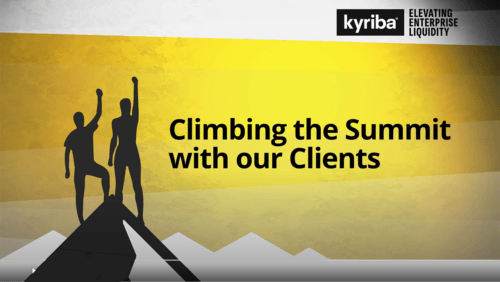 Videos, Success StoriesKyriba Customer Testimonials: Climbing the Summit with Our ClientsHear first-hand from Kyriba clients how treasury transformation was realized through Kyriba’s innovation, technology and support. Treasury leaders at Specialized Bicycle Components, HealthCare Services Corporation, Cenveo Worldwide, Koch Industries, and LifeSpace Communities share their...Watch the video
Videos, Success StoriesKyriba Customer Testimonials: Climbing the Summit with Our ClientsHear first-hand from Kyriba clients how treasury transformation was realized through Kyriba’s innovation, technology and support. Treasury leaders at Specialized Bicycle Components, HealthCare Services Corporation, Cenveo Worldwide, Koch Industries, and LifeSpace Communities share their...Watch the video -
 Webinars, Thought LeadershipHybrid Dynamic Discounting: Creating a True Win-Win for You and Your SuppliersIn this session you will learn the importance of giving suppliers access to liquidity on a consistent basis, particularly when we’re seeing constant disruption in the supply chain. While Dynamic Discounting can be a...View Recording
Webinars, Thought LeadershipHybrid Dynamic Discounting: Creating a True Win-Win for You and Your SuppliersIn this session you will learn the importance of giving suppliers access to liquidity on a consistent basis, particularly when we’re seeing constant disruption in the supply chain. While Dynamic Discounting can be a...View Recording -
 WebinarsSupercharge Your Bank Onboarding ExperienceIn this session you will learn how to supercharge your bank onboarding experience with our speakers providing input from the Client, Implementation and Technology sides of the puzzle. Learn how to leverage Kyriba’s capabilities...View Recording
WebinarsSupercharge Your Bank Onboarding ExperienceIn this session you will learn how to supercharge your bank onboarding experience with our speakers providing input from the Client, Implementation and Technology sides of the puzzle. Learn how to leverage Kyriba’s capabilities...View Recording -
 PodcastsEpisode 21: The Impacts of Faster Payments in FinanceThis is a special episode focused on payments. We’re getting inside the minds of top CFOs and Treasurers to find out how they’re handling payments in this ever-changing financial landscape. We’ll hear from Reed Luhtanen, Executive Director of the U.S. Faster Payments Council, Katherine Edenbach, CFO at Emburse, Benjamin Seal, Vice President of Treasury Services at Cenveo, and more, including some bonus content from Michelle Richardson, SVP and CFO at Plaza Home Mortgages.Listen to the Podcast
PodcastsEpisode 21: The Impacts of Faster Payments in FinanceThis is a special episode focused on payments. We’re getting inside the minds of top CFOs and Treasurers to find out how they’re handling payments in this ever-changing financial landscape. We’ll hear from Reed Luhtanen, Executive Director of the U.S. Faster Payments Council, Katherine Edenbach, CFO at Emburse, Benjamin Seal, Vice President of Treasury Services at Cenveo, and more, including some bonus content from Michelle Richardson, SVP and CFO at Plaza Home Mortgages.Listen to the Podcast -
 Research, Currency Impact ReportsKyriba’s May 2022 Currency Impact ReportA Quarterly Report Assessing the Impact of Foreign Exchange to North American and European Corporate Earnings About the Report The May 2022 Kyriba Currency Impact Report analyzes the reported effects of currencies to North...Read the Report
Research, Currency Impact ReportsKyriba’s May 2022 Currency Impact ReportA Quarterly Report Assessing the Impact of Foreign Exchange to North American and European Corporate Earnings About the Report The May 2022 Kyriba Currency Impact Report analyzes the reported effects of currencies to North...Read the Report -
 Fact SheetsKyriba Premium SupportKyriba Premium Support provides a more advanced level support for Kyriba clients looking to further enhance the user experience and receive proactive response to support issues. The primary features of Premium Support is the...Read the fact sheet
Fact SheetsKyriba Premium SupportKyriba Premium Support provides a more advanced level support for Kyriba clients looking to further enhance the user experience and receive proactive response to support issues. The primary features of Premium Support is the...Read the fact sheet -
 PodcastsEpisode 20: CFOs as Agents of ChangeThis episode features an interview with Aneal Vallurupalli, CFO at Airbase, talking to The Invisible Vault host Daniel Shaffer, Senior Manager, Global Digital Communications & Public Relations at Kyriba. Aneal addresses the impact that the pandemic had on the finance world, the importance of holistic data in finance, as well as how the current role of the CFO is changing.Listen to the Podcast
PodcastsEpisode 20: CFOs as Agents of ChangeThis episode features an interview with Aneal Vallurupalli, CFO at Airbase, talking to The Invisible Vault host Daniel Shaffer, Senior Manager, Global Digital Communications & Public Relations at Kyriba. Aneal addresses the impact that the pandemic had on the finance world, the importance of holistic data in finance, as well as how the current role of the CFO is changing.Listen to the Podcast -
 Fact SheetsPreventing State and Local Government Payments FraudPreventing State and Local Government Payments FraudRead the fact sheet
Fact SheetsPreventing State and Local Government Payments FraudPreventing State and Local Government Payments FraudRead the fact sheet -
 Webinars, Thought LeadershipProactive Threat Defense for Liquidity and PaymentsUp to 90% of CFOs and CIOs report payments and financial fraud attempts, and cyber threats are growing more complex with intelligent technology. That makes proactive fraud detection and response programs a top priority...View Recording
Webinars, Thought LeadershipProactive Threat Defense for Liquidity and PaymentsUp to 90% of CFOs and CIOs report payments and financial fraud attempts, and cyber threats are growing more complex with intelligent technology. That makes proactive fraud detection and response programs a top priority...View Recording -
 Success StoriesDana-Farber Cancer Institute Achieves 83% Productivity Improvements and $925K in Annual Value RealizedDana Farber Cancer Institute implemented Kyriba after years of operating cash management and accounting in an ad hoc manner: Doing what was necessary but relying on significant manual processes and disparate systems. Behind their...Read the success story
Success StoriesDana-Farber Cancer Institute Achieves 83% Productivity Improvements and $925K in Annual Value RealizedDana Farber Cancer Institute implemented Kyriba after years of operating cash management and accounting in an ad hoc manner: Doing what was necessary but relying on significant manual processes and disparate systems. Behind their...Read the success story -
 Success Stories, Mid-Market ResourcesWalker & Dunlop Reaches Peak Performance with Kyriba Visibility and Payments Factory“I am awed by how much my company is benefiting from Kyriba and how much we have accomplished since going live. Kyriba’s ability to automatically load our BAI files directly from the banks has...Read the success story
Success Stories, Mid-Market ResourcesWalker & Dunlop Reaches Peak Performance with Kyriba Visibility and Payments Factory“I am awed by how much my company is benefiting from Kyriba and how much we have accomplished since going live. Kyriba’s ability to automatically load our BAI files directly from the banks has...Read the success story -
 PodcastsEpisode 19: Creating Impact with AI, Automation and EmpowermentThis episode features an interview with Maarika Paul, Executive Vice President and Chief Financial and Operations Officer at Caisse de Dépôt et Placement du Québec (CDPQ), talking to The Invisible Vault host Daniel Shaffer, Senior Manager, Global Digital Communications & Public Relations at Kyriba. Maarika addresses overcoming adversity as a woman in finance, deploying new investment strategies for CDPQ with net assets totalling over CA$365.5 billion, and discusses the implementation of AI and augmentation for financial analyses in the future.Listen to the Podcast
PodcastsEpisode 19: Creating Impact with AI, Automation and EmpowermentThis episode features an interview with Maarika Paul, Executive Vice President and Chief Financial and Operations Officer at Caisse de Dépôt et Placement du Québec (CDPQ), talking to The Invisible Vault host Daniel Shaffer, Senior Manager, Global Digital Communications & Public Relations at Kyriba. Maarika addresses overcoming adversity as a woman in finance, deploying new investment strategies for CDPQ with net assets totalling over CA$365.5 billion, and discusses the implementation of AI and augmentation for financial analyses in the future.Listen to the Podcast -
 Success StoriesBaxter: Utilizing Dashboards to Elevate VisibilityFor nearly a century, Baxter has been at the critical intersection of saving and sustaining lives, driven by innovation to transform global healthcare. With global operations in over 35 countries, Baxter put Kyriba to...Read the success story
Success StoriesBaxter: Utilizing Dashboards to Elevate VisibilityFor nearly a century, Baxter has been at the critical intersection of saving and sustaining lives, driven by innovation to transform global healthcare. With global operations in over 35 countries, Baxter put Kyriba to...Read the success story -
 Fact SheetsWorking Capital OptimizationWorking Capital Optimization is a strategic objective for CFOs as they fight to generate bottom line value and generate free cash flow. Kyriba offers CFOs two compelling benefits: the ability to improve working capital, as well as the opportunity to increase net income.Read the fact sheet
Fact SheetsWorking Capital OptimizationWorking Capital Optimization is a strategic objective for CFOs as they fight to generate bottom line value and generate free cash flow. Kyriba offers CFOs two compelling benefits: the ability to improve working capital, as well as the opportunity to increase net income.Read the fact sheet -
 Mid-Market Resources, Fact SheetsKyriba for Midsize CompaniesKyriba for Midsize Companies is a scalable solution for companies looking to eliminate their manual and errorprone spreadsheet-based cash management program and replace it with an automated, easy-to-use system. With a cost-controlled approach and...Read More
Mid-Market Resources, Fact SheetsKyriba for Midsize CompaniesKyriba for Midsize Companies is a scalable solution for companies looking to eliminate their manual and errorprone spreadsheet-based cash management program and replace it with an automated, easy-to-use system. With a cost-controlled approach and...Read More -
 Fact SheetsKyriba MarketplaceKyriba helps companies manage their liquidity, through a unified set of innovative products across treasury, risk, payments, working capital and connectivity. The Kyriba Marketplace is an API-driven global liquidity network offering apps, data and...Read the fact sheet
Fact SheetsKyriba MarketplaceKyriba helps companies manage their liquidity, through a unified set of innovative products across treasury, risk, payments, working capital and connectivity. The Kyriba Marketplace is an API-driven global liquidity network offering apps, data and...Read the fact sheet -
 Success StoriesBASF’s Creation of a Universal FX Program with Kyriba RiskBASF creates chemistry for a sustainable future. They combine economic success with environmental protection and social responsibility. “With Kyriba, we implemented a tool that helped us achieve visibility into our global currency risk and...Read the success story
Success StoriesBASF’s Creation of a Universal FX Program with Kyriba RiskBASF creates chemistry for a sustainable future. They combine economic success with environmental protection and social responsibility. “With Kyriba, we implemented a tool that helped us achieve visibility into our global currency risk and...Read the success story -
 Fact SheetsKyriba Payments Fraud Detection SolutionPayments fraud continues to be a top concern for organizations. According to a recent US companies and B2B payment fraud survey report published by Trustpair and Giact, 56% of US companies were targeted by...Read the fact sheet
Fact SheetsKyriba Payments Fraud Detection SolutionPayments fraud continues to be a top concern for organizations. According to a recent US companies and B2B payment fraud survey report published by Trustpair and Giact, 56% of US companies were targeted by...Read the fact sheet -
 WebinarsBitesize Webinar: With Real-time Treasury Start Your Day with 100% Cash Visibility & Data-Driven ForecastingHaving clarity and visibility into cash and liquidity is a fundamental requirement for any treasury department. Without that, it is nearly impossible to support critical financial decisions and strategic business objectives. Kyriba delivers timely...View Recording
WebinarsBitesize Webinar: With Real-time Treasury Start Your Day with 100% Cash Visibility & Data-Driven ForecastingHaving clarity and visibility into cash and liquidity is a fundamental requirement for any treasury department. Without that, it is nearly impossible to support critical financial decisions and strategic business objectives. Kyriba delivers timely...View Recording -
 PodcastsEpisode 18: How Advanced Technologies are Driving Business ResiliencyThis episode features an interview with Kevin Permenter, Research Director at IDC, talking to The Invisible Vault host Daniel Shaffer, Senior Manager, Global Digital Communications & Public Relations at Kyriba. Kevin discusses improving the efficiency of data management, getting actionable insights at near real time, and building resiliency of your business.Listen to the Podcast
PodcastsEpisode 18: How Advanced Technologies are Driving Business ResiliencyThis episode features an interview with Kevin Permenter, Research Director at IDC, talking to The Invisible Vault host Daniel Shaffer, Senior Manager, Global Digital Communications & Public Relations at Kyriba. Kevin discusses improving the efficiency of data management, getting actionable insights at near real time, and building resiliency of your business.Listen to the Podcast -
 eBooks, Thought LeadershipPayments Fraud Detection in an Escalating Threat EnvironmentModern fraud threats are innovative and constantly evolving. To confront these threats, organizations that want to survive need to deploy the most up‑to-date detection and prevention solutions.Read the eBook
eBooks, Thought LeadershipPayments Fraud Detection in an Escalating Threat EnvironmentModern fraud threats are innovative and constantly evolving. To confront these threats, organizations that want to survive need to deploy the most up‑to-date detection and prevention solutions.Read the eBook -
 Fact SheetsLaunching Kyriba AcademyKyriba is committed to providing clients with the knowledge, skills and best practices to maximize their Kyriba educational experience. Kyriba Academy offers a series of different training courses that allow users the flexibility to customize their own learning journey.Read the fact sheet
Fact SheetsLaunching Kyriba AcademyKyriba is committed to providing clients with the knowledge, skills and best practices to maximize their Kyriba educational experience. Kyriba Academy offers a series of different training courses that allow users the flexibility to customize their own learning journey.Read the fact sheet -
 Success StoriesBest in Class Treasury Solution in the PRC Aihuishou International Company LtdTechnology platform is key to support rapid growth in the PRCRead the success story
Success StoriesBest in Class Treasury Solution in the PRC Aihuishou International Company LtdTechnology platform is key to support rapid growth in the PRCRead the success story -
 eBooksTips for Remote Treasury Management System ImplementationsRemote Treasury Management System implementations are possible with proper planning, organization, and understanding. Depending on the scope and stakeholder groups involved, they can also be complex with multiple moving parts. The organizations that have the...Read the eBook
eBooksTips for Remote Treasury Management System ImplementationsRemote Treasury Management System implementations are possible with proper planning, organization, and understanding. Depending on the scope and stakeholder groups involved, they can also be complex with multiple moving parts. The organizations that have the...Read the eBook -
 Fact SheetsUtilities: Managing Liquidity in an Evolving IndustryUtilities in North America are undergoing a period of rapid change that is presenting new challenges and opportunities. As utilities’ needs evolve, so too must traditionally labor-intensive treasury and cash management processes. With advancements...Read the fact sheet
Fact SheetsUtilities: Managing Liquidity in an Evolving IndustryUtilities in North America are undergoing a period of rapid change that is presenting new challenges and opportunities. As utilities’ needs evolve, so too must traditionally labor-intensive treasury and cash management processes. With advancements...Read the fact sheet -
 PodcastsEpisode 17: How to Build a Strategic Technology Solution for Modern Finance LeadersThis is a special episode featuring an interview with Thomas Gavaghan, the Vice President of Global Pre-Sales at Kyriba talking to The Invisible Vault host Daniel Shaffer, Senior Manager, Global Digital Communications & Public Relations at Kyriba. Tom and host Daniel Shaffer discuss two key topics: Payments and Visibility. Together, they look back at what previous guests have said about the topics, including Reed Luhtanen, Executive Director of the U.S. Faster Payments Council, Laurie Krebs, SVP and CFO at Red Hat, Danielle Murcray, CFO at AttackIQ, and Benjamin Seal, VP of Treasury Services at Cenveo.Listen to the Podcast
PodcastsEpisode 17: How to Build a Strategic Technology Solution for Modern Finance LeadersThis is a special episode featuring an interview with Thomas Gavaghan, the Vice President of Global Pre-Sales at Kyriba talking to The Invisible Vault host Daniel Shaffer, Senior Manager, Global Digital Communications & Public Relations at Kyriba. Tom and host Daniel Shaffer discuss two key topics: Payments and Visibility. Together, they look back at what previous guests have said about the topics, including Reed Luhtanen, Executive Director of the U.S. Faster Payments Council, Laurie Krebs, SVP and CFO at Red Hat, Danielle Murcray, CFO at AttackIQ, and Benjamin Seal, VP of Treasury Services at Cenveo.Listen to the Podcast -
 Webinars, Thought LeadershipTreasury Opportunities in Strategic Cash ForecastingThroughout the COVID-19 pandemic, treasury teams have found themselves heavily focused on short-term forecasting in an effort to maintain cash flow. As companies now extend their planning horizons, they are relying on longer-term, strategic...View Recording
Webinars, Thought LeadershipTreasury Opportunities in Strategic Cash ForecastingThroughout the COVID-19 pandemic, treasury teams have found themselves heavily focused on short-term forecasting in an effort to maintain cash flow. As companies now extend their planning horizons, they are relying on longer-term, strategic...View Recording -
 Fact SheetsSecuring Your Treasury with KyribaWith fraud and cyberattacks increasing in both frequency and sophistication, it is important to partner with Kyriba. With a proven track record over more than 20 years in Treasury and Finance cloud SaaS solutions, our extensive, advanced protection for your data, security, controls and your operational processes will keep your firm protected.Read the fact sheet
Fact SheetsSecuring Your Treasury with KyribaWith fraud and cyberattacks increasing in both frequency and sophistication, it is important to partner with Kyriba. With a proven track record over more than 20 years in Treasury and Finance cloud SaaS solutions, our extensive, advanced protection for your data, security, controls and your operational processes will keep your firm protected.Read the fact sheet -
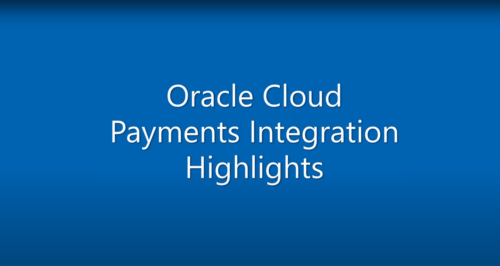 VideosOracle Cloud Payments Integration Highlights VideoKyriba solution for Oracle Cloud Payments Integration simplifies Oracle Payments and multi-bank connectivity. The Kyriba Payments Network offers a centralized approach to payment activities that fully manages bank connectivity and supports more than 1,000...Watch the video
VideosOracle Cloud Payments Integration Highlights VideoKyriba solution for Oracle Cloud Payments Integration simplifies Oracle Payments and multi-bank connectivity. The Kyriba Payments Network offers a centralized approach to payment activities that fully manages bank connectivity and supports more than 1,000...Watch the video -
 Fact SheetsPublic Sector: Treasury Management & Bank Connectivity SolutionsTreasury and Payment Management for Government Agencies Kyriba empowers government agencies to achieve 100% daily cash visibility, accurate and flexible cash forecasting, debt & investment management, business intelligence, fully-managed bank connectivity, and fraud detection...Read the fact sheet
Fact SheetsPublic Sector: Treasury Management & Bank Connectivity SolutionsTreasury and Payment Management for Government Agencies Kyriba empowers government agencies to achieve 100% daily cash visibility, accurate and flexible cash forecasting, debt & investment management, business intelligence, fully-managed bank connectivity, and fraud detection...Read the fact sheet -
 Mid-Market Resources, Fact SheetsMid-Market and Small Companies (SMEs) Fuel Sustainable Growth with Supply Chain FinanceCrucial Role of SMEs for Global Economic Development With Supply Chain issues creating shortages across the globe, it is more and more evident that SMEs impact economic development for a broad spectrum of countries....Read More
Mid-Market Resources, Fact SheetsMid-Market and Small Companies (SMEs) Fuel Sustainable Growth with Supply Chain FinanceCrucial Role of SMEs for Global Economic Development With Supply Chain issues creating shortages across the globe, it is more and more evident that SMEs impact economic development for a broad spectrum of countries....Read More -
 eBooks, Thought LeadershipPayment Health Checks to Protect Against Payments FraudRecent data has shown that payment fraud incidents are not slated to decrease anytime soon, so now is the time to future-proof your organization’s processes by building effective fraud prevention controls into your workflows....Read the eBook
eBooks, Thought LeadershipPayment Health Checks to Protect Against Payments FraudRecent data has shown that payment fraud incidents are not slated to decrease anytime soon, so now is the time to future-proof your organization’s processes by building effective fraud prevention controls into your workflows....Read the eBook -
 Fact SheetsKyriba Bank Connectivity CockpitBank Connectivity and Balance Monitoring in One Powerful Dashboard Finance teams rely upon critical daily banking information for insight into cash and liquidity. Yet monitoring bank connection status, variance troubleshooting and reconciliations between bank/cash...Read the fact sheet
Fact SheetsKyriba Bank Connectivity CockpitBank Connectivity and Balance Monitoring in One Powerful Dashboard Finance teams rely upon critical daily banking information for insight into cash and liquidity. Yet monitoring bank connection status, variance troubleshooting and reconciliations between bank/cash...Read the fact sheet -
 Success Stories, Mid-Market ResourcesBray International Realizes 100% Cash Visibility and 97% Productivity Gains“Kyriba provided a great tool that allowed us to delever nearly 30% just by knowing where our cash was, where it was needed, and getting it there in the most efficient manner, eliminating needless...Read the success story
Success Stories, Mid-Market ResourcesBray International Realizes 100% Cash Visibility and 97% Productivity Gains“Kyriba provided a great tool that allowed us to delever nearly 30% just by knowing where our cash was, where it was needed, and getting it there in the most efficient manner, eliminating needless...Read the success story -
 Fact SheetsKyriba Financial Transactions ModulesKyriba’s Financial Transactions modules support the tracking and management of investment, debt, interest rate derivatives, foreign exchange and commodities transactions.Read the fact sheet
Fact SheetsKyriba Financial Transactions ModulesKyriba’s Financial Transactions modules support the tracking and management of investment, debt, interest rate derivatives, foreign exchange and commodities transactions.Read the fact sheet -
 Success StoriesLifespace Communities Sees Immediate and Significant Savings with Kyriba“Where we have already seen a significant time-savings has been the payments module. In just a few months, having all the feeds into the system from various banks and ERPs, and automatically creating reports...Read the success story
Success StoriesLifespace Communities Sees Immediate and Significant Savings with Kyriba“Where we have already seen a significant time-savings has been the payments module. In just a few months, having all the feeds into the system from various banks and ERPs, and automatically creating reports...Read the success story -
 Webinars, Thought LeadershipDTMidstream’s Treasury Transformation: Automation, Centralization, and VisibilityTuesday, May 10 | 9:00am PT | 12:00pm ET | DTMidstream, a midwest-based operator and developer of natural gas and midstream interstate pipelines, carved out a treasury business unit along with two major hurdles:...View Recording
Webinars, Thought LeadershipDTMidstream’s Treasury Transformation: Automation, Centralization, and VisibilityTuesday, May 10 | 9:00am PT | 12:00pm ET | DTMidstream, a midwest-based operator and developer of natural gas and midstream interstate pipelines, carved out a treasury business unit along with two major hurdles:...View Recording -
 Fact SheetsThe Kyriba and BlackLine PartnershipThe Kyriba and BlackLine partnership delivers customers greater cash visibility and reporting capabilities from the bank all the way to the general ledger. Our customers benefit from this partnership through enhanced, automated bank and treasury reporting delivering access to better information.Read the fact sheet
Fact SheetsThe Kyriba and BlackLine PartnershipThe Kyriba and BlackLine partnership delivers customers greater cash visibility and reporting capabilities from the bank all the way to the general ledger. Our customers benefit from this partnership through enhanced, automated bank and treasury reporting delivering access to better information.Read the fact sheet -
 PodcastsEpisode 16: Optimizing Liquidity through Digital TransformationThis episode features an interview with Benjamin Seal, Vice President of Treasury Services at Cenveo talking to The Invisible Vault host Daniel Shaffer, Senior Manager, Global Digital Communications & Public Relations at Kyriba. Benjamin discusses how he uses digital approaches within treasury to become a strategic business partner across an organization at all levels and being able to stay forward focused at ensuring Cenveo has the capital needed to manage day to day operations.Listen to the Podcast
PodcastsEpisode 16: Optimizing Liquidity through Digital TransformationThis episode features an interview with Benjamin Seal, Vice President of Treasury Services at Cenveo talking to The Invisible Vault host Daniel Shaffer, Senior Manager, Global Digital Communications & Public Relations at Kyriba. Benjamin discusses how he uses digital approaches within treasury to become a strategic business partner across an organization at all levels and being able to stay forward focused at ensuring Cenveo has the capital needed to manage day to day operations.Listen to the Podcast -
 Success StoriesKoch Industries: Using Technology to Drive Treasury Transformation for Global Cash VisibilityHow one of America’s largest privately held companies put Kyriba technology to work to centralize Treasury functions and achieve strategic level maturity.Read the success story
Success StoriesKoch Industries: Using Technology to Drive Treasury Transformation for Global Cash VisibilityHow one of America’s largest privately held companies put Kyriba technology to work to centralize Treasury functions and achieve strategic level maturity.Read the success story -
 Fact SheetsKyriba Lease AccountingWith lease accounting standards fast approaching, treasury and accounting teams are faced with significant manual effort to identify, track, account for, and audit leases to meet international accounting standards like IFRS16. Kyriba can help...Read the fact sheet
Fact SheetsKyriba Lease AccountingWith lease accounting standards fast approaching, treasury and accounting teams are faced with significant manual effort to identify, track, account for, and audit leases to meet international accounting standards like IFRS16. Kyriba can help...Read the fact sheet -
 Fact SheetsKyriba Bank Connectivity as a ServiceIntroducing Kyriba’s Bank Connectivity as a Service (BCaaS) for financial institutions. Kyriba is offering and expanding our market-leading, proven solution directly to our banking partners. As bank clients continue to invest heavily in state-of-the-art...Read the fact sheet
Fact SheetsKyriba Bank Connectivity as a ServiceIntroducing Kyriba’s Bank Connectivity as a Service (BCaaS) for financial institutions. Kyriba is offering and expanding our market-leading, proven solution directly to our banking partners. As bank clients continue to invest heavily in state-of-the-art...Read the fact sheet -
 Fact SheetsKyriba PaymentsThe Kyriba Payments solution centralizes and standardizes company-wide payment workflows to enhance both controls and efficiencies with task automation, error management, fraud detection and full status visibility, all integrated in one payment hub.Read the fact sheet
Fact SheetsKyriba PaymentsThe Kyriba Payments solution centralizes and standardizes company-wide payment workflows to enhance both controls and efficiencies with task automation, error management, fraud detection and full status visibility, all integrated in one payment hub.Read the fact sheet -
 PodcastsEpisode 15: Assessing Risk Through Data-Driven InsightsThis episode features an interview with Danielle Murcray, CFO at AttackIQ talking to The Invisible Vault host Daniel Shaffer, Senior Manager, Global Digital Communications & Public Relations at Kyriba. Danielle addresses building relationships with CEOs, tackling cybersecurity and fraud, as well as assessing and managing risk as a CFO in a pandemic world.Listen to the Podcast
PodcastsEpisode 15: Assessing Risk Through Data-Driven InsightsThis episode features an interview with Danielle Murcray, CFO at AttackIQ talking to The Invisible Vault host Daniel Shaffer, Senior Manager, Global Digital Communications & Public Relations at Kyriba. Danielle addresses building relationships with CEOs, tackling cybersecurity and fraud, as well as assessing and managing risk as a CFO in a pandemic world.Listen to the Podcast -
 Webinars, Thought LeadershipCorporate Treasury’s Adoption of Real-Time, Instant PaymentsReal-Time, Instant and Faster Payments are taking shape and are being adopted by corporate treasurers and revamping their business models. Discover the benefits of use cases and adoption, innovation unlocked through messaging and data...View Recording
Webinars, Thought LeadershipCorporate Treasury’s Adoption of Real-Time, Instant PaymentsReal-Time, Instant and Faster Payments are taking shape and are being adopted by corporate treasurers and revamping their business models. Discover the benefits of use cases and adoption, innovation unlocked through messaging and data...View Recording -
 Webinars, Thought LeadershipTreasury’s Checklist for Oracle Cloud MigrationsUnbeknownst to the majority of IT & technology teams migrating to Oracle Cloud, bank connectivity looms as the most difficult part of the migration, according to 91% of IT leaders that have (Pulse survey).View Recording
Webinars, Thought LeadershipTreasury’s Checklist for Oracle Cloud MigrationsUnbeknownst to the majority of IT & technology teams migrating to Oracle Cloud, bank connectivity looms as the most difficult part of the migration, according to 91% of IT leaders that have (Pulse survey).View Recording -
 Webinars, Thought LeadershipThe Real Costs of Spreadsheet Reliance in TreasuryVery often, treasurers and members of the finance organization are overly relying on spreadsheets. While spreadsheets will always have a place and purpose in all areas of an enterprise, Kyriba has numerated the return...View Recording
Webinars, Thought LeadershipThe Real Costs of Spreadsheet Reliance in TreasuryVery often, treasurers and members of the finance organization are overly relying on spreadsheets. While spreadsheets will always have a place and purpose in all areas of an enterprise, Kyriba has numerated the return...View Recording -
 Webinars, Thought LeadershipTreasury for Real Estate: DigitalBridge’s StoryFew industries reflect the economic picture like the real estate sector. This particular industry relies on its treasury and finance teams and technology to handle challenging scenarios with typically smaller teams. Companies like DigitalBridge...View Recording
Webinars, Thought LeadershipTreasury for Real Estate: DigitalBridge’s StoryFew industries reflect the economic picture like the real estate sector. This particular industry relies on its treasury and finance teams and technology to handle challenging scenarios with typically smaller teams. Companies like DigitalBridge...View Recording -
 PodcastsEpisode 14: How CFOs Drive Strategy and Manage UncertaintyThis episode features an interview with Laurie Krebs, CFO at Red Hat talking to The Invisible Vault host Daniel Shaffer, Senior Manager, Global Digital Communications & Public Relations at Kyriba. Laurie discusses supporting other women in finance, developing a business continuity plan, and working to lead the world in the way of the hybrid cloud.Listen to the Podcast
PodcastsEpisode 14: How CFOs Drive Strategy and Manage UncertaintyThis episode features an interview with Laurie Krebs, CFO at Red Hat talking to The Invisible Vault host Daniel Shaffer, Senior Manager, Global Digital Communications & Public Relations at Kyriba. Laurie discusses supporting other women in finance, developing a business continuity plan, and working to lead the world in the way of the hybrid cloud.Listen to the Podcast -
 Research, Currency Impact ReportsKyriba’s January 2022 Currency Impact ReportKyriba’s Currency Impact Report (CIR), a comprehensive report detailing the impacts of foreign exchange (FX) exposures among 1,200 multinational companies based in North America and Europe, revealed $12 billion in total impacts to earnings...Read the Report
Research, Currency Impact ReportsKyriba’s January 2022 Currency Impact ReportKyriba’s Currency Impact Report (CIR), a comprehensive report detailing the impacts of foreign exchange (FX) exposures among 1,200 multinational companies based in North America and Europe, revealed $12 billion in total impacts to earnings...Read the Report -
 WebinarsBitesize Webinar: Making Real-Time Payments a Reality for Finance and TreasuryReal-time payments are a game changer for many corporate finance teams who require more choices in how they send payments. It provides finance executives with more payment choices, easier reconciliation of transactions and greater...View Recording
WebinarsBitesize Webinar: Making Real-Time Payments a Reality for Finance and TreasuryReal-time payments are a game changer for many corporate finance teams who require more choices in how they send payments. It provides finance executives with more payment choices, easier reconciliation of transactions and greater...View Recording -
 Webinars, Thought LeadershipUntapped Working Capital at Emerging EnterprisesNow more than ever, it is easy and achievable for companies of all sizes to roll out successful supply chain finance programs. Historically, this has not been the case, as buyers had to be...View Recording
Webinars, Thought LeadershipUntapped Working Capital at Emerging EnterprisesNow more than ever, it is easy and achievable for companies of all sizes to roll out successful supply chain finance programs. Historically, this has not been the case, as buyers had to be...View Recording -
 Webinars, Thought LeadershipHow to Implement a Best-in-Class Balance Sheet Exposure Management ProgramVisibility, transparency, and details of data that can be shared with the CFO, and greater finance organization, are critical for foreign exchange risk management, particularly in the unpredictable currency markets corporate risk managers must...View Recording
Webinars, Thought LeadershipHow to Implement a Best-in-Class Balance Sheet Exposure Management ProgramVisibility, transparency, and details of data that can be shared with the CFO, and greater finance organization, are critical for foreign exchange risk management, particularly in the unpredictable currency markets corporate risk managers must...View Recording -
 Fact SheetsKyriba Balance Sheet Exposure ReportingKyriba Exposure Reporting is a cloud-based currency exposure management platform that enables treasury professionals to measure, monitor and manage currency exposure and the associated risk from their balance sheet. Streamline and automate your end-to-end...Read the fact sheet
Fact SheetsKyriba Balance Sheet Exposure ReportingKyriba Exposure Reporting is a cloud-based currency exposure management platform that enables treasury professionals to measure, monitor and manage currency exposure and the associated risk from their balance sheet. Streamline and automate your end-to-end...Read the fact sheet -
 Fact SheetsDelivering Technology Leadership for Your Transaction Banking ServicesExpand Your Banking Products and Services for Treasury, Payments, Connectivity, and Working Capital with Kyriba White-label Services for Banks. Trusted by more than 2,500 customers, Kyriba White-label Services for Banks delivers value and expanded...Read the fact sheet
Fact SheetsDelivering Technology Leadership for Your Transaction Banking ServicesExpand Your Banking Products and Services for Treasury, Payments, Connectivity, and Working Capital with Kyriba White-label Services for Banks. Trusted by more than 2,500 customers, Kyriba White-label Services for Banks delivers value and expanded...Read the fact sheet -
 Fact SheetsKyriba Enterprise ConnectivityKyriba’s in-house, leading Enterprise Connectivity as a Service gives our customers a complete connectivity solution encompassing ERPs, internal financial systems, third party providers, and over 1,000 out-of-the-box, pre-configured, pre-tested connections with financial institutions across the globe.Read the fact sheet
Fact SheetsKyriba Enterprise ConnectivityKyriba’s in-house, leading Enterprise Connectivity as a Service gives our customers a complete connectivity solution encompassing ERPs, internal financial systems, third party providers, and over 1,000 out-of-the-box, pre-configured, pre-tested connections with financial institutions across the globe.Read the fact sheet -
 Webinars, Thought LeadershipStarter’s Guide to Treasury Management SystemsGrowing companies with often small treasury teams are still lagging behind the rest of the finance department, managing cash & liquidity on spreadsheets or treasury workstations. These treasury teams are not only losing productivity...View Recording
Webinars, Thought LeadershipStarter’s Guide to Treasury Management SystemsGrowing companies with often small treasury teams are still lagging behind the rest of the finance department, managing cash & liquidity on spreadsheets or treasury workstations. These treasury teams are not only losing productivity...View Recording -
 Fact SheetsKyriba Cross-Border PaymentsTransform how you pay foreign currency payments for greater transparency and control. Kyriba and Standard Chartered Bank transform how their customers make cross-border payments. A unified, robust payments process provides greater visibility of transaction...Read the fact sheet
Fact SheetsKyriba Cross-Border PaymentsTransform how you pay foreign currency payments for greater transparency and control. Kyriba and Standard Chartered Bank transform how their customers make cross-border payments. A unified, robust payments process provides greater visibility of transaction...Read the fact sheet -
 Fact SheetsKyriba LIBOR Fallback Rate CalculationSome tenors of LIBOR will continue to be produced on an unrepresentative, ‘synthetic’ basis, however, contractually, fallback rates will still apply. The new fallback rate may be higher or lower than LIBOR and may...Read the fact sheet
Fact SheetsKyriba LIBOR Fallback Rate CalculationSome tenors of LIBOR will continue to be produced on an unrepresentative, ‘synthetic’ basis, however, contractually, fallback rates will still apply. The new fallback rate may be higher or lower than LIBOR and may...Read the fact sheet -
 Webinars, Thought LeadershipLibor Expiring: What Do We Do?On January 1st 2022, many tenors of LIBOR will cease and banks will likely start providing updated payment notices. Any new lending is not expected to be on LIBOR, even where LIBOR has been...View Recording
Webinars, Thought LeadershipLibor Expiring: What Do We Do?On January 1st 2022, many tenors of LIBOR will cease and banks will likely start providing updated payment notices. Any new lending is not expected to be on LIBOR, even where LIBOR has been...View Recording -
 Webinars, Thought LeadershipHealthcare Best Practices for Treasury TransformationIt is particularly difficult in the healthcare industry, from hospitals to managed health services, to complete digital transformation, due to the unique issues of cash forecasting, data visualization & reporting, management of debt instruments,...View Recording
Webinars, Thought LeadershipHealthcare Best Practices for Treasury TransformationIt is particularly difficult in the healthcare industry, from hospitals to managed health services, to complete digital transformation, due to the unique issues of cash forecasting, data visualization & reporting, management of debt instruments,...View Recording -
 Webinars, Thought LeadershipEnhancing KYC ComplianceEach party to a financial transaction needs to know with whom it is doing business. As scrutiny of these transactions increases, know-your-customer (KYC) compliance has only gotten more difficult to navigate.View Recording
Webinars, Thought LeadershipEnhancing KYC ComplianceEach party to a financial transaction needs to know with whom it is doing business. As scrutiny of these transactions increases, know-your-customer (KYC) compliance has only gotten more difficult to navigate.View Recording -
 WebinarsHow can we get real-time cash visibility with a payments project?Last year saw a tsunami of change in payment processes around the world. However, this change in payments and connectivity doesn’t come without its challenges. Managing risk from execution, technology and payments, the cost...View Recording
WebinarsHow can we get real-time cash visibility with a payments project?Last year saw a tsunami of change in payment processes around the world. However, this change in payments and connectivity doesn’t come without its challenges. Managing risk from execution, technology and payments, the cost...View Recording -
 Webinars, Thought LeadershipMitigating Supply Chain Risk: Best Practices by CFOs and Treasurers2021 has delivered a new risk for CFOs and Treasurers to manage: Supply Chain Disruption. From wrong turns in the Suez canal to the Covid-impact on seaports to weather impacts on rail and trucking...View Recording
Webinars, Thought LeadershipMitigating Supply Chain Risk: Best Practices by CFOs and Treasurers2021 has delivered a new risk for CFOs and Treasurers to manage: Supply Chain Disruption. From wrong turns in the Suez canal to the Covid-impact on seaports to weather impacts on rail and trucking...View Recording -
 Webinars, Thought LeadershipPayments Hub 101: Consolidated and SecurePayments remain a constant focus for CFOs, CIOs, controllers, purchasing managers, and treasurers, as inefficient payment processes can inhibit supply chains, cash flow and profitability. The recent push to optimize cash and working capital,...View Recording
Webinars, Thought LeadershipPayments Hub 101: Consolidated and SecurePayments remain a constant focus for CFOs, CIOs, controllers, purchasing managers, and treasurers, as inefficient payment processes can inhibit supply chains, cash flow and profitability. The recent push to optimize cash and working capital,...View Recording -
 eBooksApplying Lean Manufacturing Principles to Improve FX Risk ManagementApplying Principles of Quality and Efficiency from the Manufacturing World to Treasury and Finance to Achieve More Efficient FX Risk Management. One of the principal tenets of Lean is a focus on customer value. Activities that do not have a direct bearing on the value of the product or end result are targeted for elimination. Our customers, using our platform and Lean principles work to transition their foreign currency related systems and processes to create greater automation and efficiency.Read the eBook
eBooksApplying Lean Manufacturing Principles to Improve FX Risk ManagementApplying Principles of Quality and Efficiency from the Manufacturing World to Treasury and Finance to Achieve More Efficient FX Risk Management. One of the principal tenets of Lean is a focus on customer value. Activities that do not have a direct bearing on the value of the product or end result are targeted for elimination. Our customers, using our platform and Lean principles work to transition their foreign currency related systems and processes to create greater automation and efficiency.Read the eBook -
 WebinarsNordic Battle of Treasury: Advanced add-ons for Microsoft Dynamics 365 FOOptimise your payment and reconciliation activities with an extension to Microsoft Dynamics 365 - Finance & Operations (Axapta). In this webinar, turn complex cash management tasks into simple processes by integrating a Treasury extension...View Recording
WebinarsNordic Battle of Treasury: Advanced add-ons for Microsoft Dynamics 365 FOOptimise your payment and reconciliation activities with an extension to Microsoft Dynamics 365 - Finance & Operations (Axapta). In this webinar, turn complex cash management tasks into simple processes by integrating a Treasury extension...View Recording -
 Webinars, Thought LeadershipTwo Studies in Easy Cash InvestingBoth growing and established companies struggle with managing the same priorities: liquidity and risk management and reporting. Globalization Partners, a company that helps other organizations grow their global workforces, strengthened cash, liquidity and risk...View Recording
Webinars, Thought LeadershipTwo Studies in Easy Cash InvestingBoth growing and established companies struggle with managing the same priorities: liquidity and risk management and reporting. Globalization Partners, a company that helps other organizations grow their global workforces, strengthened cash, liquidity and risk...View Recording -
 PodcastsEpisode 13: The Future of Easy, Secure, Instant PaymentsThis episode features an interview with Reed Luhtanen, Executive Director of the U.S. Faster Payments Council talking to The Invisible Vault host Bob Stark, Head of Market Strategy at Kyriba. Reed talks about facilitating seamless transactions across a network of systems, exceeding user expectations of instant transactions, and protecting against fraud or inadvertent payments.Listen to the Podcast
PodcastsEpisode 13: The Future of Easy, Secure, Instant PaymentsThis episode features an interview with Reed Luhtanen, Executive Director of the U.S. Faster Payments Council talking to The Invisible Vault host Bob Stark, Head of Market Strategy at Kyriba. Reed talks about facilitating seamless transactions across a network of systems, exceeding user expectations of instant transactions, and protecting against fraud or inadvertent payments.Listen to the Podcast -
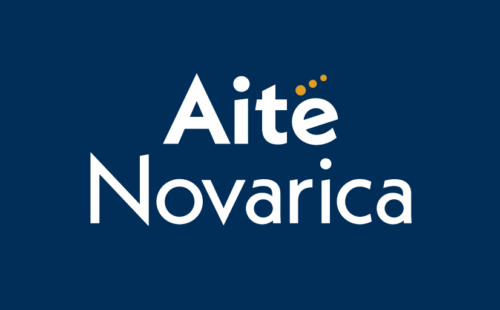 Thought Leadership, Research2021 Aite Matrix Impact Report: Supply Chain FinanceIn this 2021 Supply Chain Finance Impact Report, Aite-Novarica Group recognizes Kyriba as one of its Best-in-Class Supply Chain Finance Vendors. Leveraging the Aite Matrix, this report evaluates the overall competitive position of supply chain finance platform vendors, focusing on vendor stability, client strength, product features, and client services.Learn more
Thought Leadership, Research2021 Aite Matrix Impact Report: Supply Chain FinanceIn this 2021 Supply Chain Finance Impact Report, Aite-Novarica Group recognizes Kyriba as one of its Best-in-Class Supply Chain Finance Vendors. Leveraging the Aite Matrix, this report evaluates the overall competitive position of supply chain finance platform vendors, focusing on vendor stability, client strength, product features, and client services.Learn more -
 Fact SheetsKyriba’s Enterprise Liquidity Management Platform: Optimize Liquidity, Reduce Risk, Unlock GrowthKyriba’s Enterprise Liquidity Management Platform offers Connectivity, Payments, Treasury, Risk and Working Capital solutions delivering visibility, controls, productivity and data-driven decision making for CFOs and their teams. Delivered through our open API developer platform and Marketplace, finance gains access to new products and services coupled with enterprise-wide integrations with banks, ERPs, third party systems, and internal data sets.Read the fact sheet
Fact SheetsKyriba’s Enterprise Liquidity Management Platform: Optimize Liquidity, Reduce Risk, Unlock GrowthKyriba’s Enterprise Liquidity Management Platform offers Connectivity, Payments, Treasury, Risk and Working Capital solutions delivering visibility, controls, productivity and data-driven decision making for CFOs and their teams. Delivered through our open API developer platform and Marketplace, finance gains access to new products and services coupled with enterprise-wide integrations with banks, ERPs, third party systems, and internal data sets.Read the fact sheet -
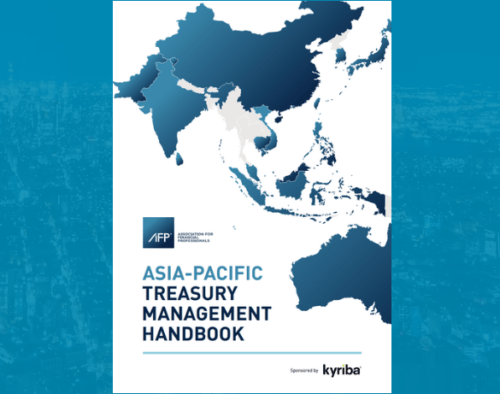 Research, Thought LeadershipAFP Asia-Pacific Treasury Management Handbook: Insights and Best Practices from Industry Thought LeadersAre you a treasury professional working in or planning to expand into the Asia-Pacific region? With 12 chapters on topics such as liquidity management, short-term borrowing and financial risk management, this handbook gives guidance...Read the Report
Research, Thought LeadershipAFP Asia-Pacific Treasury Management Handbook: Insights and Best Practices from Industry Thought LeadersAre you a treasury professional working in or planning to expand into the Asia-Pacific region? With 12 chapters on topics such as liquidity management, short-term borrowing and financial risk management, this handbook gives guidance...Read the Report -
 Webinars, Thought LeadershipPublic Sector’s Playbook for Payment Fraud ProtectionIn AFP’s 2021 Payments Fraud and Control Report, 75% of organizations across all areas were targeted for payment fraud. Moreover, due to public purchasing information, the data is hinting that number to be 95%...View Recording
Webinars, Thought LeadershipPublic Sector’s Playbook for Payment Fraud ProtectionIn AFP’s 2021 Payments Fraud and Control Report, 75% of organizations across all areas were targeted for payment fraud. Moreover, due to public purchasing information, the data is hinting that number to be 95%...View Recording -
 Webinars, Thought LeadershipUnlocking Real-Time Payments with APIsAs the pace of payments continues to increase, treasury professionals need technology that can keep up. Real-time or instant payments initiatives are proliferating all over the world, and these new platforms are made possible...View Recording
Webinars, Thought LeadershipUnlocking Real-Time Payments with APIsAs the pace of payments continues to increase, treasury professionals need technology that can keep up. Real-time or instant payments initiatives are proliferating all over the world, and these new platforms are made possible...View Recording -
 Research, Currency Impact ReportsKyriba’s October 2021 Currency Impact ReportA Quarterly Report Assessing the Impact of Foreign Exchange to North American and European Corporate Earnings About the Report The October 2021 Kyriba Currency Impact Report analyzes the reported effects of currencies to North...Read the Report
Research, Currency Impact ReportsKyriba’s October 2021 Currency Impact ReportA Quarterly Report Assessing the Impact of Foreign Exchange to North American and European Corporate Earnings About the Report The October 2021 Kyriba Currency Impact Report analyzes the reported effects of currencies to North...Read the Report -
 Fact SheetsWorking Capital SolutionWorking Capital Optimization is a strategic objective for CFOs as they fight to generate bottom line value and free cash flow. Kyriba Working Capital Solution offers CFOs three compelling benefits: the ability to improve...Read the fact sheet
Fact SheetsWorking Capital SolutionWorking Capital Optimization is a strategic objective for CFOs as they fight to generate bottom line value and free cash flow. Kyriba Working Capital Solution offers CFOs three compelling benefits: the ability to improve...Read the fact sheet -
 Success StoriesCenveo Achieves 93% Forecast Accuracy and 90% Productivity ImprovementsCenveo needed a way to improve visibility into overall liquidity and provide management on-demand insights into the performance of their strategic liquidity objectives.Read the success story
Success StoriesCenveo Achieves 93% Forecast Accuracy and 90% Productivity ImprovementsCenveo needed a way to improve visibility into overall liquidity and provide management on-demand insights into the performance of their strategic liquidity objectives.Read the success story -
 Webinars, Thought LeadershipModern Connectivity for Today’s Finance OrganizationFinance transformation cannot be completed without safe, secure, and adaptive connectivity, linking your ever growing and complex technologies and banks. Seated at the crossroad between the greater finance organization and IT, connectivity is a...View Recording
Webinars, Thought LeadershipModern Connectivity for Today’s Finance OrganizationFinance transformation cannot be completed without safe, secure, and adaptive connectivity, linking your ever growing and complex technologies and banks. Seated at the crossroad between the greater finance organization and IT, connectivity is a...View Recording -
 PodcastsEpisode 12: How 10 CFOs and Senior Leaders Harness Data to Drive StrategyThis episode features highlights from our first ten episodes focusing on the importance of data for finance and how to harness data to drive strategy. We hear from Ann Dennison, CFO of Nasdaq, Jaye Connolly-Labelle, Chairman and CEO of RippleNami, Hamza Benamar, former CFO of Kyriba, and more. Together, they bring you the most relevant insights to help you unlock the power of data in your own organization’s finance department.Listen to the Podcast
PodcastsEpisode 12: How 10 CFOs and Senior Leaders Harness Data to Drive StrategyThis episode features highlights from our first ten episodes focusing on the importance of data for finance and how to harness data to drive strategy. We hear from Ann Dennison, CFO of Nasdaq, Jaye Connolly-Labelle, Chairman and CEO of RippleNami, Hamza Benamar, former CFO of Kyriba, and more. Together, they bring you the most relevant insights to help you unlock the power of data in your own organization’s finance department.Listen to the Podcast -
 Webinars, Thought LeadershipCFOs Mandate to Treasury: A Reliable Cash ForecastMany Treasurers and their respective CFOs are faced with a mandate from the board to provide more timely and reliable insights into liquidity in both the short and long term. In a recent CFO.com...View Recording
Webinars, Thought LeadershipCFOs Mandate to Treasury: A Reliable Cash ForecastMany Treasurers and their respective CFOs are faced with a mandate from the board to provide more timely and reliable insights into liquidity in both the short and long term. In a recent CFO.com...View Recording -
 Webinars, Thought LeadershipTransform Microsoft Dynamics 365 Finance with Kyriba PaymentsBlossoming companies using Microsoft Dynamics 365 are running into a needing-to-be-solved obstacle: Payments & Bank Connectivity with the complexities of file formats, currencies, in multiple geographies through many payment systems. On top of that,...View Recording
Webinars, Thought LeadershipTransform Microsoft Dynamics 365 Finance with Kyriba PaymentsBlossoming companies using Microsoft Dynamics 365 are running into a needing-to-be-solved obstacle: Payments & Bank Connectivity with the complexities of file formats, currencies, in multiple geographies through many payment systems. On top of that,...View Recording -
 Fact SheetsHow to Tackle Payment Errors and Compliance ViolationsPayment errors and compliance violations come in all forms and cause significant losses for businesses of all sizes. Fraud alone cost companies more than $42 billion last year, according to PwC’s Global Economic Crime...Read the fact sheet
Fact SheetsHow to Tackle Payment Errors and Compliance ViolationsPayment errors and compliance violations come in all forms and cause significant losses for businesses of all sizes. Fraud alone cost companies more than $42 billion last year, according to PwC’s Global Economic Crime...Read the fact sheet -
 Fact SheetsKyriba APIs for Treasury ManagementAs the leader in connectivity for treasury and finance systems, Kyriba maximizes the power of APIs for treasury management to drive liquidity transformation for CFOs and treasurers.Read the fact sheet
Fact SheetsKyriba APIs for Treasury ManagementAs the leader in connectivity for treasury and finance systems, Kyriba maximizes the power of APIs for treasury management to drive liquidity transformation for CFOs and treasurers.Read the fact sheet -
 PodcastsEpisode 11: Finance ModernizationThis episode features an interview with Enrique Calderon, former Assistant Treasurer at Fluor, a global engineering construction company with a revenue of $15.7B in 2020 and ranked 181 among the Fortune 500, talking to The Invisible Vault host Bob Stark, Head of Market Strategy at Kyriba. On this episode, Enrique talks about what it was like adopting the Euro at a massive organization, how important it is to understand liquidity whether or not your company is flush with cash, and shares some valuable advice on getting promoted. Enrique has spent an impressive 45 years in Treasury. Prior to his 14 years as Assistant Treasurer at Fluor, Enrique spent 29 years working for AT&T or its divested companies, where he took on an assignment in a joint venture with Telefonica in Spain and became regional treasurer for Latin America and later for Europe, the Middle East and Africa.Listen to the Podcast
PodcastsEpisode 11: Finance ModernizationThis episode features an interview with Enrique Calderon, former Assistant Treasurer at Fluor, a global engineering construction company with a revenue of $15.7B in 2020 and ranked 181 among the Fortune 500, talking to The Invisible Vault host Bob Stark, Head of Market Strategy at Kyriba. On this episode, Enrique talks about what it was like adopting the Euro at a massive organization, how important it is to understand liquidity whether or not your company is flush with cash, and shares some valuable advice on getting promoted. Enrique has spent an impressive 45 years in Treasury. Prior to his 14 years as Assistant Treasurer at Fluor, Enrique spent 29 years working for AT&T or its divested companies, where he took on an assignment in a joint venture with Telefonica in Spain and became regional treasurer for Latin America and later for Europe, the Middle East and Africa.Listen to the Podcast -
 WebinarsNordic Battle of Treasury: Cash flow forecastingCash flow forecasting is typically a very manual process that takes quite a bit of time. Further, people sometimes question the accuracy of the forecast and thereby the usefulness of spending too much time...View Recording
WebinarsNordic Battle of Treasury: Cash flow forecastingCash flow forecasting is typically a very manual process that takes quite a bit of time. Further, people sometimes question the accuracy of the forecast and thereby the usefulness of spending too much time...View Recording -
 PodcastsEpisode 10: $15B and Counting: How CFOs Build High-Growth StrategiesThis episode features an interview with Ross Tennenbaum, CFO of Avalara - the leading provider of automated tax compliance software with a market cap of nearly $15B, talking to The Invisible Vault host Bob Stark, Head of Market Strategy at Kyriba. On this episode, Ross discusses how to harness skills from previous finance roles to become a strategic partner as CFO, when to bring on a treasurer, and leveraging modern technology to drive growth. Over his more than 20-year career, Ross has served in operational and financial leadership roles for companies like Credit Suisse and Goldman Sachs. He’s an entrepreneur and investment banker turned software executive, with an MBA from The Wharton School.Listen to the Podcast
PodcastsEpisode 10: $15B and Counting: How CFOs Build High-Growth StrategiesThis episode features an interview with Ross Tennenbaum, CFO of Avalara - the leading provider of automated tax compliance software with a market cap of nearly $15B, talking to The Invisible Vault host Bob Stark, Head of Market Strategy at Kyriba. On this episode, Ross discusses how to harness skills from previous finance roles to become a strategic partner as CFO, when to bring on a treasurer, and leveraging modern technology to drive growth. Over his more than 20-year career, Ross has served in operational and financial leadership roles for companies like Credit Suisse and Goldman Sachs. He’s an entrepreneur and investment banker turned software executive, with an MBA from The Wharton School.Listen to the Podcast -
 Webinars, Thought LeadershipSimplifying SAP Bank Connectivity with Certified Payments NetworkCIOs & CFOs are reporting that generating XML ISO20022 payment format variations, building new bank connections, and new fraud prevention safeguards, is demanding more time, money, and resources than ever. Add the complexity of...View Recording
Webinars, Thought LeadershipSimplifying SAP Bank Connectivity with Certified Payments NetworkCIOs & CFOs are reporting that generating XML ISO20022 payment format variations, building new bank connections, and new fraud prevention safeguards, is demanding more time, money, and resources than ever. Add the complexity of...View Recording -
 Webinars, Thought LeadershipOutgrowing Excel: Why Treasurers Transcend to a TMS“When do I know my finance organization has outgrown spreadsheets for managing our cash and risk? Which inefficiencies could we overcome moving beyond Excel? How many hours and dollars could we gain? Which processes...View Recording
Webinars, Thought LeadershipOutgrowing Excel: Why Treasurers Transcend to a TMS“When do I know my finance organization has outgrown spreadsheets for managing our cash and risk? Which inefficiencies could we overcome moving beyond Excel? How many hours and dollars could we gain? Which processes...View Recording -
 Webinars, Thought LeadershipAPIs: The Catalyst for Real-Time TreasuryAPIs are becoming a very popular buzzword in treasury, payments, finance, in part to deliver on the promise of open banking and real-time connectivity between systems. While APIs offer great efficiencies for bank and...View Recording
Webinars, Thought LeadershipAPIs: The Catalyst for Real-Time TreasuryAPIs are becoming a very popular buzzword in treasury, payments, finance, in part to deliver on the promise of open banking and real-time connectivity between systems. While APIs offer great efficiencies for bank and...View Recording -
 WebinarsLost in Transaction: Overcoming Payments PitfallsFrom simple errors to duplicates, fraud and sanctions violations, there are a number of areas where payments can go wrong – especially in the real-time environment. In this webinar, we examine common pain points...View Recording
WebinarsLost in Transaction: Overcoming Payments PitfallsFrom simple errors to duplicates, fraud and sanctions violations, there are a number of areas where payments can go wrong – especially in the real-time environment. In this webinar, we examine common pain points...View Recording -
 Webinars, Thought LeadershipHow International Treasury Centers Unlock Global Cash VisibilityAfter a year and a half of Deloitte’s Treasury Advisory team serving many of the world’s emerging corporations through an unsettled global economy, the Advisory team noticed an increase in popularity of a noteworthy...View Recording
Webinars, Thought LeadershipHow International Treasury Centers Unlock Global Cash VisibilityAfter a year and a half of Deloitte’s Treasury Advisory team serving many of the world’s emerging corporations through an unsettled global economy, the Advisory team noticed an increase in popularity of a noteworthy...View Recording -
 PodcastsEpisode 09: Knowing Your Data, Culture and NetworkThis episode features an interview with Hamza Benamar, CFO of Kyriba, talking to The Invisible Vault host Bob Stark, Head of Market Strategy at Kyriba. On this episode, Hamza discusses the importance of being attuned to the global market, how we’re coming closer to full digitization of payments, and how the pandemic is redefining talent acquisition as well as the workplace. Hamza has spent more than 20 years driving financial performance, 12 of which were spent internationally, in Europe, Asia and Latin America. Before Kyriba, he served in leadership roles in finance, operations, consulting, and pre-sales at companies like Amgen, Wolters Kluwer and SunGuard.Listen to the Podcast
PodcastsEpisode 09: Knowing Your Data, Culture and NetworkThis episode features an interview with Hamza Benamar, CFO of Kyriba, talking to The Invisible Vault host Bob Stark, Head of Market Strategy at Kyriba. On this episode, Hamza discusses the importance of being attuned to the global market, how we’re coming closer to full digitization of payments, and how the pandemic is redefining talent acquisition as well as the workplace. Hamza has spent more than 20 years driving financial performance, 12 of which were spent internationally, in Europe, Asia and Latin America. Before Kyriba, he served in leadership roles in finance, operations, consulting, and pre-sales at companies like Amgen, Wolters Kluwer and SunGuard.Listen to the Podcast -
 Success Stories#techforfood #techfortreasury #swile@workSwile set its sights on becoming a global player in employee engagement using a fully virtual solution. To achieve this goal, Swile offers a single smartcard to access all employee benefits (meal vouchers, gift...Read the success story
Success Stories#techforfood #techfortreasury #swile@workSwile set its sights on becoming a global player in employee engagement using a fully virtual solution. To achieve this goal, Swile offers a single smartcard to access all employee benefits (meal vouchers, gift...Read the success story -
 Webinars, Thought LeadershipDebating Daily vs. Single Rate Balance Sheet ExposureManaging balance sheet FX exposure in a daily vs. single rate is an often discussed treasury topic in corporate risk mitigation. There are different results and perspectives, with a void left for real data...View Recording
Webinars, Thought LeadershipDebating Daily vs. Single Rate Balance Sheet ExposureManaging balance sheet FX exposure in a daily vs. single rate is an often discussed treasury topic in corporate risk mitigation. There are different results and perspectives, with a void left for real data...View Recording -
 PodcastsEpisode 08: The Evolution of CFO as Strategic AdvisorThis episode features an interview with Ann Dennison, EVP and CFO, talking to The Invisible Vault host Bob Stark, Head of Market Strategy at Kyriba. On this episode, Ann discusses market resiliency, cutting-edge topics like ESG and the digital asset space, and the transformation of the CFO from a numbers person to a strategic advisor. Ann has more than 20 years of experience in corporate finance and financial reporting and analysis. At Nasdaq, she’s responsible for accounting, FP&A, budgeting, planning and procurement. Prior to joining Nasdaq in 2015, Ann was a managing director and head of financial reporting at Goldman Sachs.Listen to the Podcast
PodcastsEpisode 08: The Evolution of CFO as Strategic AdvisorThis episode features an interview with Ann Dennison, EVP and CFO, talking to The Invisible Vault host Bob Stark, Head of Market Strategy at Kyriba. On this episode, Ann discusses market resiliency, cutting-edge topics like ESG and the digital asset space, and the transformation of the CFO from a numbers person to a strategic advisor. Ann has more than 20 years of experience in corporate finance and financial reporting and analysis. At Nasdaq, she’s responsible for accounting, FP&A, budgeting, planning and procurement. Prior to joining Nasdaq in 2015, Ann was a managing director and head of financial reporting at Goldman Sachs.Listen to the Podcast -
 Webinars, Thought LeadershipEnsuring Greater Speed, Accuracy & Security Across the Bank Reconciliation ProcessA traditionally time-consuming exercise, the end-to-end bank reconciliation process requires heavy IT involvement on the front-end and manual review of large transactional volumes by accounting teams throughout the period. The rise of cryptocurrencies, social...View Recording
Webinars, Thought LeadershipEnsuring Greater Speed, Accuracy & Security Across the Bank Reconciliation ProcessA traditionally time-consuming exercise, the end-to-end bank reconciliation process requires heavy IT involvement on the front-end and manual review of large transactional volumes by accounting teams throughout the period. The rise of cryptocurrencies, social...View Recording -
 Research, Currency Impact ReportsKyriba’s July 2021 Currency Impact ReportKyriba’s Currency Impact Report (CIR), a comprehensive quarterly report which details the impacts of foreign exchange (FX) exposures among 1,200 multinational companies based in North America and Europe with at least 15 percent of their revenue coming from overseas, sustained $49.09 billion in total impacts to earnings from currency volatility.Read the Report
Research, Currency Impact ReportsKyriba’s July 2021 Currency Impact ReportKyriba’s Currency Impact Report (CIR), a comprehensive quarterly report which details the impacts of foreign exchange (FX) exposures among 1,200 multinational companies based in North America and Europe with at least 15 percent of their revenue coming from overseas, sustained $49.09 billion in total impacts to earnings from currency volatility.Read the Report -
 PodcastsEpisode 07: The Future of Digital CurrencyThis episode features an interview with Wolfgang Koester, Chief Evangelist at Kyriba, talking to The Invisible Vault host Bob Stark, Head of Market Strategy at Kyriba. Wolfgang has spent more than 30 years in currency markets, with experience working for Fortune 1,000 companies and government entities. He is the former CEO and co-founder of FiREapps, and was named one of the “100 Most Influential People in Finance,” by Treasury & Risk Magazine.
PodcastsEpisode 07: The Future of Digital CurrencyThis episode features an interview with Wolfgang Koester, Chief Evangelist at Kyriba, talking to The Invisible Vault host Bob Stark, Head of Market Strategy at Kyriba. Wolfgang has spent more than 30 years in currency markets, with experience working for Fortune 1,000 companies and government entities. He is the former CEO and co-founder of FiREapps, and was named one of the “100 Most Influential People in Finance,” by Treasury & Risk Magazine.On this episode, Wolfgang discusses the importance of knowing your exposures, defining risk, and the possibility of a global electronic currency.
Listen to the Podcast -
 PodcastsEpisode 06: Data, Productivity and Certainty ~ Drivers of Growth for the Modern CFOThis episode features an interview with Katherine Edenbach, CFO of Emburse, talking to The Invisible Vault host Bob Stark, Head of Market Strategy at Kyriba. Katherine has an impressive career of over 20 years in accounting and finance. Before coming to Emburse, she was CFO of Certify, Inc., VP of finance at CashStar and served in various senior accounting and finance roles at Fairchild Semiconductor and WEX, Inc. On this episode, Katherine talks about the latest in fraud trends, the renewed importance of cash management amid the pandemic, and how accurate data leads to better decision making.Listen to the Podcast
PodcastsEpisode 06: Data, Productivity and Certainty ~ Drivers of Growth for the Modern CFOThis episode features an interview with Katherine Edenbach, CFO of Emburse, talking to The Invisible Vault host Bob Stark, Head of Market Strategy at Kyriba. Katherine has an impressive career of over 20 years in accounting and finance. Before coming to Emburse, she was CFO of Certify, Inc., VP of finance at CashStar and served in various senior accounting and finance roles at Fairchild Semiconductor and WEX, Inc. On this episode, Katherine talks about the latest in fraud trends, the renewed importance of cash management amid the pandemic, and how accurate data leads to better decision making.Listen to the Podcast -
 Webinars, Thought Leadership7 Reasons 7-Time Netsuite Partner of the Year Recommends KyribaFinancial organizations of all sizes on Oracle Netsuite are supplementing, reducing financial risks, and empowering their treasury teams by bolting on Kyriba. Certified and “Built for Netsuite”, Kyriba naturally complements Netsuite, allowing finance teams...View Recording
Webinars, Thought Leadership7 Reasons 7-Time Netsuite Partner of the Year Recommends KyribaFinancial organizations of all sizes on Oracle Netsuite are supplementing, reducing financial risks, and empowering their treasury teams by bolting on Kyriba. Certified and “Built for Netsuite”, Kyriba naturally complements Netsuite, allowing finance teams...View Recording -
 Webinars, Thought LeadershipPut Your Excess Cash to WorkIn a post-pandemic world, there’s a major reset for most organizations, not many businesses have prospered and gone unscathed. The industries that have tended to fare better than most: food retail, e-commerce and retailers...View Recording
Webinars, Thought LeadershipPut Your Excess Cash to WorkIn a post-pandemic world, there’s a major reset for most organizations, not many businesses have prospered and gone unscathed. The industries that have tended to fare better than most: food retail, e-commerce and retailers...View Recording -
 PodcastsEpisode 05: Why the Treasurer could be the Modern CFOThis episode features an interview with Niklas Bergentoft, Principal at Deloitte & Touche LLP. Niklas has been at Deloitte & Touche LLP for 15 years, and currently leads the company’s treasury practice in the US. His multifaceted role involves setting strategy and building capabilities for business growth, shaping the firm’s methodologies, relationship building, and client delivery.Listen to the Podcast
PodcastsEpisode 05: Why the Treasurer could be the Modern CFOThis episode features an interview with Niklas Bergentoft, Principal at Deloitte & Touche LLP. Niklas has been at Deloitte & Touche LLP for 15 years, and currently leads the company’s treasury practice in the US. His multifaceted role involves setting strategy and building capabilities for business growth, shaping the firm’s methodologies, relationship building, and client delivery.Listen to the Podcast -
 PodcastsEpisode 04: Finger on the Pulse-The Power of DigitizationThis episode features an interview with Jaye Connolly-LaBelle, Chairman and CEO of RippleNami, Inc., a global technology company that has redefined a simple-to-use technology platform leveraging artificial intelligence, blockchain, and data visualization, and currently has a keen focus in Africa.
PodcastsEpisode 04: Finger on the Pulse-The Power of DigitizationThis episode features an interview with Jaye Connolly-LaBelle, Chairman and CEO of RippleNami, Inc., a global technology company that has redefined a simple-to-use technology platform leveraging artificial intelligence, blockchain, and data visualization, and currently has a keen focus in Africa.Jaye boasts an impressive 35-year career in finance, technology, audit, healthcare, and M&A, with extensive leadership experience including key C-level roles at both private and publicly traded corporations.
Listen to the Podcast -
 Webinars, Thought LeadershipMemo to IT: ERP Migrations & Bank ConnectivityUnbeknownst to the majority of IT & technology teams migrating to the Cloud, bank connectivity looms as the most difficult aspect of ERP migrations according to 91% of IT leaders that have migrated (Pulse...View Recording
Webinars, Thought LeadershipMemo to IT: ERP Migrations & Bank ConnectivityUnbeknownst to the majority of IT & technology teams migrating to the Cloud, bank connectivity looms as the most difficult aspect of ERP migrations according to 91% of IT leaders that have migrated (Pulse...View Recording -
 Webinars, Thought LeadershipExtreme Automation: The Emergence of RPA and AI for TreasuryCorporate treasury departments rely on technology to drive productivity and free up time to improve liquidity, reduce risk and optimize costs. More frequently, treasury teams are considering digital treasury tools, including robotic process automation...View Recording
Webinars, Thought LeadershipExtreme Automation: The Emergence of RPA and AI for TreasuryCorporate treasury departments rely on technology to drive productivity and free up time to improve liquidity, reduce risk and optimize costs. More frequently, treasury teams are considering digital treasury tools, including robotic process automation...View Recording -
 Fact SheetsKyriba’s Support for a Smooth and Effective LIBOR TransitionIntroduction and Background Organizations currently using LIBOR as a benchmark for financial contracts and pricing have until December 31, 2021 to complete their transition to new risk free indices. Since 2018, Kyriba has collaborated...Read the fact sheet
Fact SheetsKyriba’s Support for a Smooth and Effective LIBOR TransitionIntroduction and Background Organizations currently using LIBOR as a benchmark for financial contracts and pricing have until December 31, 2021 to complete their transition to new risk free indices. Since 2018, Kyriba has collaborated...Read the fact sheet -
 Webinars, Thought Leadership5 Wins for TMS OwnersAvant-garde treasury teams that are excelling at the essentials with their Treasury Management Systems (TMS) are asking, “What’s next for us?”. Although 70% of treasurers reportedly use a TMS, survey data reveals that the...View Recording
Webinars, Thought Leadership5 Wins for TMS OwnersAvant-garde treasury teams that are excelling at the essentials with their Treasury Management Systems (TMS) are asking, “What’s next for us?”. Although 70% of treasurers reportedly use a TMS, survey data reveals that the...View Recording -
 PodcastsEpisode 03: Making the Call-Lessons from 40 Years in FinanceThis episode features an interview with Michael Dinkins. Michael is a finance industry executive with more than 40 years of experience, and currently serves as President and CEO of Dinkins Financial and on the board of a number of publicly traded companies. Over the course of his illustrious career, Michael earned numerous awards during his tenure with GE and GE Capital, and served as CFO for five different public and privately held companies, the most recent being Integer Holdings Corporation, from which he retired in 2017.Listen to the Podcast
PodcastsEpisode 03: Making the Call-Lessons from 40 Years in FinanceThis episode features an interview with Michael Dinkins. Michael is a finance industry executive with more than 40 years of experience, and currently serves as President and CEO of Dinkins Financial and on the board of a number of publicly traded companies. Over the course of his illustrious career, Michael earned numerous awards during his tenure with GE and GE Capital, and served as CFO for five different public and privately held companies, the most recent being Integer Holdings Corporation, from which he retired in 2017.Listen to the Podcast -
 PodcastsEpisode 02: From Treasurer to CFO to 4X Board Member-Building the Next Generation of CFOsThis episode features an interview with Jennifer Ceran. Jennifer boasts an extremely impressive 35-year career in finance, and recently retired as CFO of SmartSheet in January of 2021.Listen to the Podcast
PodcastsEpisode 02: From Treasurer to CFO to 4X Board Member-Building the Next Generation of CFOsThis episode features an interview with Jennifer Ceran. Jennifer boasts an extremely impressive 35-year career in finance, and recently retired as CFO of SmartSheet in January of 2021.Listen to the Podcast -
 PodcastsEpisode 01: How 2020 Revealed the Importance of LiquidityEric Ball, talks with The Invisible Vault host Thomas Butta about his journey from cash register clerk to CFO, the requirements to plan for liquidity events, and why real-time visibility is table stakes to manage cash in a crisis. Eric draws on his expertise as a finance leader to reveal a broader challenge for the office of the CFO. Who is managing liquidity? He points out that liquidity is most visible when it’s not there.Listen to the Podcast
PodcastsEpisode 01: How 2020 Revealed the Importance of LiquidityEric Ball, talks with The Invisible Vault host Thomas Butta about his journey from cash register clerk to CFO, the requirements to plan for liquidity events, and why real-time visibility is table stakes to manage cash in a crisis. Eric draws on his expertise as a finance leader to reveal a broader challenge for the office of the CFO. Who is managing liquidity? He points out that liquidity is most visible when it’s not there.Listen to the Podcast -
 eBooksAFP Executive Guide to Identifying Value for Treasury Automation, Machine Learning & Artificial IntelligenceDigital treasury tools, such as robotic process automation (RPA), machine learning and artificial intelligence (AI) are already being used to facilitate treasury automation. The use of treasury technology leads to better decision-making and also frees time for skilled treasury practitioners to focus on strategic development.Read the eBook
eBooksAFP Executive Guide to Identifying Value for Treasury Automation, Machine Learning & Artificial IntelligenceDigital treasury tools, such as robotic process automation (RPA), machine learning and artificial intelligence (AI) are already being used to facilitate treasury automation. The use of treasury technology leads to better decision-making and also frees time for skilled treasury practitioners to focus on strategic development.Read the eBook -
 Research, Thought LeadershipStrategic Treasurer: 2020 Treasury and Risk Management Systems Analyst ReportWelcome to the 2020 Treasury and Risk Management System (TMS/TRMS) Analyst Report, your definitive guide to smart financial stewardship in the digital age. Strategic Treasurer created this report as an aid to practitioners exploring...Read the Report
Research, Thought LeadershipStrategic Treasurer: 2020 Treasury and Risk Management Systems Analyst ReportWelcome to the 2020 Treasury and Risk Management System (TMS/TRMS) Analyst Report, your definitive guide to smart financial stewardship in the digital age. Strategic Treasurer created this report as an aid to practitioners exploring...Read the Report -
 Webinars, Thought LeadershipThe Basics for University Treasurers: the need-to-knowsIn today’s environment, quick access to 100% cash visibility isn’t a nice to have; it's a must have. Higher education institutions across the country need to make crucial decisions based on their cash position...View Recording
Webinars, Thought LeadershipThe Basics for University Treasurers: the need-to-knowsIn today’s environment, quick access to 100% cash visibility isn’t a nice to have; it's a must have. Higher education institutions across the country need to make crucial decisions based on their cash position...View Recording -
 Webinars, Thought LeadershipValue of a Treasurer to Today’s Finance OrganizationIn order for CFOs and finance to grow and fund initiatives, they need cash and liquidity. Cash and liquidity is the lifeblood of all organizations; finance for maximizing returns on surplus cash, readily available...View Recording
Webinars, Thought LeadershipValue of a Treasurer to Today’s Finance OrganizationIn order for CFOs and finance to grow and fund initiatives, they need cash and liquidity. Cash and liquidity is the lifeblood of all organizations; finance for maximizing returns on surplus cash, readily available...View Recording -
 Webinars, Thought LeadershipBuild a Smart, Secure Payments Hub: Digitizing your payments workflowIn the past five years non-cash transactions have increased over 70%, alongside an easily disrupted and increasingly volatile financial landscape. Coincidentally, corporations are regularly making payments in more currencies using disparate and manual processes,...View Recording
Webinars, Thought LeadershipBuild a Smart, Secure Payments Hub: Digitizing your payments workflowIn the past five years non-cash transactions have increased over 70%, alongside an easily disrupted and increasingly volatile financial landscape. Coincidentally, corporations are regularly making payments in more currencies using disparate and manual processes,...View Recording -
 Webinars, Thought LeadershipThe CFOs Safe: Treasury’s Best Practices to Reduce Fraud RiskHuman error is responsible for over 90% of data breaches (Cybint). Further adding to the stress, 68% of business leaders feel their cybersecurity risks increasing (Accenture). This phishing, hacking, scamming “business” could potentially cost...View Recording
Webinars, Thought LeadershipThe CFOs Safe: Treasury’s Best Practices to Reduce Fraud RiskHuman error is responsible for over 90% of data breaches (Cybint). Further adding to the stress, 68% of business leaders feel their cybersecurity risks increasing (Accenture). This phishing, hacking, scamming “business” could potentially cost...View Recording -
 Research, Currency Impact ReportsKyriba’s April 2021 Currency Impact ReportKyriba’s Currency Impact Report (CIR), a comprehensive report detailing the impacts of foreign exchange (FX) exposures among 1,200 multinational companies based in North America and Europe, revealed negative impact from currency volatility of $6.16...Read the Report
Research, Currency Impact ReportsKyriba’s April 2021 Currency Impact ReportKyriba’s Currency Impact Report (CIR), a comprehensive report detailing the impacts of foreign exchange (FX) exposures among 1,200 multinational companies based in North America and Europe, revealed negative impact from currency volatility of $6.16...Read the Report -
 Research, Thought LeadershipIDC 2020 SaaS CSAT Award for Treasury ManagementBased on ratings collected in IDC’s 2020 SaaSPath Survey (IDC #US46933620), Kyriba placed in the highest-scoring group of vendors serving the SaaS Treasury Management (TM) application market and has been awarded IDC’s 2020 SaaS...Read the Report
Research, Thought LeadershipIDC 2020 SaaS CSAT Award for Treasury ManagementBased on ratings collected in IDC’s 2020 SaaSPath Survey (IDC #US46933620), Kyriba placed in the highest-scoring group of vendors serving the SaaS Treasury Management (TM) application market and has been awarded IDC’s 2020 SaaS...Read the Report -
 Webinars, Thought LeadershipSimplify Your Finance Complexities with Secure PaymentsBurgeoning companies utilizing Microsoft Dynamics 365 are running into a problem that needs to be solved: payments & bank connectivity in multiple geographies through many payment systems. On top of that, these payments need...View Recording
Webinars, Thought LeadershipSimplify Your Finance Complexities with Secure PaymentsBurgeoning companies utilizing Microsoft Dynamics 365 are running into a problem that needs to be solved: payments & bank connectivity in multiple geographies through many payment systems. On top of that, these payments need...View Recording -
 Research, Thought LeadershipStrategic Treasurer Fintech Analyst Report: Supply Chain Finance & Cash Conversion Cycle SolutionsDuring these times of accelerated growth and change, interest in supply chain finance solutions that can provide thorough evaluation and analysis is rapidly increasing. The Supply Chain Finance (SCF) & Cash Conversion Cycle (CCC...Read the Report
Research, Thought LeadershipStrategic Treasurer Fintech Analyst Report: Supply Chain Finance & Cash Conversion Cycle SolutionsDuring these times of accelerated growth and change, interest in supply chain finance solutions that can provide thorough evaluation and analysis is rapidly increasing. The Supply Chain Finance (SCF) & Cash Conversion Cycle (CCC...Read the Report -
 Research, Thought Leadership2020 Strategic Treasurer Fintech Analyst Report: Treasury Aggregators (Bank Connectivity Solutions)In today’s ever-changing business environment, there are several key factors that are driving change across the treasury aggregation landscape.Read the Report
Research, Thought Leadership2020 Strategic Treasurer Fintech Analyst Report: Treasury Aggregators (Bank Connectivity Solutions)In today’s ever-changing business environment, there are several key factors that are driving change across the treasury aggregation landscape.Read the Report -
 Research, Thought LeadershipStrategic Treasurer Fintech Analyst Report: Treasury and Risk Managment SystemsThe latest Strategic Treasurer Analyst Report provides a glimpse into the current TMS space and outlines the primary benefits of a treasury management system.Read the Report
Research, Thought LeadershipStrategic Treasurer Fintech Analyst Report: Treasury and Risk Managment SystemsThe latest Strategic Treasurer Analyst Report provides a glimpse into the current TMS space and outlines the primary benefits of a treasury management system.Read the Report -
 Webinars, Thought LeadershipGood to Great FX Programs: Automation Significantly Reduces FX VolatilitySimple and complex companies are subject to uncontrollable challenges abroad and at home such as currency volatility. Despite having sophisticated teams and well-thought-out workflows, foreign exchange impacts negatively impact companies due to manual processes,...View Recording
Webinars, Thought LeadershipGood to Great FX Programs: Automation Significantly Reduces FX VolatilitySimple and complex companies are subject to uncontrollable challenges abroad and at home such as currency volatility. Despite having sophisticated teams and well-thought-out workflows, foreign exchange impacts negatively impact companies due to manual processes,...View Recording -
 Webinars, Thought LeadershipHilton Grand Vacations’ Playbook for Oracle Migrations for Treasury & ITWhen Hilton Grand Vacations decided to migrate to Oracle Cloud ERP, they were prepared to try a 3rd party solution to reconnect to their more than 10 banks with 300+ accounts. Like most IT...View Recording
Webinars, Thought LeadershipHilton Grand Vacations’ Playbook for Oracle Migrations for Treasury & ITWhen Hilton Grand Vacations decided to migrate to Oracle Cloud ERP, they were prepared to try a 3rd party solution to reconnect to their more than 10 banks with 300+ accounts. Like most IT...View Recording -
 Success StoriesStreamlining Treasury in Complex MarketsWhat were Mantrac’s objectives? Mantrac Group’s treasury structure was highly complex and dependent on manual processes. Visibility over cash was limited, particularly as the group was using almost 100 banks, with over 700 bank...Read the success story
Success StoriesStreamlining Treasury in Complex MarketsWhat were Mantrac’s objectives? Mantrac Group’s treasury structure was highly complex and dependent on manual processes. Visibility over cash was limited, particularly as the group was using almost 100 banks, with over 700 bank...Read the success story -
 Webinars, Thought LeadershipSuperior Cash Visibility and ForecastingA fully realized digital transformation of treasury involves effective cash management, accurate cash forecasting, and real-time cash positioning within a consolidated view. Without it, it is nearly impossible to support treasury & finance’s’ short,...View Recording
Webinars, Thought LeadershipSuperior Cash Visibility and ForecastingA fully realized digital transformation of treasury involves effective cash management, accurate cash forecasting, and real-time cash positioning within a consolidated view. Without it, it is nearly impossible to support treasury & finance’s’ short,...View Recording -
 Webinars, Success StoriesCrypto for Corporates: Does it make sense for you?The first major corporate purchase of the Bitcoin in October 2020 began a string of subsequent Bitcoin purchases in 2021, including recent purchases by Square and Tesla. Crypto (digital) currencies have shown to be...View Recording
Webinars, Success StoriesCrypto for Corporates: Does it make sense for you?The first major corporate purchase of the Bitcoin in October 2020 began a string of subsequent Bitcoin purchases in 2021, including recent purchases by Square and Tesla. Crypto (digital) currencies have shown to be...View Recording -
 Webinars, Thought LeadershipThe Real Costs of Bank Connectivity during S/4HANA MigrationsOver 30% of corporates on SAP will be migrating to S/4HANA over the next five years. For IT & enterprise technology teams, these migrations are already difficult enough. Add in a global pandemic with...View Recording
Webinars, Thought LeadershipThe Real Costs of Bank Connectivity during S/4HANA MigrationsOver 30% of corporates on SAP will be migrating to S/4HANA over the next five years. For IT & enterprise technology teams, these migrations are already difficult enough. Add in a global pandemic with...View Recording -
 Webinars, Thought LeadershipTreasury Renovation: How 3 Real Estate Treasurers Rebuilt with TechnologyFew industries reflect the story of the economy right now like real estate. This industry has endured housing foreclosure collapse, COVID, and recessions. The ability to overcome economic whiplash like that focuses attention on...View Recording
Webinars, Thought LeadershipTreasury Renovation: How 3 Real Estate Treasurers Rebuilt with TechnologyFew industries reflect the story of the economy right now like real estate. This industry has endured housing foreclosure collapse, COVID, and recessions. The ability to overcome economic whiplash like that focuses attention on...View Recording -
 Webinars, Thought LeadershipHow Multilateral Netting Streamlined Diversey’s Intercompany Cash FlowsCompanies of all sizes and all industries endured volatile currency in 2020 with an over 130% overall quarterly increase. But not all companies suffered major losses. The companies that weathered the foreign exchange storm...View Recording
Webinars, Thought LeadershipHow Multilateral Netting Streamlined Diversey’s Intercompany Cash FlowsCompanies of all sizes and all industries endured volatile currency in 2020 with an over 130% overall quarterly increase. But not all companies suffered major losses. The companies that weathered the foreign exchange storm...View Recording -
 eBooksTeam Treasury: Your New Remote Treasury Implementation PlaybookWith many treasury teams engaging in remote work, remote implementation of critical projects has become part of the new normal.Read the eBook
eBooksTeam Treasury: Your New Remote Treasury Implementation PlaybookWith many treasury teams engaging in remote work, remote implementation of critical projects has become part of the new normal.Read the eBook -
 Webinars, Thought LeadershipMerck and Kraton: FX Success in Companies Big and SmallCompanies of all sizes and all industries endured volatile currency in 2020 with an over 130% overall quarterly increase. But not all companies suffered major losses.View Recording
Webinars, Thought LeadershipMerck and Kraton: FX Success in Companies Big and SmallCompanies of all sizes and all industries endured volatile currency in 2020 with an over 130% overall quarterly increase. But not all companies suffered major losses.View Recording -
 Webinars, Thought LeadershipPost-LIBOR Readiness Plan: Prep, Protect, PrevailThe global interest rate benchmark, London Interbank Offered Rate (LIBOR), will lose its status and likely be replaced by 2022.View Recording
Webinars, Thought LeadershipPost-LIBOR Readiness Plan: Prep, Protect, PrevailThe global interest rate benchmark, London Interbank Offered Rate (LIBOR), will lose its status and likely be replaced by 2022.View Recording -
 Webinars, Thought LeadershipNew Year, New Expectations: How Modern CFOs Need to Think about Enterprise Liquidity in 2021How should a CFO think differently in 2021? What changes are vital to success? Emerging from 2020, some organizations have seen accelerated growth and many others are simply trying to survive. The pandemic hasn’t...View Recording
Webinars, Thought LeadershipNew Year, New Expectations: How Modern CFOs Need to Think about Enterprise Liquidity in 2021How should a CFO think differently in 2021? What changes are vital to success? Emerging from 2020, some organizations have seen accelerated growth and many others are simply trying to survive. The pandemic hasn’t...View Recording -
 eBooks, Thought LeadershipAFP Tip Guide: Making Preparations for a Post-Libor WorldRead the eBook
eBooks, Thought LeadershipAFP Tip Guide: Making Preparations for a Post-Libor WorldRead the eBook -
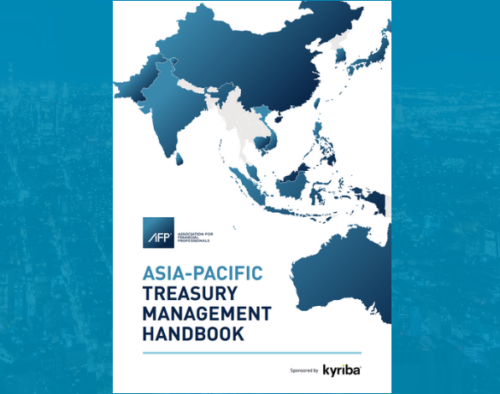 Webinars, Thought LeadershipBlueprint for Treasury in Asia-PacificOne of the most striking phenomena in the last 30 years has been globalization, with Asia-Pacific (APAC) being the most intriguing and inscrutable. Expansion into APAC, whether remote or physical, extends enterprises many potential...View Recording
Webinars, Thought LeadershipBlueprint for Treasury in Asia-PacificOne of the most striking phenomena in the last 30 years has been globalization, with Asia-Pacific (APAC) being the most intriguing and inscrutable. Expansion into APAC, whether remote or physical, extends enterprises many potential...View Recording -
 Research, Currency Impact ReportsKyriba’s October 2020 Currency Impact ReportThe October 2020 Kyriba Currency Impact Report analyzes the reported effects of currencies to North American and European companies’ Q2 2020 earnings. The report serves as a key benchmarking tool for global corporations.Read the Report
Research, Currency Impact ReportsKyriba’s October 2020 Currency Impact ReportThe October 2020 Kyriba Currency Impact Report analyzes the reported effects of currencies to North American and European companies’ Q2 2020 earnings. The report serves as a key benchmarking tool for global corporations.Read the Report -
 Webinars, Thought LeadershipSynthesizing Bank and FinTech SCF ProgramsClose to 50% of the globe’s most influential and powerful banks are collaborating with FinTechs to further service their clients (Strategic Treasurer 2019 survey). Further, these banks have labeled partnering with FinTech as their...View Recording
Webinars, Thought LeadershipSynthesizing Bank and FinTech SCF ProgramsClose to 50% of the globe’s most influential and powerful banks are collaborating with FinTechs to further service their clients (Strategic Treasurer 2019 survey). Further, these banks have labeled partnering with FinTech as their...View Recording -
 Webinars, Thought LeadershipThe Future of Cash VisibilityCash visibility and forecasting accuracy has always been paramount for Treasury & Finance success. Recently it has become critical to business viability. This is a trend that will only increase with the adoption of...View Recording
Webinars, Thought LeadershipThe Future of Cash VisibilityCash visibility and forecasting accuracy has always been paramount for Treasury & Finance success. Recently it has become critical to business viability. This is a trend that will only increase with the adoption of...View Recording -
 Webinars, Thought LeadershipFutureFocus 20/20: Kyriba Insights And AnalyticsThe technology used to power treasury and finance teams is only as good as the reporting and analytics it can provide. Now is the time to see what Kyriba can do to put the...View Recording
Webinars, Thought LeadershipFutureFocus 20/20: Kyriba Insights And AnalyticsThe technology used to power treasury and finance teams is only as good as the reporting and analytics it can provide. Now is the time to see what Kyriba can do to put the...View Recording -
 Webinars, Thought LeadershipHow a Payment Factory can help reduce the cost of your ERP migrationOur "new normal" is yet to be fully understood. However, it is quite clear that leadership will mandate significant cost savings throughout the organization. This webinar focuses on the value your organization can realize...View Recording
Webinars, Thought LeadershipHow a Payment Factory can help reduce the cost of your ERP migrationOur "new normal" is yet to be fully understood. However, it is quite clear that leadership will mandate significant cost savings throughout the organization. This webinar focuses on the value your organization can realize...View Recording -
 Webinars, Thought LeadershipAccelerate Your Oracle Cloud Migration: Kyriba and Accenture talk bank connectivityThe complex nature of global bank connectivity is often cited as one of the most difficult, time-consuming and riskiest components of an Oracle Cloud migration. But some organizations have found a way to simplify...View Recording
Webinars, Thought LeadershipAccelerate Your Oracle Cloud Migration: Kyriba and Accenture talk bank connectivityThe complex nature of global bank connectivity is often cited as one of the most difficult, time-consuming and riskiest components of an Oracle Cloud migration. But some organizations have found a way to simplify...View Recording -
 Webinars, Thought LeadershipFutureFocus 20/20: Debt ManagementIn this webinar, we cover how Kyriba clients are able to successfully manage multi-currency drawdowns, facility fees syndication, as well as reporting.View Recording
Webinars, Thought LeadershipFutureFocus 20/20: Debt ManagementIn this webinar, we cover how Kyriba clients are able to successfully manage multi-currency drawdowns, facility fees syndication, as well as reporting.View Recording -
 Success StoriesHow Şişecam Took Control of its Cash and PaymentsŞişecam’s international growth over the past few decades meant the company had a fragmented approach to cash management. While treasury handled strategic decisions such as borrowing, individual subsidiaries within the group handled their own payment operations and managed their cash using their enterprise resource planning (ERP) systems.Read the success story
Success StoriesHow Şişecam Took Control of its Cash and PaymentsŞişecam’s international growth over the past few decades meant the company had a fragmented approach to cash management. While treasury handled strategic decisions such as borrowing, individual subsidiaries within the group handled their own payment operations and managed their cash using their enterprise resource planning (ERP) systems.Read the success story -
 Webinars, Thought LeadershipHow 2 Manufacturers Create Treasury Success with Active LiquidityIn an industry increasingly affected by a fluctuating geopolitical climate, regulations, and uncertainty, today's manufacturing and industrial enterprises have to adapt & transform in anticipation of the certain unpredictability that they frequently face.View Recording
Webinars, Thought LeadershipHow 2 Manufacturers Create Treasury Success with Active LiquidityIn an industry increasingly affected by a fluctuating geopolitical climate, regulations, and uncertainty, today's manufacturing and industrial enterprises have to adapt & transform in anticipation of the certain unpredictability that they frequently face.View Recording -
 Webinars, Thought LeadershipLeveraging Business Intelligence To Gain Insight into Daily FX Gains & LossesLearn how Business Intelligence can radically simplify analyzing FX Gains and Losses in a daily rate environment. As the most deployed FX management system globally, Kyriba is committed to enabling multinational companies with FX...View Recording
Webinars, Thought LeadershipLeveraging Business Intelligence To Gain Insight into Daily FX Gains & LossesLearn how Business Intelligence can radically simplify analyzing FX Gains and Losses in a daily rate environment. As the most deployed FX management system globally, Kyriba is committed to enabling multinational companies with FX...View Recording -
 Research, Currency Impact ReportsKyriba’s July 2020 Currency Impact ReportThe July 2020 Kyriba Currency Impact Report analyzes the reported effects of currencies to North American and European companies’ Q1 2020 earnings. The report serves as a key benchmarking tool for global corporations.Read the Report
Research, Currency Impact ReportsKyriba’s July 2020 Currency Impact ReportThe July 2020 Kyriba Currency Impact Report analyzes the reported effects of currencies to North American and European companies’ Q1 2020 earnings. The report serves as a key benchmarking tool for global corporations.Read the Report -
 Webinars, Thought LeadershipGoing Virtual: Tips for a Successful Remote ImplementationGiven the current environment of less business travel and an overall shift to working remotely, many companies are choosing or required to implement their most critical projects remotely.View Recording
Webinars, Thought LeadershipGoing Virtual: Tips for a Successful Remote ImplementationGiven the current environment of less business travel and an overall shift to working remotely, many companies are choosing or required to implement their most critical projects remotely.View Recording -
 eBooks, Thought LeadershipHow IT Can Simplify and Accelerate ERP Cloud MigrationA major shift is underway in the world of enterprise resource planning (ERP) software. With both customers and ERP software vendors driving a mass migration to the cloud, many companies have already completed their ERP cloud migration projects—and thousands more are set to follow suit by the end of this decade.Read the eBook
eBooks, Thought LeadershipHow IT Can Simplify and Accelerate ERP Cloud MigrationA major shift is underway in the world of enterprise resource planning (ERP) software. With both customers and ERP software vendors driving a mass migration to the cloud, many companies have already completed their ERP cloud migration projects—and thousands more are set to follow suit by the end of this decade.Read the eBook -
 Videos, Mid-Market ResourcesKyriba Video: An Offering for Midsize CompaniesAre you concerned about not being able to keep a tight grasp on your cash flow? Are you having difficulty seeing exactly how much liquidity you have? If so, you're not alone. Many companies,...Watch the video
Videos, Mid-Market ResourcesKyriba Video: An Offering for Midsize CompaniesAre you concerned about not being able to keep a tight grasp on your cash flow? Are you having difficulty seeing exactly how much liquidity you have? If so, you're not alone. Many companies,...Watch the video -
 ResearchStrategic Treasurer 2020 Supply Chain Finance (SCF) and Cash Conversion Cycle (CCC) Analyst ReportDuring these times of accelerated growth and change, interest in supply chain finance solutions that can provide thorough evaluation and analysis is rapidly increasing.Read the Report
ResearchStrategic Treasurer 2020 Supply Chain Finance (SCF) and Cash Conversion Cycle (CCC) Analyst ReportDuring these times of accelerated growth and change, interest in supply chain finance solutions that can provide thorough evaluation and analysis is rapidly increasing.Read the Report -
 eBooksAFP Guide to Agile Business ContinuityKyriba is proud to be a continued supporter of AFP’s Treasury in Practice series, including the most recent publication, A Guide to Agile Business Continuity. Business continuity planning (BCP) is one of the most...Read the eBook
eBooksAFP Guide to Agile Business ContinuityKyriba is proud to be a continued supporter of AFP’s Treasury in Practice series, including the most recent publication, A Guide to Agile Business Continuity. Business continuity planning (BCP) is one of the most...Read the eBook -
 3 Unexpected Dangers of Using Spreadsheets to Run Your Treasury OperationsThe problems associated with spreadsheets are well documented, yet many treasury professionals continue to overlook these shortcomings when it comes to running their overall treasury operations.Read More
3 Unexpected Dangers of Using Spreadsheets to Run Your Treasury OperationsThe problems associated with spreadsheets are well documented, yet many treasury professionals continue to overlook these shortcomings when it comes to running their overall treasury operations.Read More -
 eBooks, Thought LeadershipOptimizing ERP Payments During a Cloud MigrationIntroduction Many companies will embark on an ERP cloud migration project in the coming years, with 70 percent of SAP and Oracle customers due to migrate in the next three years. Where payments are...Read the eBook
eBooks, Thought LeadershipOptimizing ERP Payments During a Cloud MigrationIntroduction Many companies will embark on an ERP cloud migration project in the coming years, with 70 percent of SAP and Oracle customers due to migrate in the next three years. Where payments are...Read the eBook -
 eBooks, Thought LeadershipAFP Guide to Treasury as a Strategic Ally to the BusinessThe treasury department serves a prominent role, well aligned with overall company strategy. In times of stress and uncertainty, like the Financial Crisis of 2008 and the ongoing coronavirus outbreak, companies typically look to treasury to support all areas of the business, by forging a path forward.Read the eBook
eBooks, Thought LeadershipAFP Guide to Treasury as a Strategic Ally to the BusinessThe treasury department serves a prominent role, well aligned with overall company strategy. In times of stress and uncertainty, like the Financial Crisis of 2008 and the ongoing coronavirus outbreak, companies typically look to treasury to support all areas of the business, by forging a path forward.Read the eBook -
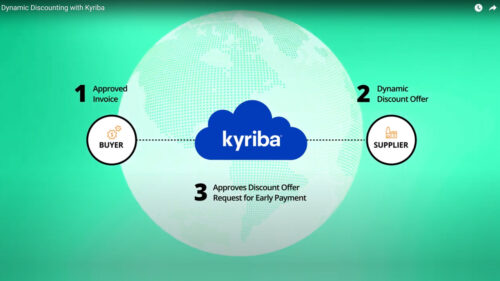 VideosWhat Is a Dynamic Discounting Solution? Kyriba Explains It in This VideoDynamic discounting is an innovative business strategy that can enable organizations to save money, while at the same time providing their suppliers with an incentive to be paid earlier. This buyer-led program allows buyers...Watch the video
VideosWhat Is a Dynamic Discounting Solution? Kyriba Explains It in This VideoDynamic discounting is an innovative business strategy that can enable organizations to save money, while at the same time providing their suppliers with an incentive to be paid earlier. This buyer-led program allows buyers...Watch the video -
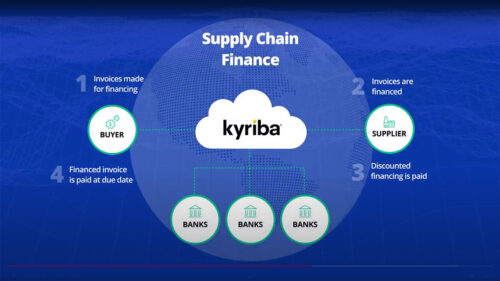 VideosSupply Chain Finance with KyribaCompanies often have a large amount of capital that is tied up in working capital, which does not generate any return or provide any growth investments. This can be a major problem for businesses,...Watch the video
VideosSupply Chain Finance with KyribaCompanies often have a large amount of capital that is tied up in working capital, which does not generate any return or provide any growth investments. This can be a major problem for businesses,...Watch the video -
 ResearchIDC Presents Kyriba with 2020 CSAT Award for Treasury ManagementIDC’s customer satisfaction award program, the CSAT Awards, recognizes the leading software-as-a-service (Saas) vendors in each application market who receive the highest customer satisfaction scores based on IDC’s SaaSPath survey.Read the Report
ResearchIDC Presents Kyriba with 2020 CSAT Award for Treasury ManagementIDC’s customer satisfaction award program, the CSAT Awards, recognizes the leading software-as-a-service (Saas) vendors in each application market who receive the highest customer satisfaction scores based on IDC’s SaaSPath survey.Read the Report -
 Research, Currency Impact ReportsKyriba’s April 2020 Currency Impact ReportThe April 2020 Kyriba Currency Impact Report analyzes the reported effects of currencies to North American and European companies’ Q4 2019 earnings. The report serves as a key benchmarking tool for global corporations.Read the Report
Research, Currency Impact ReportsKyriba’s April 2020 Currency Impact ReportThe April 2020 Kyriba Currency Impact Report analyzes the reported effects of currencies to North American and European companies’ Q4 2019 earnings. The report serves as a key benchmarking tool for global corporations.Read the Report -
 Fact SheetsKyriba Crisis Caring ServicesSupporting Kyriba Clients During This Time of Crisis The COVID-19 outbreak has had unforeseen effects on the way we live and work, creating new challenges for treasury and finance. To offer assistance to those...Read the fact sheet
Fact SheetsKyriba Crisis Caring ServicesSupporting Kyriba Clients During This Time of Crisis The COVID-19 outbreak has had unforeseen effects on the way we live and work, creating new challenges for treasury and finance. To offer assistance to those...Read the fact sheet -
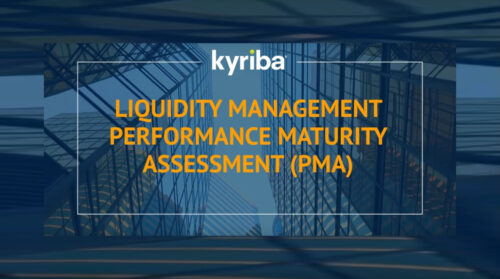 VideosKyriba Performance Maturity Assessment: How PMA WorksWondering how your treasury and liquidity management processes stack up against your industry peers? Kyriba's Performance Maturity Assessment (PMA) is an invaluable tool for any organization looking to improve their treasury and finance practices....Watch the video
VideosKyriba Performance Maturity Assessment: How PMA WorksWondering how your treasury and liquidity management processes stack up against your industry peers? Kyriba's Performance Maturity Assessment (PMA) is an invaluable tool for any organization looking to improve their treasury and finance practices....Watch the video -
 VideosDriving Value Through Diversity: Women in TreasuryThis is a video replay from Kyriba Live Vegas 2020, but the topic of diversity and inclusion for Women in Treasury is still valid today. Promoting a gender-diverse workforce isn’t just a matter of...Watch the video
VideosDriving Value Through Diversity: Women in TreasuryThis is a video replay from Kyriba Live Vegas 2020, but the topic of diversity and inclusion for Women in Treasury is still valid today. Promoting a gender-diverse workforce isn’t just a matter of...Watch the video -
 eBooks, Thought LeadershipHow CFOs turn Treasury Teams into Profit CentersTreasury operations manage the lifeblood of their companies: cash liquidity. CFOs know that their treasury teams are critically important, handling everything from cash flow forecasts to optimizing working capital, along with foreign exchange currency risk and investing and borrowing.Read the eBook
eBooks, Thought LeadershipHow CFOs turn Treasury Teams into Profit CentersTreasury operations manage the lifeblood of their companies: cash liquidity. CFOs know that their treasury teams are critically important, handling everything from cash flow forecasts to optimizing working capital, along with foreign exchange currency risk and investing and borrowing.Read the eBook -
 Videos, Success Stories2020 Kyriba Excellence Award Winner for Innovation: Emblem HealthEmblem Health won the 2020 Kyriba Excellence Award for Innovation. Hear directly from the team as they describe the catalyst behind their move to innovate and how they handle cash accounting and protect against...Watch the video
Videos, Success Stories2020 Kyriba Excellence Award Winner for Innovation: Emblem HealthEmblem Health won the 2020 Kyriba Excellence Award for Innovation. Hear directly from the team as they describe the catalyst behind their move to innovate and how they handle cash accounting and protect against...Watch the video -
 Videos, Success Stories2020 Kyriba Excellence Award Winner for Digital Transformation: Bridge Investment GroupBridge Investment Group won the 2020 Kyriba Excellence Award for Digital Transformation. Hear from the company's executive chairman, CEO, managing director-treasurer and other members of the team as they take you through the challenges...Watch the video
Videos, Success Stories2020 Kyriba Excellence Award Winner for Digital Transformation: Bridge Investment GroupBridge Investment Group won the 2020 Kyriba Excellence Award for Digital Transformation. Hear from the company's executive chairman, CEO, managing director-treasurer and other members of the team as they take you through the challenges...Watch the video -
 Success StoriesAmway’s Journey to Transforming and Centralizing Global Payments“We have standardized what were once fragmented, global payment processes across multiple ERPs, enabling automation, stronger controls and better visibility.” Janice Minter, Senior Treasury Analyst, Amway Key Payments Challenges The continued growth and global...Read the success story
Success StoriesAmway’s Journey to Transforming and Centralizing Global Payments“We have standardized what were once fragmented, global payment processes across multiple ERPs, enabling automation, stronger controls and better visibility.” Janice Minter, Senior Treasury Analyst, Amway Key Payments Challenges The continued growth and global...Read the success story -
 VideosKyriba Payments Network to Connect to over 1000 Banks – VideoThe Kyriba Payments Network helps businesses of all sizes accelerate ERP cloud migration projects and simplify global bank connectivity and format transformation projects. With Kyriba's Connectivity-as-a-Service, companies can drastically reduce the amount of time...Watch the video
VideosKyriba Payments Network to Connect to over 1000 Banks – VideoThe Kyriba Payments Network helps businesses of all sizes accelerate ERP cloud migration projects and simplify global bank connectivity and format transformation projects. With Kyriba's Connectivity-as-a-Service, companies can drastically reduce the amount of time...Watch the video -
 Success StoriesReducing FX Risk by Over 50 Percent in One Year Across 47 CurrenciesIn transitioning from legacy and largely manual processes for hedging foreign exchange (FX) risk management, the treasury department of Trane Technologies sought greater visibility and quantification of its exposures. This involved partnering with a...Read the success story
Success StoriesReducing FX Risk by Over 50 Percent in One Year Across 47 CurrenciesIn transitioning from legacy and largely manual processes for hedging foreign exchange (FX) risk management, the treasury department of Trane Technologies sought greater visibility and quantification of its exposures. This involved partnering with a...Read the success story -
 Success StoriesJourney to the Top: Digital Transformation at Royal FrieslandCampinaFive years ago, its corporate treasury team initiated a journey from corporate policy maker towards a strategic and pro-active corporate treasury department. With a centralized operations team as part of a new organisational set-up....Read the success story
Success StoriesJourney to the Top: Digital Transformation at Royal FrieslandCampinaFive years ago, its corporate treasury team initiated a journey from corporate policy maker towards a strategic and pro-active corporate treasury department. With a centralized operations team as part of a new organisational set-up....Read the success story -
 Success StoriesFrieslandCampina’s Route to a Higher Treasury LevelFrieslandCampina has branch offices in 34 countries and employs around 23,000 people. It is not a listed company, but a cooperative, in which the member dairy farmers in the Netherlands, Germany and Belgium fully...Read the success story
Success StoriesFrieslandCampina’s Route to a Higher Treasury LevelFrieslandCampina has branch offices in 34 countries and employs around 23,000 people. It is not a listed company, but a cooperative, in which the member dairy farmers in the Netherlands, Germany and Belgium fully...Read the success story -
 eBooks, Thought LeadershipAFP Guide to How Strong Treasury Policies Support Best Practices in TreasuryA treasury department is only as good as the policies and procedures it has in place. Whether they are formal, specific policies or just general guidelines, treasury needs to have a cohesive framework to...Read the eBook
eBooks, Thought LeadershipAFP Guide to How Strong Treasury Policies Support Best Practices in TreasuryA treasury department is only as good as the policies and procedures it has in place. Whether they are formal, specific policies or just general guidelines, treasury needs to have a cohesive framework to...Read the eBook -
 Success StoriesWanhua Reduces Its Manual Payments by 98% in Less Than Six MonthsA Fragmented View In 2010, Wanhua began the process of upgrading its finance technology. At the time, it relied on numerous e-banking solutions, which was not only inefficient but resulted in the business having...Read the success story
Success StoriesWanhua Reduces Its Manual Payments by 98% in Less Than Six MonthsA Fragmented View In 2010, Wanhua began the process of upgrading its finance technology. At the time, it relied on numerous e-banking solutions, which was not only inefficient but resulted in the business having...Read the success story -
 Research, Thought LeadershipStrategic Treasurer 2019 Analyst Report Series: Treasury AggregatorsIn today’s ever-changing business environment, there are several key factors that are driving change across the treasury aggregation landscape. Strategic Treasurer’s Treasury Aggregator Analyst Report outlines these key factors and provides other helpful information.Read the Report
Research, Thought LeadershipStrategic Treasurer 2019 Analyst Report Series: Treasury AggregatorsIn today’s ever-changing business environment, there are several key factors that are driving change across the treasury aggregation landscape. Strategic Treasurer’s Treasury Aggregator Analyst Report outlines these key factors and provides other helpful information.Read the Report -
 Research, Thought LeadershipStrategic Treasurer 2019 Analyst Report Series: Treasury and Risk Management SystemsThe latest Strategic Treasurer Analyst Report provides a glimpse into the current TMS space and outlines the primary benefits of a treasury management system. This latest report dives into how your peers are thinking...Read the Report
Research, Thought LeadershipStrategic Treasurer 2019 Analyst Report Series: Treasury and Risk Management SystemsThe latest Strategic Treasurer Analyst Report provides a glimpse into the current TMS space and outlines the primary benefits of a treasury management system. This latest report dives into how your peers are thinking...Read the Report -
 Research, Thought LeadershipIDC MarketScape: Worldwide SaaS and Cloud-Enabled Enterprise Treasury and Risk Management Applications 2019–2020 Vendor AssessmentPlease see the Appendix for detailed methodology, market definition, and scoring criteria. In This Excerpt The content for this excerpt was taken directly from IDC MarketScape: Worldwide SaaS and Cloud-Enabled Enterprise Treasury and Risk...Read the Report
Research, Thought LeadershipIDC MarketScape: Worldwide SaaS and Cloud-Enabled Enterprise Treasury and Risk Management Applications 2019–2020 Vendor AssessmentPlease see the Appendix for detailed methodology, market definition, and scoring criteria. In This Excerpt The content for this excerpt was taken directly from IDC MarketScape: Worldwide SaaS and Cloud-Enabled Enterprise Treasury and Risk...Read the Report -
 Success StoriesHow Scientist.com is Saving Lives with Early Payment OptionsThe Need for Accessible Supply Chain Finance Funding has historically been an issue for small and medium-sized suppliers of research services in the preclinical outsourcing sector. These companies are often forced to accept 120-day...Read the success story
Success StoriesHow Scientist.com is Saving Lives with Early Payment OptionsThe Need for Accessible Supply Chain Finance Funding has historically been an issue for small and medium-sized suppliers of research services in the preclinical outsourcing sector. These companies are often forced to accept 120-day...Read the success story -
 eBooks, Thought LeadershipAFP Executive Guide to Emerging Technologies Part 2: Artificial Intelligence and Machine LearningEmerging technologies are changing finance functions from the top down. In particular, treasury and finance executives must evaluate how treasury technology can enhance their overall operations. Read part two of AFP's Executive Guide to...Read the eBook
eBooks, Thought LeadershipAFP Executive Guide to Emerging Technologies Part 2: Artificial Intelligence and Machine LearningEmerging technologies are changing finance functions from the top down. In particular, treasury and finance executives must evaluate how treasury technology can enhance their overall operations. Read part two of AFP's Executive Guide to...Read the eBook -
 eBooks, Thought LeadershipFintech: Breaking Down the BarriersFintech has become more than just a buzzword. Major banks and multinational corporations have top executives focused on it, looking at ways the growing throng of solutions out there may be able to help their businesses. AFP has taken note of the growing fintech revolution, launching AFP Mindshift at AFP 2017—a host of sessions and events that explore how new technology relates to treasury and finance.Read the eBook
eBooks, Thought LeadershipFintech: Breaking Down the BarriersFintech has become more than just a buzzword. Major banks and multinational corporations have top executives focused on it, looking at ways the growing throng of solutions out there may be able to help their businesses. AFP has taken note of the growing fintech revolution, launching AFP Mindshift at AFP 2017—a host of sessions and events that explore how new technology relates to treasury and finance.Read the eBook -
 Research, Thought LeadershipHackett Group: A Strategic Approach to Managing Corporate LiquidityAfter a decade of uninterrupted economic expansion, this past summer saw a slowdown of growth in China and Europe, indications of a softer U.S. economy, the threat of protracted trade wars and a spike...Read the Report
Research, Thought LeadershipHackett Group: A Strategic Approach to Managing Corporate LiquidityAfter a decade of uninterrupted economic expansion, this past summer saw a slowdown of growth in China and Europe, indications of a softer U.S. economy, the threat of protracted trade wars and a spike...Read the Report -
 Research, Thought LeadershipOctober 2019 Currency Impact ReportThe October 2019 Kyriba Currency Impact Report analyzes the reported effects of currencies to North American and European companies’ Q2 2019 earnings. The report serves as a key benchmarking tool for global corporations.Read the Report
Research, Thought LeadershipOctober 2019 Currency Impact ReportThe October 2019 Kyriba Currency Impact Report analyzes the reported effects of currencies to North American and European companies’ Q2 2019 earnings. The report serves as a key benchmarking tool for global corporations.Read the Report -
 Research, Currency Impact ReportsKyriba’s July 2019 Currency Impact ReportThe July 2019 Kyriba Currency Impact Report, compiled by FiREapps, a Kyriba Company, analyzes the reported effects of currencies to North American and European companies’ Q1 2019 earnings. The report serves as a key...Read the Report
Research, Currency Impact ReportsKyriba’s July 2019 Currency Impact ReportThe July 2019 Kyriba Currency Impact Report, compiled by FiREapps, a Kyriba Company, analyzes the reported effects of currencies to North American and European companies’ Q1 2019 earnings. The report serves as a key...Read the Report -
 eBooks, Thought LeadershipAFP Executive Guide to Emerging Technologies Part 1: Robotic Process AutomationIn the past, building a case for adopting new technology has proven to be a huge obstacle for treasury and finance teams. However, with emerging technologies such as RPA (robotic process automation) and AI...Read the eBook
eBooks, Thought LeadershipAFP Executive Guide to Emerging Technologies Part 1: Robotic Process AutomationIn the past, building a case for adopting new technology has proven to be a huge obstacle for treasury and finance teams. However, with emerging technologies such as RPA (robotic process automation) and AI...Read the eBook -
 Research, Thought LeadershipAite Matrix Evaluation: Corporate Treasury Management Systems’ ReadinessCorporate treasurers are aware that the personal computing systems used for handling administrative and repetitive tasks are quickly becoming unfit to deal with frequent market changes and to manage complex data transactions between multiple parties and institutions.Read the Report
Research, Thought LeadershipAite Matrix Evaluation: Corporate Treasury Management Systems’ ReadinessCorporate treasurers are aware that the personal computing systems used for handling administrative and repetitive tasks are quickly becoming unfit to deal with frequent market changes and to manage complex data transactions between multiple parties and institutions.Read the Report -
 VideosTips from Kyriba Clients to Get the Most Out of a TMSA treasury management system is one of the most important tools available to today’s treasury professionals. And as more organizations adopt treasury systems, there is a greater need to increase usage and deliver value....Watch the video
VideosTips from Kyriba Clients to Get the Most Out of a TMSA treasury management system is one of the most important tools available to today’s treasury professionals. And as more organizations adopt treasury systems, there is a greater need to increase usage and deliver value....Watch the video -
 eBooksThe Chief Liquidity Officer: The CFOs New Secret Weapon for Enhancing Growth and Enterprise ValueCompanies that want to grow need money – but even for promising projects, external sources of finance can be difficult and expensive to access. However, for many companies, there is a secret and untapped source of cash available to them: the estimated $1.1 trillion worth of liquidity trapped inside companies’ accounts and operations. The problem is one that has existed forever: how to identify and release liquidity across the company.Read the eBook
eBooksThe Chief Liquidity Officer: The CFOs New Secret Weapon for Enhancing Growth and Enterprise ValueCompanies that want to grow need money – but even for promising projects, external sources of finance can be difficult and expensive to access. However, for many companies, there is a secret and untapped source of cash available to them: the estimated $1.1 trillion worth of liquidity trapped inside companies’ accounts and operations. The problem is one that has existed forever: how to identify and release liquidity across the company.Read the eBook -
 Research, Thought LeadershipStrategic Treasurer – Global Payments Survey Report 2019The landscape of global payments is evolving as concerns of fraud and the desire for more efficient processes increase. To give insight into how treasury organizations are thinking about the future of payments, Kyriba commissioned Strategic Treasurer to survey more than 300 organizations to gain a more comprehensive view of the global payments environment.Read the Report
Research, Thought LeadershipStrategic Treasurer – Global Payments Survey Report 2019The landscape of global payments is evolving as concerns of fraud and the desire for more efficient processes increase. To give insight into how treasury organizations are thinking about the future of payments, Kyriba commissioned Strategic Treasurer to survey more than 300 organizations to gain a more comprehensive view of the global payments environment.Read the Report -
 Fact SheetsTreasury Management for Insurance CompaniesKyriba treasury management for insurance companies empowers a large community of insurance businesses to achieve 100 percent global cash visibility, enhance fraud protection and compliance, and centralize global payment systems to increase efficiency and...Read the fact sheet
Fact SheetsTreasury Management for Insurance CompaniesKyriba treasury management for insurance companies empowers a large community of insurance businesses to achieve 100 percent global cash visibility, enhance fraud protection and compliance, and centralize global payment systems to increase efficiency and...Read the fact sheet -
 Fact SheetsFX Gain/Loss AnalyticsUncovering the Source of Unexpected FX Results FX gain/loss analysis can be time-consuming and difficult to perform during month-end and quarter-end reporting periods. Invariably, treasury and accounting teams are left scrambling to isolate and analyze the source of unexpected FX results. To combat this difficult task, Kyriba delivers two levels of analytics for companies working in a daily or single rate environment:Read the fact sheet
Fact SheetsFX Gain/Loss AnalyticsUncovering the Source of Unexpected FX Results FX gain/loss analysis can be time-consuming and difficult to perform during month-end and quarter-end reporting periods. Invariably, treasury and accounting teams are left scrambling to isolate and analyze the source of unexpected FX results. To combat this difficult task, Kyriba delivers two levels of analytics for companies working in a daily or single rate environment:Read the fact sheet -
 Fact SheetsCost and Risk Efficiency AnalysisKyriba’s Cost and Risk Efficiency (CoRE) Analysis benchmarks current FX exposure, determines potential impact to earnings and provides recommendations to reduce risk and costs. Create a Greater Roadmap to Cost and Risk Reduction Kyriba...Read the fact sheet
Fact SheetsCost and Risk Efficiency AnalysisKyriba’s Cost and Risk Efficiency (CoRE) Analysis benchmarks current FX exposure, determines potential impact to earnings and provides recommendations to reduce risk and costs. Create a Greater Roadmap to Cost and Risk Reduction Kyriba...Read the fact sheet -
 Fact SheetsTrade Netting and AllocationKyriba’s Trade Netting and Allocation solution enables finance and treasury professionals to cost-effectively manage FX exposure by automating the netting of external currency pair trades and the generation of internal trades to allocate trades...Read the fact sheet
Fact SheetsTrade Netting and AllocationKyriba’s Trade Netting and Allocation solution enables finance and treasury professionals to cost-effectively manage FX exposure by automating the netting of external currency pair trades and the generation of internal trades to allocate trades...Read the fact sheet -
 Fact SheetsTreasury Technology for Financial Services: The Art of the PossibleCorporate treasurers have long had access to systems catering to their needs for cash management, payments and working capital. But treasurers of financial services companies such as banks and investment managers have a distinct...Read the fact sheet
Fact SheetsTreasury Technology for Financial Services: The Art of the PossibleCorporate treasurers have long had access to systems catering to their needs for cash management, payments and working capital. But treasurers of financial services companies such as banks and investment managers have a distinct...Read the fact sheet -
 FAQsWhat is Cash and Liquidity Management?Cash and liquidity management refers to how companies manage their finances to maintain solvency and optimize financial efficiency.Read More
FAQsWhat is Cash and Liquidity Management?Cash and liquidity management refers to how companies manage their finances to maintain solvency and optimize financial efficiency.Read More -
 FAQsWhat is FX Risk?FX risk, also known as foreign exchange risk, refers to the potential losses that an international financial transaction may incur due to fluctuations in currency exchange rates.Read More
FAQsWhat is FX Risk?FX risk, also known as foreign exchange risk, refers to the potential losses that an international financial transaction may incur due to fluctuations in currency exchange rates.Read More -
 FAQsWhat is a Payment Hub?A payment hub is a centralized hub where all payment streams across an organization are consolidated and processed in a centralized manner.Read More
FAQsWhat is a Payment Hub?A payment hub is a centralized hub where all payment streams across an organization are consolidated and processed in a centralized manner.Read More -
 FAQsWhat is Payables Finance?Payables finance, also known as accounts payable (AP) financing, is a form of working capital financing that enables businesses to access liquidity tied up in outstanding invoices. Payables finance is a form of short-term...Read More
FAQsWhat is Payables Finance?Payables finance, also known as accounts payable (AP) financing, is a form of working capital financing that enables businesses to access liquidity tied up in outstanding invoices. Payables finance is a form of short-term...Read More -
 FAQsWhat is Working Capital Management?Working capital management involves managing a company's short-term assets and liabilities to ensure efficient use of resources and maintain the financial health of the business.Read More
FAQsWhat is Working Capital Management?Working capital management involves managing a company's short-term assets and liabilities to ensure efficient use of resources and maintain the financial health of the business.Read More -
 Fact SheetsOptimizing Working Capital Through Early Payment FinancingWorking Capital Optimization is a strategic objective for CFOs as they fight to generate bottom line value and generate free cash flow. Kyriba offers CFOs two compelling benefits: the ability to improve working capital,...Read the fact sheet
Fact SheetsOptimizing Working Capital Through Early Payment FinancingWorking Capital Optimization is a strategic objective for CFOs as they fight to generate bottom line value and generate free cash flow. Kyriba offers CFOs two compelling benefits: the ability to improve working capital,...Read the fact sheet -
 Fact SheetsKyriba – The Global Leader in Cloud Treasury SolutionsKyriba’s Enterprise Liquidity Management Platform offers Treasury and Risk, Connectivity, Payments, and Working Capital solutions delivering visibility, controls, productivity and data-driven decision making for CFOs and their teams. Delivered through our open API platform,...Read the fact sheet
Fact SheetsKyriba – The Global Leader in Cloud Treasury SolutionsKyriba’s Enterprise Liquidity Management Platform offers Treasury and Risk, Connectivity, Payments, and Working Capital solutions delivering visibility, controls, productivity and data-driven decision making for CFOs and their teams. Delivered through our open API platform,...Read the fact sheet -
 FAQsWhat is Treasury Management?Treasury management is the process of managing an organization's liquidity, money market instruments, banking, concentration and disbursement activities.Read More
FAQsWhat is Treasury Management?Treasury management is the process of managing an organization's liquidity, money market instruments, banking, concentration and disbursement activities.Read More -
 Fact SheetsCash and Liquidity ManagementCash and Liquidity ManagementRead the fact sheet
Fact SheetsCash and Liquidity ManagementCash and Liquidity ManagementRead the fact sheet -
 Fact SheetsTreasury Management for Healthcare ProvidersHealthcare providers are faced with a unique set of challenges compared to other organizations, including unprecedented M&A activity. Kyriba’s experience in working with major providers ensures that it can help address these challenges quickly...Read the fact sheet
Fact SheetsTreasury Management for Healthcare ProvidersHealthcare providers are faced with a unique set of challenges compared to other organizations, including unprecedented M&A activity. Kyriba’s experience in working with major providers ensures that it can help address these challenges quickly...Read the fact sheet -
 Success StoriesHow Kimberly-Clark Gained an Accurate Picture of Its ExposureThe Kimberly-Clark Challenge Kimberly-Clark’s former approach to managing currency exposure was highly manual and lacked standardization. Despite using a daily FX rate many entities had different processes and logic for defining FX exposure and...Read the success story
Success StoriesHow Kimberly-Clark Gained an Accurate Picture of Its ExposureThe Kimberly-Clark Challenge Kimberly-Clark’s former approach to managing currency exposure was highly manual and lacked standardization. Despite using a daily FX rate many entities had different processes and logic for defining FX exposure and...Read the success story -
 Fact SheetsLiquidity Management Performance Maturity AssessmentWHAT IS IT? A tailored online survey to assess an organization’s current practices in liquidity management in 3 parts. BENEFITS • Score current liquidity management processes against a maturity model scale • Benchmark against...Read the fact sheet
Fact SheetsLiquidity Management Performance Maturity AssessmentWHAT IS IT? A tailored online survey to assess an organization’s current practices in liquidity management in 3 parts. BENEFITS • Score current liquidity management processes against a maturity model scale • Benchmark against...Read the fact sheet -
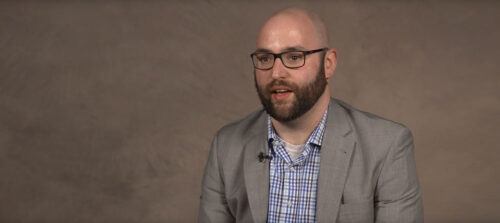 Videos, Success StoriesKyriba and Grameen Bank: A Success Story – VideoAs a micro-finance institution, Grameen needed a solution that brought reconciliation and forecasting all into one place. In working with Kyriba, Grameen's treasury team automated their processes and has been able to leverage valid...Watch the video
Videos, Success StoriesKyriba and Grameen Bank: A Success Story – VideoAs a micro-finance institution, Grameen needed a solution that brought reconciliation and forecasting all into one place. In working with Kyriba, Grameen's treasury team automated their processes and has been able to leverage valid...Watch the video -
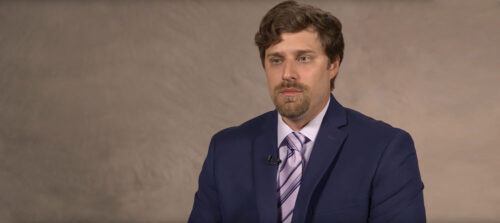 Videos, Success StoriesScientist.com Finance Case Study VideoScientist.com is the world’s leading enterprise gateway marketplace for outsourced research and development. The marketplace simplifies R&D sourcing, saving time and money, reducing risk and providing access to the latest innovative tools and technologies....Watch the video
Videos, Success StoriesScientist.com Finance Case Study VideoScientist.com is the world’s leading enterprise gateway marketplace for outsourced research and development. The marketplace simplifies R&D sourcing, saving time and money, reducing risk and providing access to the latest innovative tools and technologies....Watch the video -
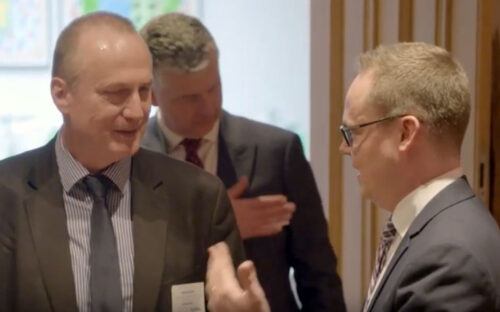 VideosLondon Payments & Fraud ForumKyriba was recently delighted to host speakers from Rentokil and SWIFT at a forum in London discussing the challenges around payments processing and fraud. Click below to hear more...Watch the video
VideosLondon Payments & Fraud ForumKyriba was recently delighted to host speakers from Rentokil and SWIFT at a forum in London discussing the challenges around payments processing and fraud. Click below to hear more...Watch the video -
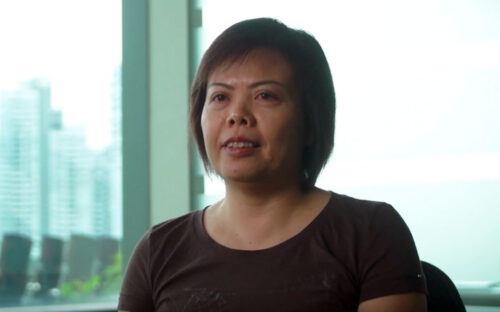 Videos, Success Stories3 Treasury Transformation Stories: Asian Organizations Transform Treasury with KyribaWatch this video to learn how Crown World Mobility in Hong Kong, DT One in Singapore and Tan Chong Motor Holdings in Kuala Lumpur have partnered with Kyriba for treasury transformation. About Crown World...Watch the video
Videos, Success Stories3 Treasury Transformation Stories: Asian Organizations Transform Treasury with KyribaWatch this video to learn how Crown World Mobility in Hong Kong, DT One in Singapore and Tan Chong Motor Holdings in Kuala Lumpur have partnered with Kyriba for treasury transformation. About Crown World...Watch the video -
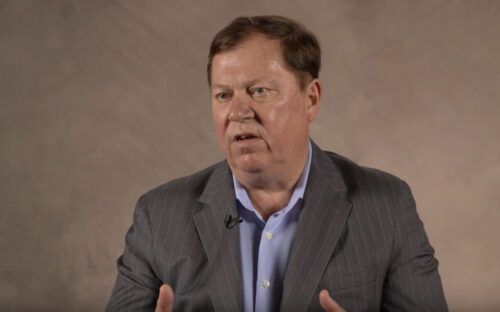 VideosKyriba + FIREapps: The Industry’s Most Advanced Solution for Managing FX RiskJean-Luc Robert, Chairman and CEO at Kyriba, Wolfgang Koester, Chief Evangelist at Kyriba and Andy Gage, VP FX Risk Management Solutions at Kyriba discuss why the combination of Kyriba and FiREapps makes perfect sense.Watch the video
VideosKyriba + FIREapps: The Industry’s Most Advanced Solution for Managing FX RiskJean-Luc Robert, Chairman and CEO at Kyriba, Wolfgang Koester, Chief Evangelist at Kyriba and Andy Gage, VP FX Risk Management Solutions at Kyriba discuss why the combination of Kyriba and FiREapps makes perfect sense.Watch the video -
 Research, Currency Impact ReportsKyriba’s May 2019 Currency Impact ReportThe May 2019 Kyriba Currency Impact Report, compiled by FiREapps, a Kyriba Company, analyzes the reported effects of currencies to North American and European companies’ Q4 2018 earnings. The report serves as a key...Read the Report
Research, Currency Impact ReportsKyriba’s May 2019 Currency Impact ReportThe May 2019 Kyriba Currency Impact Report, compiled by FiREapps, a Kyriba Company, analyzes the reported effects of currencies to North American and European companies’ Q4 2018 earnings. The report serves as a key...Read the Report -
 Fact SheetsFX Cash Flow Exposure ForecastingFX Cash Flow enables finance and treasury professionals to create, analyze and manage accurate cash flow exposure forecasts. A Collaborative Workflow Solution Kyriba offers distributed access for upload, entry and verification of cash flow...Read the fact sheet
Fact SheetsFX Cash Flow Exposure ForecastingFX Cash Flow enables finance and treasury professionals to create, analyze and manage accurate cash flow exposure forecasts. A Collaborative Workflow Solution Kyriba offers distributed access for upload, entry and verification of cash flow...Read the fact sheet -
 Fact SheetsFX Balance SheetFX Balance Sheet enables treasury professionals to measure, monitor and manage currency exposure and the associated risk from their balance sheet. Accurate, Complete and Timely Data For treasury teams to effectively understand and manage...Read the fact sheet
Fact SheetsFX Balance SheetFX Balance Sheet enables treasury professionals to measure, monitor and manage currency exposure and the associated risk from their balance sheet. Accurate, Complete and Timely Data For treasury teams to effectively understand and manage...Read the fact sheet -
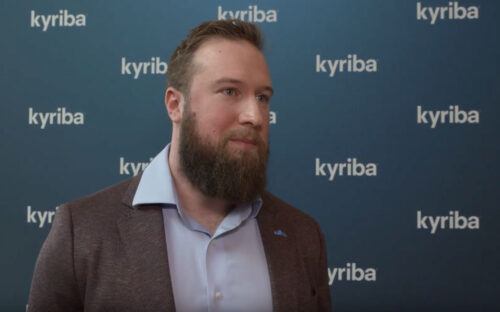 Videos, Success StoriesThe Kyriba Customer ExperienceWhat is the Kyriba Customer Experience? Kyriba provides cloud-based cash and liquidity management solutions for treasury, payments, risk management, and working capital. The Kyriba Customer Experience is designed to be intuitive, seamless, and efficient,...Watch the video
Videos, Success StoriesThe Kyriba Customer ExperienceWhat is the Kyriba Customer Experience? Kyriba provides cloud-based cash and liquidity management solutions for treasury, payments, risk management, and working capital. The Kyriba Customer Experience is designed to be intuitive, seamless, and efficient,...Watch the video -
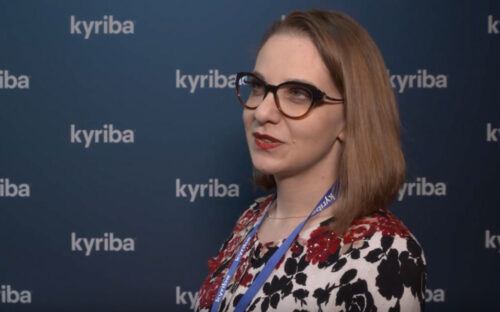 VideosWhat Kyriba Customers Love About TreasuryWhat do Kyriba customers love most about treasury? The challenging and innovative nature of the treasury department and how it serves as the backbone of the organization are just a few of the reasons...Watch the video
VideosWhat Kyriba Customers Love About TreasuryWhat do Kyriba customers love most about treasury? The challenging and innovative nature of the treasury department and how it serves as the backbone of the organization are just a few of the reasons...Watch the video -
 Research, Thought LeadershipStrategic Treasurer 2019 Supply Chain Finance Survey ReportAlthough supply chain finance (SCF) programs have been around for decades, the platforms and services have continued to grow and evolve. As a result, corporates are becoming more and more interested in SCF solutions as liquidity needs grow more pronounced and internal initiatives demand better insight into cash management.Read the Report
Research, Thought LeadershipStrategic Treasurer 2019 Supply Chain Finance Survey ReportAlthough supply chain finance (SCF) programs have been around for decades, the platforms and services have continued to grow and evolve. As a result, corporates are becoming more and more interested in SCF solutions as liquidity needs grow more pronounced and internal initiatives demand better insight into cash management.Read the Report -
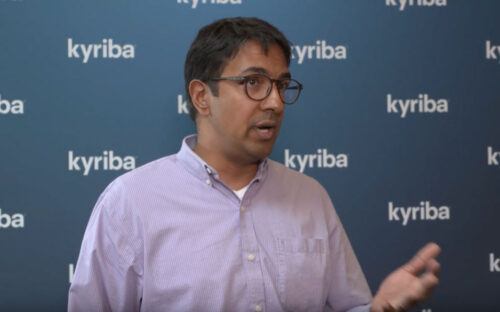 Videos, Success StoriesHow Customers Benefit from KyribaKyriba customers share the benefits they’ve experienced using Kyriba, including the ease-of-use, real-time visibility into cash, automation of formerly manual tasks, and enhanced security.Watch the video
Videos, Success StoriesHow Customers Benefit from KyribaKyriba customers share the benefits they’ve experienced using Kyriba, including the ease-of-use, real-time visibility into cash, automation of formerly manual tasks, and enhanced security.Watch the video -
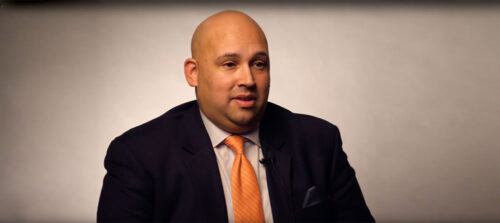 Videos, Success StoriesEmblemHealth Case Study – Charlton CorreaAmong the key reasons why EmblemHealth chose Kyriba was the cloudbase. That was just huge for us. And the fact that there's no IT intervention that was another huge plus during all the different...Watch the video
Videos, Success StoriesEmblemHealth Case Study – Charlton CorreaAmong the key reasons why EmblemHealth chose Kyriba was the cloudbase. That was just huge for us. And the fact that there's no IT intervention that was another huge plus during all the different...Watch the video -
 Videos, Success StoriesRyerson Case Study – Lina RauhTreasury was very manual. We were losing a lot of time every day doing the same functions over and over and getting the same data out of the bank. By implementing Kyriba we've streamlined...Watch the video
Videos, Success StoriesRyerson Case Study – Lina RauhTreasury was very manual. We were losing a lot of time every day doing the same functions over and over and getting the same data out of the bank. By implementing Kyriba we've streamlined...Watch the video -
 Research, Thought LeadershipTechnology Is the Key to Unlocking Trapped LiquidityThe ever-shifting regulatory landscape and growing geopolitical uncertainty have forced companies to look inward more than ever to fund business growth. The treasurer must take the lead in finding and mobilizing internal sources of...Read the Report
Research, Thought LeadershipTechnology Is the Key to Unlocking Trapped LiquidityThe ever-shifting regulatory landscape and growing geopolitical uncertainty have forced companies to look inward more than ever to fund business growth. The treasurer must take the lead in finding and mobilizing internal sources of...Read the Report -
 Fact SheetsCachematrix™ by BlackRock: Optimized Investment OptionsToday’s corporate treasurer needs tools to help their teams achieve more with less. Too often, many treasury application remain disconnected and disjointed, leaving treasury investment workflow dependent upon manual efforts. Kyriba and BlackRock are...Read the fact sheet
Fact SheetsCachematrix™ by BlackRock: Optimized Investment OptionsToday’s corporate treasurer needs tools to help their teams achieve more with less. Too often, many treasury application remain disconnected and disjointed, leaving treasury investment workflow dependent upon manual efforts. Kyriba and BlackRock are...Read the fact sheet -
 Research, Thought LeadershipHackett Group: How CFOs Can Mitigate the Risk of Payments Fraud?Executive Summary As custodians of the company’s monetary assets, CFOs are responsible for safeguarding the enterprise from threats to its financial health, especially those that can result from processes within the finance domain, such...Read the Report
Research, Thought LeadershipHackett Group: How CFOs Can Mitigate the Risk of Payments Fraud?Executive Summary As custodians of the company’s monetary assets, CFOs are responsible for safeguarding the enterprise from threats to its financial health, especially those that can result from processes within the finance domain, such...Read the Report -
 eBooks, Thought LeadershipAFP Guide to Best Practices in Treasury ConnectivityDiscover 6 best practices in treasury connectivity. Research essential emerging technologies for bank connectivity, ERP systems and more.Read the eBook
eBooks, Thought LeadershipAFP Guide to Best Practices in Treasury ConnectivityDiscover 6 best practices in treasury connectivity. Research essential emerging technologies for bank connectivity, ERP systems and more.Read the eBook -
 Research, Thought Leadership2018 Strategic Treasurer Analyst Report: Supply Chain Finance Programs and TechnologySupply Chain Finance Analyst Report focuses on understanding how SCF can maximize efficiency and optimize cash resources by examining the leading strategies and technologies employed by companies today.Read the Report
Research, Thought Leadership2018 Strategic Treasurer Analyst Report: Supply Chain Finance Programs and TechnologySupply Chain Finance Analyst Report focuses on understanding how SCF can maximize efficiency and optimize cash resources by examining the leading strategies and technologies employed by companies today.Read the Report -
 Research, Thought Leadership2018 Strategic Treasurer Analyst Report: Treasury and Risk Management SystemsThe Treasury and Risk Management Systems (“TMS”) Analyst Report offers a thorough evaluation of the TMS space by providing the data behind which areas of functionality corporates are planning to invest in, the types...Read the Report
Research, Thought Leadership2018 Strategic Treasurer Analyst Report: Treasury and Risk Management SystemsThe Treasury and Risk Management Systems (“TMS”) Analyst Report offers a thorough evaluation of the TMS space by providing the data behind which areas of functionality corporates are planning to invest in, the types...Read the Report -
 Research, Thought Leadership2018 Strategic Treasurer Analyst Report: Treasury AggregatorsThe Treasury Aggregator Analyst Report focuses on the financial technology solutions that provide sophisticated bank connectivity, payments, security, compliance, and cash management functionality to corporations.Read the Report
Research, Thought Leadership2018 Strategic Treasurer Analyst Report: Treasury AggregatorsThe Treasury Aggregator Analyst Report focuses on the financial technology solutions that provide sophisticated bank connectivity, payments, security, compliance, and cash management functionality to corporations.Read the Report -
 eBooks, Thought LeadershipInsights from CFOs: Three Areas Treasury Can Enhance Its Role in Corporate Liquidity ManagementFew functions are more fundamental to the corporate enterprise than treasury. Few have a longer history, either. Managing cash and liquidity, along with all attendant processes and risks, have been critical undertakings for as...Read the eBook
eBooks, Thought LeadershipInsights from CFOs: Three Areas Treasury Can Enhance Its Role in Corporate Liquidity ManagementFew functions are more fundamental to the corporate enterprise than treasury. Few have a longer history, either. Managing cash and liquidity, along with all attendant processes and risks, have been critical undertakings for as...Read the eBook -
 Success StoriesHow HCSC Created a High-Performance TreasuryBy investing in technology, Health Care Service Corporation perfected its cash visibility and reduced working capital holdings by $3.95 billion. Escaping the drudgery of manual processes, the treasury team was equipped to deliver advanced...Read the success story
Success StoriesHow HCSC Created a High-Performance TreasuryBy investing in technology, Health Care Service Corporation perfected its cash visibility and reduced working capital holdings by $3.95 billion. Escaping the drudgery of manual processes, the treasury team was equipped to deliver advanced...Read the success story -
 Success StoriesHow Treasury Centralization is Helping Ola Energy Increase Efficiency by 80% and Reduce Costs by 20%With 34 affiliate companies working in 20 different currencies, Ola Energy’s 105 banking partners are responsible for more than 400,000 transactions per year. So it’s not surprising that Ola Energy Group Treasurer Abdessalem Lassoued...Read the success story
Success StoriesHow Treasury Centralization is Helping Ola Energy Increase Efficiency by 80% and Reduce Costs by 20%With 34 affiliate companies working in 20 different currencies, Ola Energy’s 105 banking partners are responsible for more than 400,000 transactions per year. So it’s not surprising that Ola Energy Group Treasurer Abdessalem Lassoued...Read the success story -
 Success StoriesDriving the Wheels of Change for Improved Control and Efficiency at Tan Chong Motor HoldingsFollowing the rigorous selection process, TCMH chose Kyriba for cash management, cash forecasting, risk management and bank connectivity using SWIFT Alliance Lite2 for Business Applications. The combined solution suite was deemed the best fit for digitizing its treasury function and adding strategic value to the organization.Read the success story
Success StoriesDriving the Wheels of Change for Improved Control and Efficiency at Tan Chong Motor HoldingsFollowing the rigorous selection process, TCMH chose Kyriba for cash management, cash forecasting, risk management and bank connectivity using SWIFT Alliance Lite2 for Business Applications. The combined solution suite was deemed the best fit for digitizing its treasury function and adding strategic value to the organization.Read the success story -
 eBooksAchieving Maximum Cash Visibility: A Best Practice GuideMaximizing the visibility of the cash surpluses and shortages in a corporate organization invariably scores highly in industry surveys of corporate treasurers’ priority objectives. Ever since the financial crisis, the efficient management of internal...Read the eBook
eBooksAchieving Maximum Cash Visibility: A Best Practice GuideMaximizing the visibility of the cash surpluses and shortages in a corporate organization invariably scores highly in industry surveys of corporate treasurers’ priority objectives. Ever since the financial crisis, the efficient management of internal...Read the eBook -
 Success StoriesHarnessing the Power of Emerging TechnologyThe Government of Sharjah embraces HSBC’s digital transaction banking solutions and Kyriba’s cloud-based Treasury Management System to benefit from advancing treasury technology.Read the success story
Success StoriesHarnessing the Power of Emerging TechnologyThe Government of Sharjah embraces HSBC’s digital transaction banking solutions and Kyriba’s cloud-based Treasury Management System to benefit from advancing treasury technology.Read the success story -
 Research, Thought LeadershipThe CFO as the Chief Growth OfficerExecutive Summary CFOs are working side by side with the CEO and board to set strategy and chart the growth trajectory of the enterprise. They are facing an increasingly volatile global business environment, one...Read the Report
Research, Thought LeadershipThe CFO as the Chief Growth OfficerExecutive Summary CFOs are working side by side with the CEO and board to set strategy and chart the growth trajectory of the enterprise. They are facing an increasingly volatile global business environment, one...Read the Report -
 Fact SheetsLiquidity Solutions for Financial ServicesKyriba enables financial services organizations to achieve global cash visibility, reduce payments fraud and improve audit and controls in finance and treasury. Kyriba improves compliance and reduces the risk of payments fraud. Current Industry...Read the fact sheet
Fact SheetsLiquidity Solutions for Financial ServicesKyriba enables financial services organizations to achieve global cash visibility, reduce payments fraud and improve audit and controls in finance and treasury. Kyriba improves compliance and reduces the risk of payments fraud. Current Industry...Read the fact sheet -
 Success StoriesZahid Tractor Optimizes Visibility & Investment of Cash Leading to a 50% Drop in Idle FundsBefore deploying Kyriba, the treasury teams at Zahid Tractor and its subsidiaries were using a variety of paper-based records and spreadsheets to control the vast portfolio of treasury transactions within the group. This became...Read the success story
Success StoriesZahid Tractor Optimizes Visibility & Investment of Cash Leading to a 50% Drop in Idle FundsBefore deploying Kyriba, the treasury teams at Zahid Tractor and its subsidiaries were using a variety of paper-based records and spreadsheets to control the vast portfolio of treasury transactions within the group. This became...Read the success story -
 Fact SheetsTreasury Management For Private Equity FirmsKyriba brings innovative technology and experience in helping private equity and alternative asset managers automate global cash and payment management workflows. Many private equity (PE) firms have insufficient systems and workflows to optimize cash...Read the fact sheet
Fact SheetsTreasury Management For Private Equity FirmsKyriba brings innovative technology and experience in helping private equity and alternative asset managers automate global cash and payment management workflows. Many private equity (PE) firms have insufficient systems and workflows to optimize cash...Read the fact sheet -
 Fact SheetsFact Sheet: Retailers Treasury Management SoftwareRetail treasury teams are faced with a very distinct set of requirements and demands compared to other organizations. Kyriba’s experience in working with major retailers like Best Buy, Coach, Williams-Sonoma and many more ensures that it can meet the unique challenges of today’s retail-focused financial professionals.Read the fact sheet
Fact SheetsFact Sheet: Retailers Treasury Management SoftwareRetail treasury teams are faced with a very distinct set of requirements and demands compared to other organizations. Kyriba’s experience in working with major retailers like Best Buy, Coach, Williams-Sonoma and many more ensures that it can meet the unique challenges of today’s retail-focused financial professionals.Read the fact sheet -
 eBooks, Thought LeadershipBusting Payable Finance Myths: KeyTrends & Issues in the Digital AgeBusting the Payable Finance Myths is designed to help Finance, Procurement, Treasury and Supply Chain professions evaluate the latest trends, issues, and perspectives impacting buyer-led early pay techniques.Read the eBook
eBooks, Thought LeadershipBusting Payable Finance Myths: KeyTrends & Issues in the Digital AgeBusting the Payable Finance Myths is designed to help Finance, Procurement, Treasury and Supply Chain professions evaluate the latest trends, issues, and perspectives impacting buyer-led early pay techniques.Read the eBook -
 Success StoriesModernizing International Supplier Finance with Reverse Factoring ProgramsFrench retail group Auchan uses reverse factoring to pay suppliers sooner without negative impact to working capital. After the global financial crisis, Auchan Group’s suppliers began asking whether their invoices could be paid sooner,...Read the success story
Success StoriesModernizing International Supplier Finance with Reverse Factoring ProgramsFrench retail group Auchan uses reverse factoring to pay suppliers sooner without negative impact to working capital. After the global financial crisis, Auchan Group’s suppliers began asking whether their invoices could be paid sooner,...Read the success story -
 Success StoriesSixty Seconds with Graff Diamonds…Graff Diamonds has been expanding its network of overseas stores since the first one opened in Monaco in 2000. It now has 45 of its own stores across Europe, Asia, the United States and...Read the success story
Success StoriesSixty Seconds with Graff Diamonds…Graff Diamonds has been expanding its network of overseas stores since the first one opened in Monaco in 2000. It now has 45 of its own stores across Europe, Asia, the United States and...Read the success story -
 Success StoriesCrown World Mobility Moves Payment Mountains with Kyriba Citing a 20% Productivity IncreaseCrown required a secure, scalable and efficient solution that would enable them to offer an innovative and professional service to clients, reducing the nonproductive global mobility costs of delivering payments worldwide. Optimizing the Outsourced...Read the success story
Success StoriesCrown World Mobility Moves Payment Mountains with Kyriba Citing a 20% Productivity IncreaseCrown required a secure, scalable and efficient solution that would enable them to offer an innovative and professional service to clients, reducing the nonproductive global mobility costs of delivering payments worldwide. Optimizing the Outsourced...Read the success story -
 Success StoriesSixty Seconds with the ILGILG is a recognized leader in the watchmaking market and an established player in the branded eyewear, jewelry and leather goods markets. The Swiss-based manufacturer and distributor has been optimizing its cash management and...Read the success story
Success StoriesSixty Seconds with the ILGILG is a recognized leader in the watchmaking market and an established player in the branded eyewear, jewelry and leather goods markets. The Swiss-based manufacturer and distributor has been optimizing its cash management and...Read the success story -
 Success StoriesLeveraging Technology to become a “Smart Treasury”In 2014, A. Schulman made the decision to embark on a global treasury transformation project to support the company’s evolving business needs in a rapidly changing market and regulatory environment. A. Schulman’s treasury team...Read the success story
Success StoriesLeveraging Technology to become a “Smart Treasury”In 2014, A. Schulman made the decision to embark on a global treasury transformation project to support the company’s evolving business needs in a rapidly changing market and regulatory environment. A. Schulman’s treasury team...Read the success story -
 Success StoriesReducing Operational Risk Through Cloud-Based Treasury TechnologyLarge private research university rethinks its treasury approach to increase efficiency and protect against loss Note: the client in this case study could not be publicly named per university policy, but the assistant treasurer...Read the success story
Success StoriesReducing Operational Risk Through Cloud-Based Treasury TechnologyLarge private research university rethinks its treasury approach to increase efficiency and protect against loss Note: the client in this case study could not be publicly named per university policy, but the assistant treasurer...Read the success story -
 Research, Thought LeadershipIDC MarketScape: Worldwide Treasury & Risk Management Applications 2017–2018Who are the biggest players in treasury and risk management, and how are cloud-based solutions driving transformation? IDC, one of the largest technology analyst firms in the world, tackles these questions and more in...Read the Report
Research, Thought LeadershipIDC MarketScape: Worldwide Treasury & Risk Management Applications 2017–2018Who are the biggest players in treasury and risk management, and how are cloud-based solutions driving transformation? IDC, one of the largest technology analyst firms in the world, tackles these questions and more in...Read the Report -
 Fact SheetsPartner Sales & Pre-sales CertificationBacked by strong incentives and market-leading technology, Kyriba delivers one of the strongest and most comprehensive partner programs in the industry. Called PartnerSURGE, the program is designed to let Kyriba’s strategic partners share in...Read the fact sheet
Fact SheetsPartner Sales & Pre-sales CertificationBacked by strong incentives and market-leading technology, Kyriba delivers one of the strongest and most comprehensive partner programs in the industry. Called PartnerSURGE, the program is designed to let Kyriba’s strategic partners share in...Read the fact sheet -
 Fact SheetsPartner Training CertificationKyriba’s Center of Excellence (COE) mission is to train and certify its valued partners. All partners working on an implementation project or post-implementation support must participate in Kyriba’s training program and earn their certification....Read the fact sheet
Fact SheetsPartner Training CertificationKyriba’s Center of Excellence (COE) mission is to train and certify its valued partners. All partners working on an implementation project or post-implementation support must participate in Kyriba’s training program and earn their certification....Read the fact sheet -
 Research, Thought LeadershipTreasury + Risk Management Systems: The Definitive GuideWhat are the latest trends in treasury, how do you know if you need a treasury management solution (TMS), and what are the common pitfalls to avoid when selecting and implementing a TMS?Read the Report
Research, Thought LeadershipTreasury + Risk Management Systems: The Definitive GuideWhat are the latest trends in treasury, how do you know if you need a treasury management solution (TMS), and what are the common pitfalls to avoid when selecting and implementing a TMS?Read the Report -
 Research, Thought LeadershipTreasury Aggregators & Bank Connectivity Solutions: The Definitive GuideStrategic Treasurer’s newest analyst report for 2017, “The Definitive Guide to Treasury Aggregation Technology Solutions,” details everything financial leaders need to know about treasury aggregators and how they simplify bank connectivity for modern treasurers.Read the Report
Research, Thought LeadershipTreasury Aggregators & Bank Connectivity Solutions: The Definitive GuideStrategic Treasurer’s newest analyst report for 2017, “The Definitive Guide to Treasury Aggregation Technology Solutions,” details everything financial leaders need to know about treasury aggregators and how they simplify bank connectivity for modern treasurers.Read the Report -
 Success StoriesModernizing Treasury: Reducing Risk and Increasing Margins through AutomationConsumer goods company, Newell Brands, has leveraged technology to complete a major treasury modernization project. In 2016, Newell Rubbermaid purchased Jarden Corporation to form a new $16 billion consumer goods company, Newell Brands. While...Read the success story
Success StoriesModernizing Treasury: Reducing Risk and Increasing Margins through AutomationConsumer goods company, Newell Brands, has leveraged technology to complete a major treasury modernization project. In 2016, Newell Rubbermaid purchased Jarden Corporation to form a new $16 billion consumer goods company, Newell Brands. While...Read the success story -
 eBooks, Thought LeadershipThe Six Key Areas Where CFOs Fail to Deliver for the Board of DirectorsIt’s been a long time since CFOs moved beyond financial reporting and accounting and added “strategic business partner to the board of directors” to their list of responsibilities. Nonetheless, a new survey from CFO...Read the eBook
eBooks, Thought LeadershipThe Six Key Areas Where CFOs Fail to Deliver for the Board of DirectorsIt’s been a long time since CFOs moved beyond financial reporting and accounting and added “strategic business partner to the board of directors” to their list of responsibilities. Nonetheless, a new survey from CFO...Read the eBook -
 eBooks, Thought LeadershipFive Key CFO Challenges for Addressing Payments FraudIt seems counterintuitive. Even as businesses spend more time and money than ever combatting payments fraud, the crime itself becomes more ubiquitous. In a new study by CFO Research, 40 percent of senior finance...Read the eBook
eBooks, Thought LeadershipFive Key CFO Challenges for Addressing Payments FraudIt seems counterintuitive. Even as businesses spend more time and money than ever combatting payments fraud, the crime itself becomes more ubiquitous. In a new study by CFO Research, 40 percent of senior finance...Read the eBook -
 Success StoriesSpotify Makes Treasury MusicInnovation - Sound Treasury Management In alignment with the company’s truly innovative approach to technology, and in support of the challenges associated with managing the exponential growth of a world class digital music service,...Read the success story
Success StoriesSpotify Makes Treasury MusicInnovation - Sound Treasury Management In alignment with the company’s truly innovative approach to technology, and in support of the challenges associated with managing the exponential growth of a world class digital music service,...Read the success story -
 Fact SheetsDerivative & Hedge AccountingKyriba delivers exposure management, mark-to-market and hedge accounting solutions to support corporate hedging programs and better facilitate regulatory compliance. Kyriba’s Valuation Engine allows fast, automated valuation postings across your entire portfolio quickly to speed...Read the fact sheet
Fact SheetsDerivative & Hedge AccountingKyriba delivers exposure management, mark-to-market and hedge accounting solutions to support corporate hedging programs and better facilitate regulatory compliance. Kyriba’s Valuation Engine allows fast, automated valuation postings across your entire portfolio quickly to speed...Read the fact sheet -
 Fact SheetsBank Relationship Management and Bank Account ManagementMultiple bank relationship management can be a challenging responsibility, particularly across multiple geographies, languages and time zones. Regardless of the size of an organization, or the number of banks and bank accounts it has,...Read the fact sheet
Fact SheetsBank Relationship Management and Bank Account ManagementMultiple bank relationship management can be a challenging responsibility, particularly across multiple geographies, languages and time zones. Regardless of the size of an organization, or the number of banks and bank accounts it has,...Read the fact sheet -
 Fact SheetsKyriba Financial Risk Management SolutionWith Kyriba Financial Risk Management Solution, CFOs and treasury teams can now manage currency risk and compliance in a single cloud platform.Read the fact sheet
Fact SheetsKyriba Financial Risk Management SolutionWith Kyriba Financial Risk Management Solution, CFOs and treasury teams can now manage currency risk and compliance in a single cloud platform.Read the fact sheet -
 Research, Thought LeadershipStrategic Treasurer: Definitive Guide to Supply Chain Finance SolutionsSupply chain finance (SCF) is becoming an increasingly popular topic among treasurers and CFO as working capital and risk management take on greater importance for modern firms. Donload this new report from Strategic Treasurer...Read the Report
Research, Thought LeadershipStrategic Treasurer: Definitive Guide to Supply Chain Finance SolutionsSupply chain finance (SCF) is becoming an increasingly popular topic among treasurers and CFO as working capital and risk management take on greater importance for modern firms. Donload this new report from Strategic Treasurer...Read the Report -
 eBooks, Thought LeadershipShort-Term Cash Forecasting: Pitfalls to AvoidA cash forecast is only as good as its source data. This seemingly simple statement underlies a reality that pervades the treasurer’s office in multinational and domestic corporations: reliable cash forecasting, even in the...Read the eBook
eBooks, Thought LeadershipShort-Term Cash Forecasting: Pitfalls to AvoidA cash forecast is only as good as its source data. This seemingly simple statement underlies a reality that pervades the treasurer’s office in multinational and domestic corporations: reliable cash forecasting, even in the...Read the eBook -
 eBooks, Thought LeadershipIs In-House Banking Right for Your Organization?What is an In-House Bank? An in-house bank provides an internal current account structure and other services to group entities, which replicate the services typically provided by an external bank. In-house banks provide services...Read the eBook
eBooks, Thought LeadershipIs In-House Banking Right for Your Organization?What is an In-House Bank? An in-house bank provides an internal current account structure and other services to group entities, which replicate the services typically provided by an external bank. In-house banks provide services...Read the eBook -
 eBooks, Thought LeadershipSeven Competitive Advantages of the Modern TreasurersIn today’s rapidly changing environment, treasurers face wide and varied challenges. Regulatory developments are amplifying treasurers’ compliance challenges, while the threat of external fraud has escalated as cybercriminals adopt more sophisticated techniques. At the...Read the eBook
eBooks, Thought LeadershipSeven Competitive Advantages of the Modern TreasurersIn today’s rapidly changing environment, treasurers face wide and varied challenges. Regulatory developments are amplifying treasurers’ compliance challenges, while the threat of external fraud has escalated as cybercriminals adopt more sophisticated techniques. At the...Read the eBook -
 Success StoriesDIC Uses the Cloud for Speed and FlexibilityUsing the Cloud for Speed and Flexibility DIC (formerly Dainippon Ink and Chemicals) was established in 1908 as a manufacturer and seller of printing inks. It now offers a broad range of products based...Read the success story
Success StoriesDIC Uses the Cloud for Speed and FlexibilityUsing the Cloud for Speed and Flexibility DIC (formerly Dainippon Ink and Chemicals) was established in 1908 as a manufacturer and seller of printing inks. It now offers a broad range of products based...Read the success story -
 Success StoriesHow Kyriba Helped Prevent a Fraudulent $8M PaymentCEO Fraud & Executive Phishing Email Attacks Are on the Rise This CEO fraud attempt started with an email from the CEO. Fortunately, the treasury team at a leading real estate developer had worked...Read the success story
Success StoriesHow Kyriba Helped Prevent a Fraudulent $8M PaymentCEO Fraud & Executive Phishing Email Attacks Are on the Rise This CEO fraud attempt started with an email from the CEO. Fortunately, the treasury team at a leading real estate developer had worked...Read the success story -
 eBooks, Thought LeadershipImplementation Success Guide: How to Maximize Your Implementation Experience with KyribaKnowing what to expect is key to any successful implementation. At Kyriba, we’ve created the best-in-class team and implementation framework – enabling you to transition smoothly to your new system, with less stress and...Read the eBook
eBooks, Thought LeadershipImplementation Success Guide: How to Maximize Your Implementation Experience with KyribaKnowing what to expect is key to any successful implementation. At Kyriba, we’ve created the best-in-class team and implementation framework – enabling you to transition smoothly to your new system, with less stress and...Read the eBook -
 eBooks, Thought LeadershipAFP Tip Guide: Putting Your Connectivity on LockdownMaintaining the security of bank connections is vital for any treasury department. Treasurers move money every day, and if that movement is not secure, there’s no telling whose hands it could end up in....Read the eBook
eBooks, Thought LeadershipAFP Tip Guide: Putting Your Connectivity on LockdownMaintaining the security of bank connections is vital for any treasury department. Treasurers move money every day, and if that movement is not secure, there’s no telling whose hands it could end up in....Read the eBook -
 Success StoriesAlvean – Focusing on the future of treasury as a business partnerWhy Kyriba? Following the creation of the joint venture in March 2014, ALVEAN’s treasury team was tasked with implementing a cash management solution for the new company. From the outset, the decision was made...Read the success story
Success StoriesAlvean – Focusing on the future of treasury as a business partnerWhy Kyriba? Following the creation of the joint venture in March 2014, ALVEAN’s treasury team was tasked with implementing a cash management solution for the new company. From the outset, the decision was made...Read the success story -
 eBooks, Thought LeadershipAFP TiP Guide to Business Continuity Planning: Why Treasury Needs a Plan BDisaster can strike at any time. In today’s ever-changing world, extreme weather, power outages, cyber events and other incidents can severely disrupt operations. That’s why it is essential for corporates to have a business...Read the eBook
eBooks, Thought LeadershipAFP TiP Guide to Business Continuity Planning: Why Treasury Needs a Plan BDisaster can strike at any time. In today’s ever-changing world, extreme weather, power outages, cyber events and other incidents can severely disrupt operations. That’s why it is essential for corporates to have a business...Read the eBook -
 Success StoriesHealth Care Service Corp., Bracing for Healthcare ReformBracing for Healthcare Reform Excerpted with permission from the Treasury & Risk article Making Strides with the Help of Technology by Susan Kelly, April 2016 Bracing for Healthcare Reform, HCSC leveraged a new treasury...Read the success story
Success StoriesHealth Care Service Corp., Bracing for Healthcare ReformBracing for Healthcare Reform Excerpted with permission from the Treasury & Risk article Making Strides with the Help of Technology by Susan Kelly, April 2016 Bracing for Healthcare Reform, HCSC leveraged a new treasury...Read the success story -
 eBooks, Thought LeadershipUnderstanding the Real Value of Supply Chain FinanceCash management is a critically-important piece of the corporate puzzle. For the continued health of the average business, maximizing cash on hand has become a top priority, forcing organizations to seek new strategies and...Read the eBook
eBooks, Thought LeadershipUnderstanding the Real Value of Supply Chain FinanceCash management is a critically-important piece of the corporate puzzle. For the continued health of the average business, maximizing cash on hand has become a top priority, forcing organizations to seek new strategies and...Read the eBook -
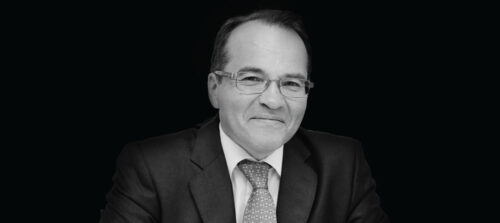 Success StoriesWebcor Group: Food For ThoughtFollowing a period of vast economic transition in its primary market, Angola, Dubai-based food distributor Webcor Group needed better visibility over its cash flow and liquidity. CFO Frederic Marret opted for a fresh treasury...Read the success story
Success StoriesWebcor Group: Food For ThoughtFollowing a period of vast economic transition in its primary market, Angola, Dubai-based food distributor Webcor Group needed better visibility over its cash flow and liquidity. CFO Frederic Marret opted for a fresh treasury...Read the success story -
 eBooks, Thought LeadershipSaaS and Cloud: Beware of the Wolf in Sheep’s ClothingWith the growth of SaaS solutions in treasury, it seems that everyone is clamoring to be “in the cloud,” but not all solutions are the same. This guide helps you clear up the vocabulary and...Read the eBook
eBooks, Thought LeadershipSaaS and Cloud: Beware of the Wolf in Sheep’s ClothingWith the growth of SaaS solutions in treasury, it seems that everyone is clamoring to be “in the cloud,” but not all solutions are the same. This guide helps you clear up the vocabulary and...Read the eBook -
 Success StoriesEmblemHealth Streamlines Treasury and Banking ProcessesWhy Kyriba? With Kyriba, EmblemHealth saves team members time with reduced manual intervention and automated reporting The ability for EmblemHealth to assist multiple internal teams with treasury information and reports can help all of...Read the success story
Success StoriesEmblemHealth Streamlines Treasury and Banking ProcessesWhy Kyriba? With Kyriba, EmblemHealth saves team members time with reduced manual intervention and automated reporting The ability for EmblemHealth to assist multiple internal teams with treasury information and reports can help all of...Read the success story -
 Success StoriesCash Management with Aldes: Innovation is in the Air!By anticipating increased consumer demand for indoor comfort as well as changing energy regulations, Aldes has based its strategy and growth on its capacity to offer global, innovative, high-performance solutions. The Kyriba Solution Lacking...Read the success story
Success StoriesCash Management with Aldes: Innovation is in the Air!By anticipating increased consumer demand for indoor comfort as well as changing energy regulations, Aldes has based its strategy and growth on its capacity to offer global, innovative, high-performance solutions. The Kyriba Solution Lacking...Read the success story -
 Success StoriesImplementing a BAM solution for the BBCThe Previous Situation Prior to the Bank Account Management (BAM) project, the BBC had two separate BAM databases, one for the BBC public service and one for commercial activities, reflecting the two separate treasury...Read the success story
Success StoriesImplementing a BAM solution for the BBCThe Previous Situation Prior to the Bank Account Management (BAM) project, the BBC had two separate BAM databases, one for the BBC public service and one for commercial activities, reflecting the two separate treasury...Read the success story -
 Success StoriesDassault Systèmes Success StoryBased on an interview with John Colleemallay, Senior Director, Group Treasury & Financing at Dassault Systèmes. A global enterprise takes advantage of Kyriba’s true SaaS technology to realise significant treasury management and performance benefits....Read the success story
Success StoriesDassault Systèmes Success StoryBased on an interview with John Colleemallay, Senior Director, Group Treasury & Financing at Dassault Systèmes. A global enterprise takes advantage of Kyriba’s true SaaS technology to realise significant treasury management and performance benefits....Read the success story -
 Success StoriesTaking Arianespace’s fraud management processes to new heightsThe Kyriba Solution By virtue of its size, Arianespace is considered a small to medium-sized enterprise, but in its operations, the company is similar to a major industrial group, with revenues of more than €1...Read the success story
Success StoriesTaking Arianespace’s fraud management processes to new heightsThe Kyriba Solution By virtue of its size, Arianespace is considered a small to medium-sized enterprise, but in its operations, the company is similar to a major industrial group, with revenues of more than €1...Read the success story -
 Success StoriesMohawk Achieves Cash Visibility"With Kyriba, we can maintain the system ourselves. With our previous system, changes to mapping rules and general ledger account numbers had to be programmed by an internal IT resource which took time, causing...Read the success story
Success StoriesMohawk Achieves Cash Visibility"With Kyriba, we can maintain the system ourselves. With our previous system, changes to mapping rules and general ledger account numbers had to be programmed by an internal IT resource which took time, causing...Read the success story -
 Success StoriesHow Kyriba’s SaaS Solution helped Europcar to centralize cash management activitiesWhy Kyriba? In 2010, Europcar began its search for a supplier with whom it could work to centralise its cash management activities and for a secure cash flow solution. “Before Kyriba, there was no...Read the success story
Success StoriesHow Kyriba’s SaaS Solution helped Europcar to centralize cash management activitiesWhy Kyriba? In 2010, Europcar began its search for a supplier with whom it could work to centralise its cash management activities and for a secure cash flow solution. “Before Kyriba, there was no...Read the success story -
 Success StoriesHow Kyriba enables Atkore to spend more time analyzing dataChallenges Atkore’s treasury team oversees 16 global brands, a mix of standalone and non-standalone brands, all of which roll up to the corporate treasury team. Atkore was entirely reliant on spreadsheets to run its treasury...Read the success story
Success StoriesHow Kyriba enables Atkore to spend more time analyzing dataChallenges Atkore’s treasury team oversees 16 global brands, a mix of standalone and non-standalone brands, all of which roll up to the corporate treasury team. Atkore was entirely reliant on spreadsheets to run its treasury...Read the success story -
 Success StoriesHow Kyriba Helps the Healthcare IndustryKey treasury issues in the healthcare industry Kyriba works with a large number of organizations across the healthcare industry, from hospital systems to managed health services providers. Whether these organizations are regional or nationwide in their focus, they...Read the success story
Success StoriesHow Kyriba Helps the Healthcare IndustryKey treasury issues in the healthcare industry Kyriba works with a large number of organizations across the healthcare industry, from hospital systems to managed health services providers. Whether these organizations are regional or nationwide in their focus, they...Read the success story -
 Success StoriesKyriba Helps PulteGroup Gain Increased Treasury FunctionalityPulte is the country’s largest home builder, with revenues of approximately $4 billion. While entirely domestic, it faces a very common obstacle of larger organizations: it has close to 100 bank accounts some of...Read the success story
Success StoriesKyriba Helps PulteGroup Gain Increased Treasury FunctionalityPulte is the country’s largest home builder, with revenues of approximately $4 billion. While entirely domestic, it faces a very common obstacle of larger organizations: it has close to 100 bank accounts some of...Read the success story -
 Success StoriesKyriba Helps DFC Global Improve Efficiency and Become More StrategicHow the corporate treasury team at DFC Global simultaneously improved efficiency and became a more strategic partner to other areas of the business. In many corporate finance departments, siloed data, systems, and processes hamper...Read the success story
Success StoriesKyriba Helps DFC Global Improve Efficiency and Become More StrategicHow the corporate treasury team at DFC Global simultaneously improved efficiency and became a more strategic partner to other areas of the business. In many corporate finance departments, siloed data, systems, and processes hamper...Read the success story -
 Success StoriesHow Kyriba Helps the Oil and Gas Industry"On top of the major time and productivity benefits, Kyriba gave us huge peace of mind. Knowing that our forecast was accurate enabled us to be much more strategic in the way we used...Read the success story
Success StoriesHow Kyriba Helps the Oil and Gas Industry"On top of the major time and productivity benefits, Kyriba gave us huge peace of mind. Knowing that our forecast was accurate enabled us to be much more strategic in the way we used...Read the success story -
 Success StoriesHow Kyriba Helped Cunningham Lindsey Increase Cash Visibility Tenfold"The investment in Kyriba’s SaaS platform had already generated a positive NPV by the end of the six-month implementation and an IRR exceeding 800 percent after the first year alone." — A Company Financial...Read the success story
Success StoriesHow Kyriba Helped Cunningham Lindsey Increase Cash Visibility Tenfold"The investment in Kyriba’s SaaS platform had already generated a positive NPV by the end of the six-month implementation and an IRR exceeding 800 percent after the first year alone." — A Company Financial...Read the success story -
 Success StoriesKyriba Helps Qualcomm Increase Global Cash Visibility"The Kyriba personnel that we have been in contact with have been experts in their field. Not only do they know the product very well, but I have found that their Treasury expertise has...Read the success story
Success StoriesKyriba Helps Qualcomm Increase Global Cash Visibility"The Kyriba personnel that we have been in contact with have been experts in their field. Not only do they know the product very well, but I have found that their Treasury expertise has...Read the success story -
 Success StoriesHow Kyriba Helped Partners HealthCare"Not only do we see positive, measurable benefits from the Kyriba solution, but we think it also highlights our objective for our treasury group to be pro-active, best-in-class – always stretching to deliver high...Read the success story
Success StoriesHow Kyriba Helped Partners HealthCare"Not only do we see positive, measurable benefits from the Kyriba solution, but we think it also highlights our objective for our treasury group to be pro-active, best-in-class – always stretching to deliver high...Read the success story -
 Success StoriesHow Kyriba Helped Horizon BCBSNJ"Kyriba has improved the efficiency of our cash operations and provided the tool to help us forecast cash more accurately and effectively. We have been very happy with Kyriba’s implementation and support teams and...Read the success story
Success StoriesHow Kyriba Helped Horizon BCBSNJ"Kyriba has improved the efficiency of our cash operations and provided the tool to help us forecast cash more accurately and effectively. We have been very happy with Kyriba’s implementation and support teams and...Read the success story
